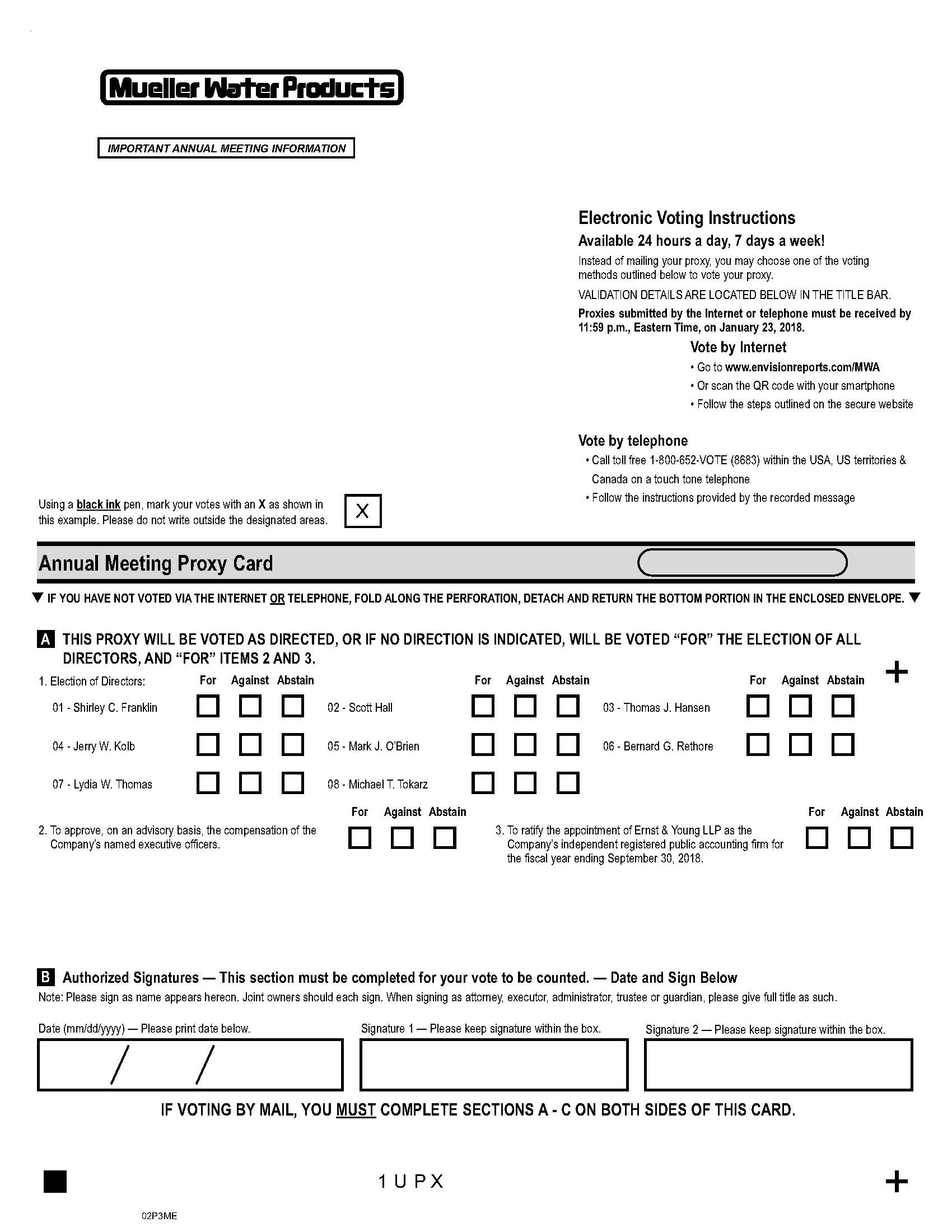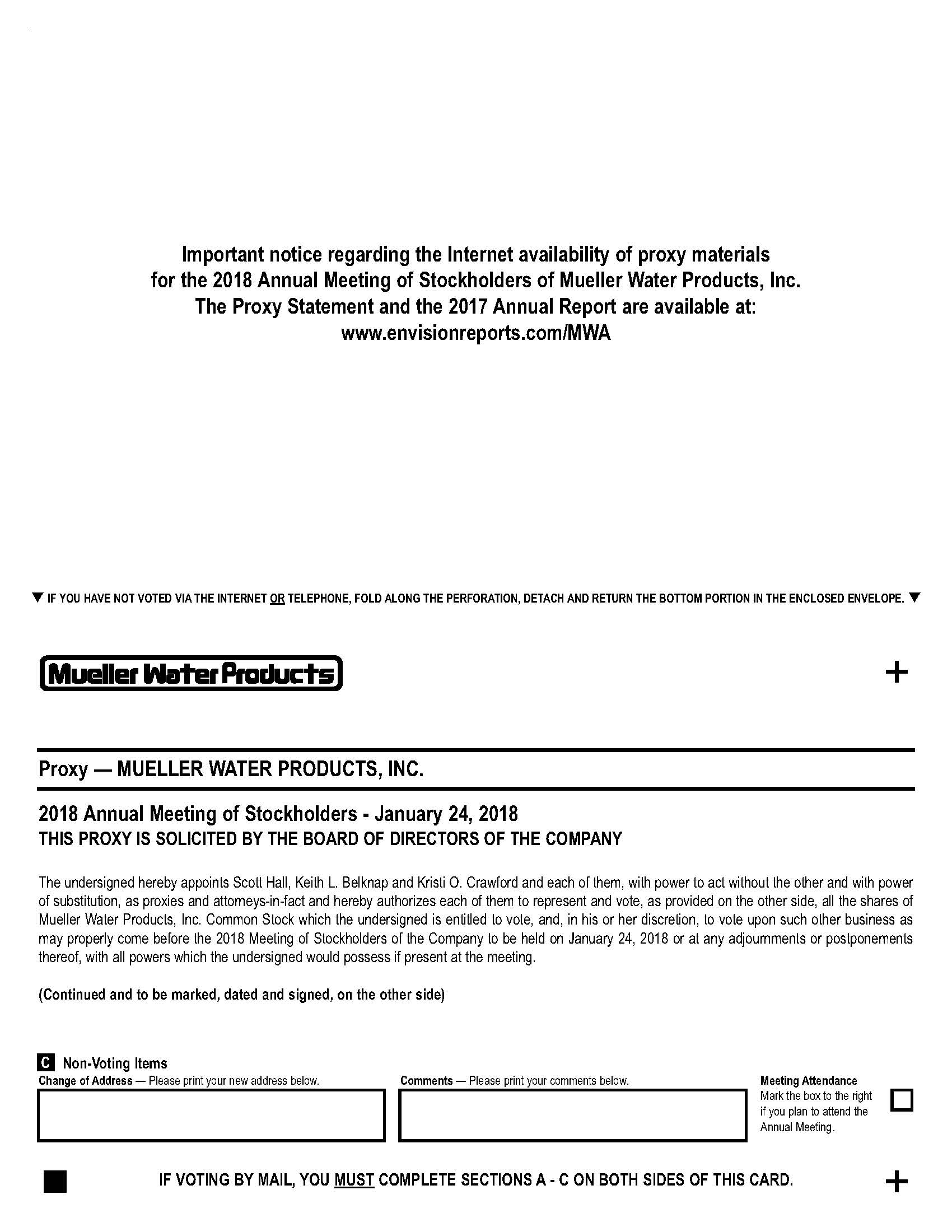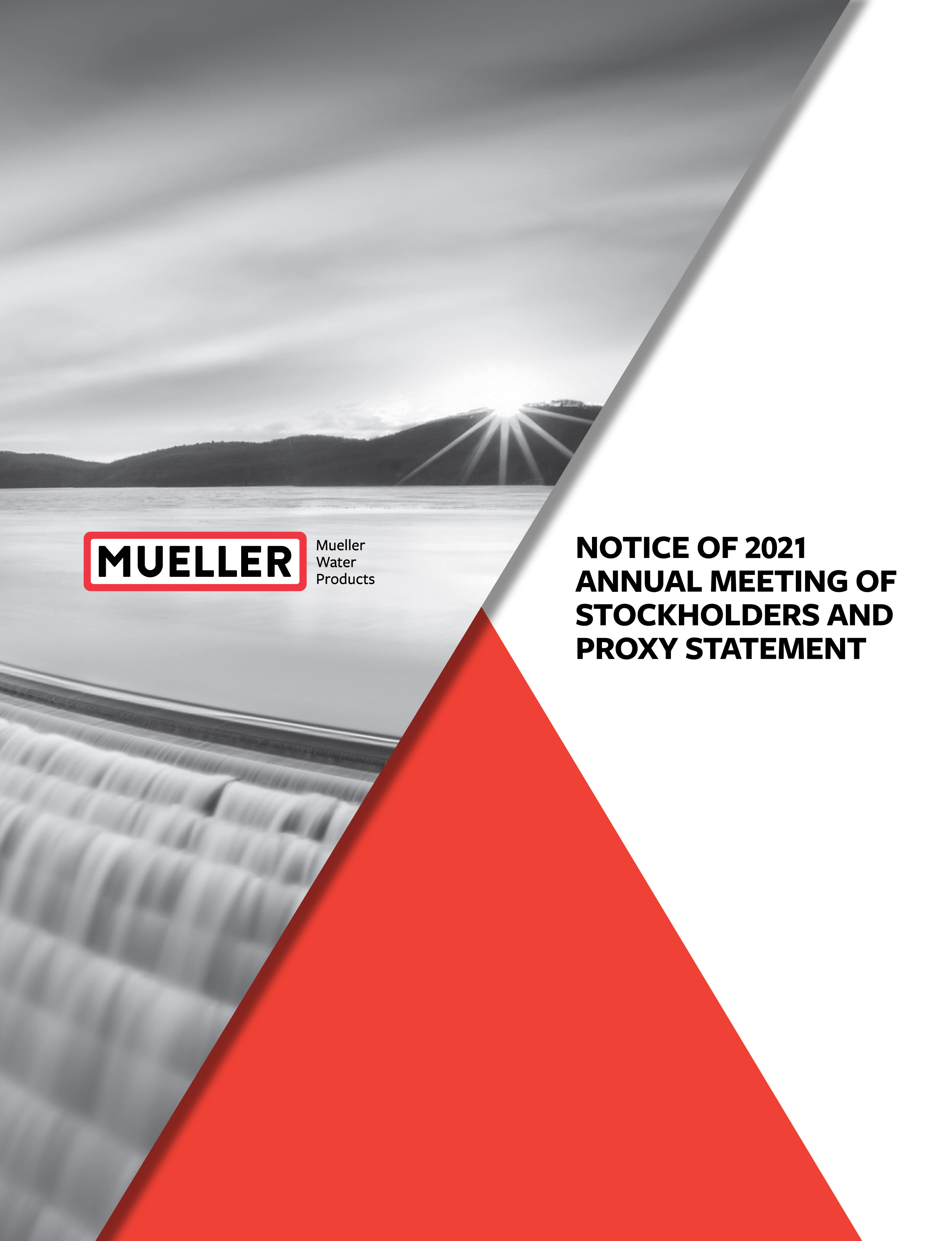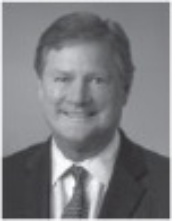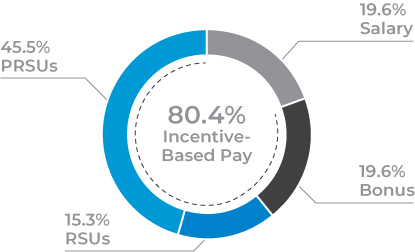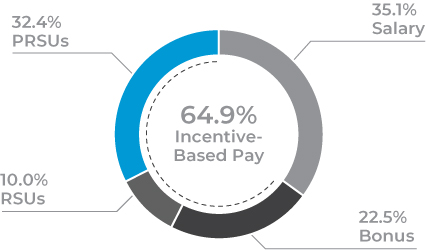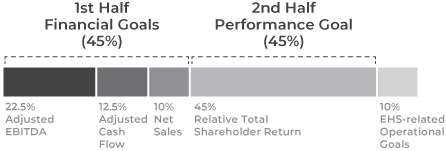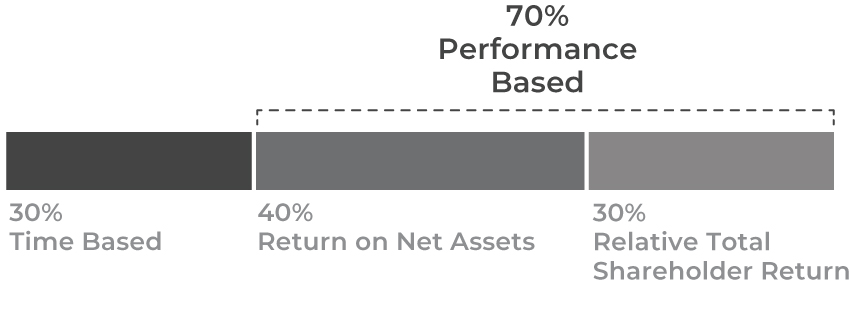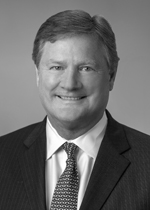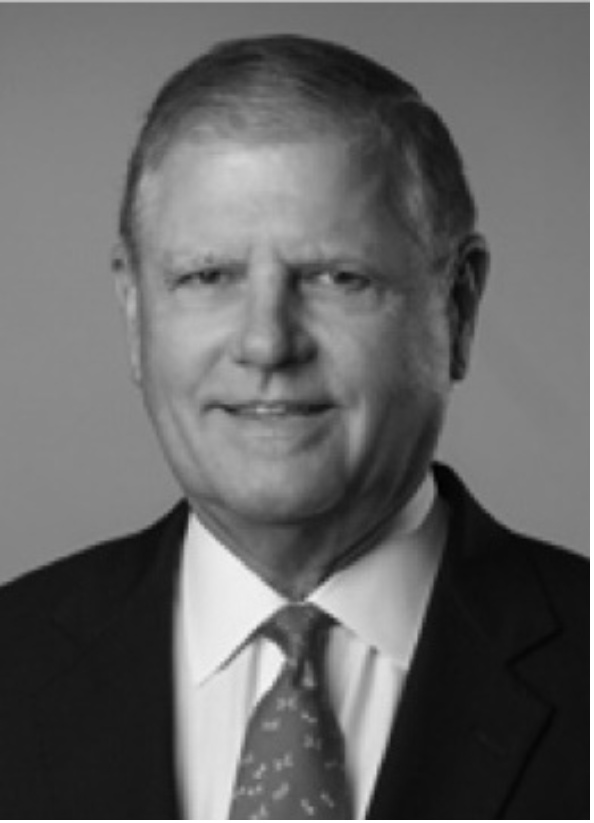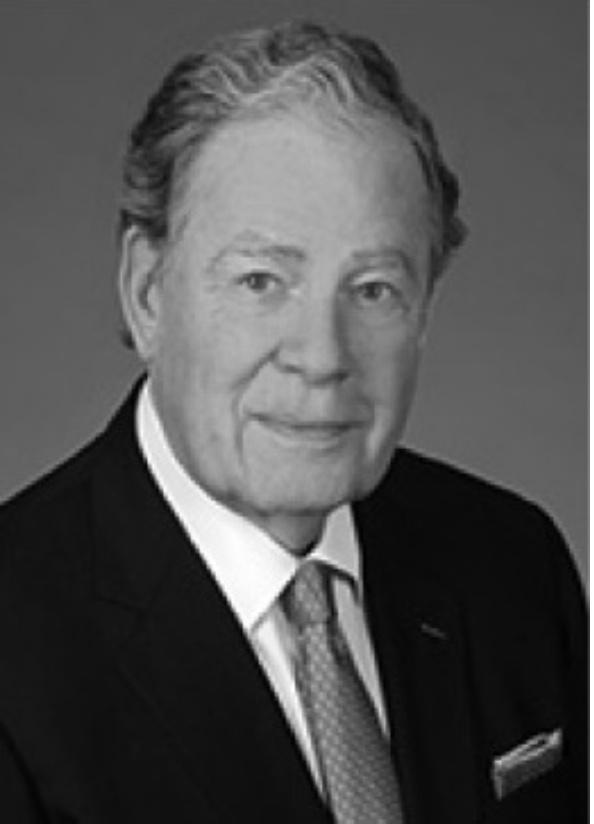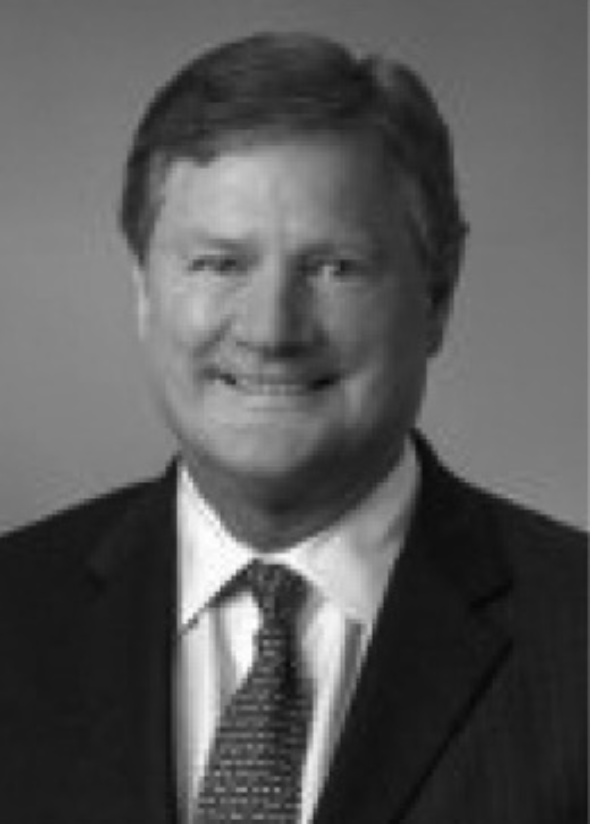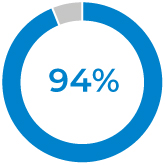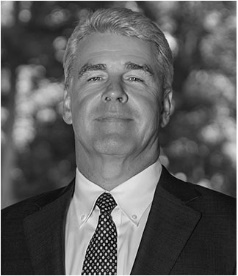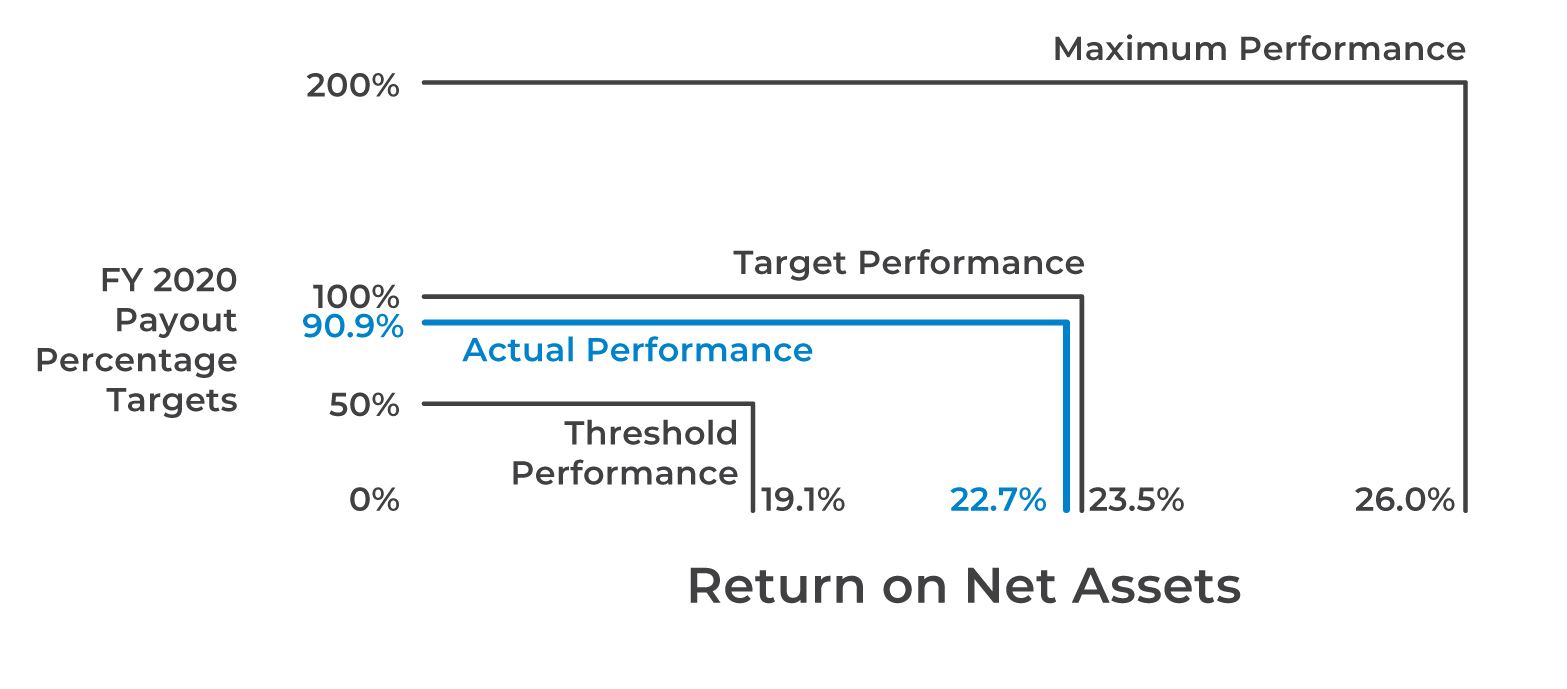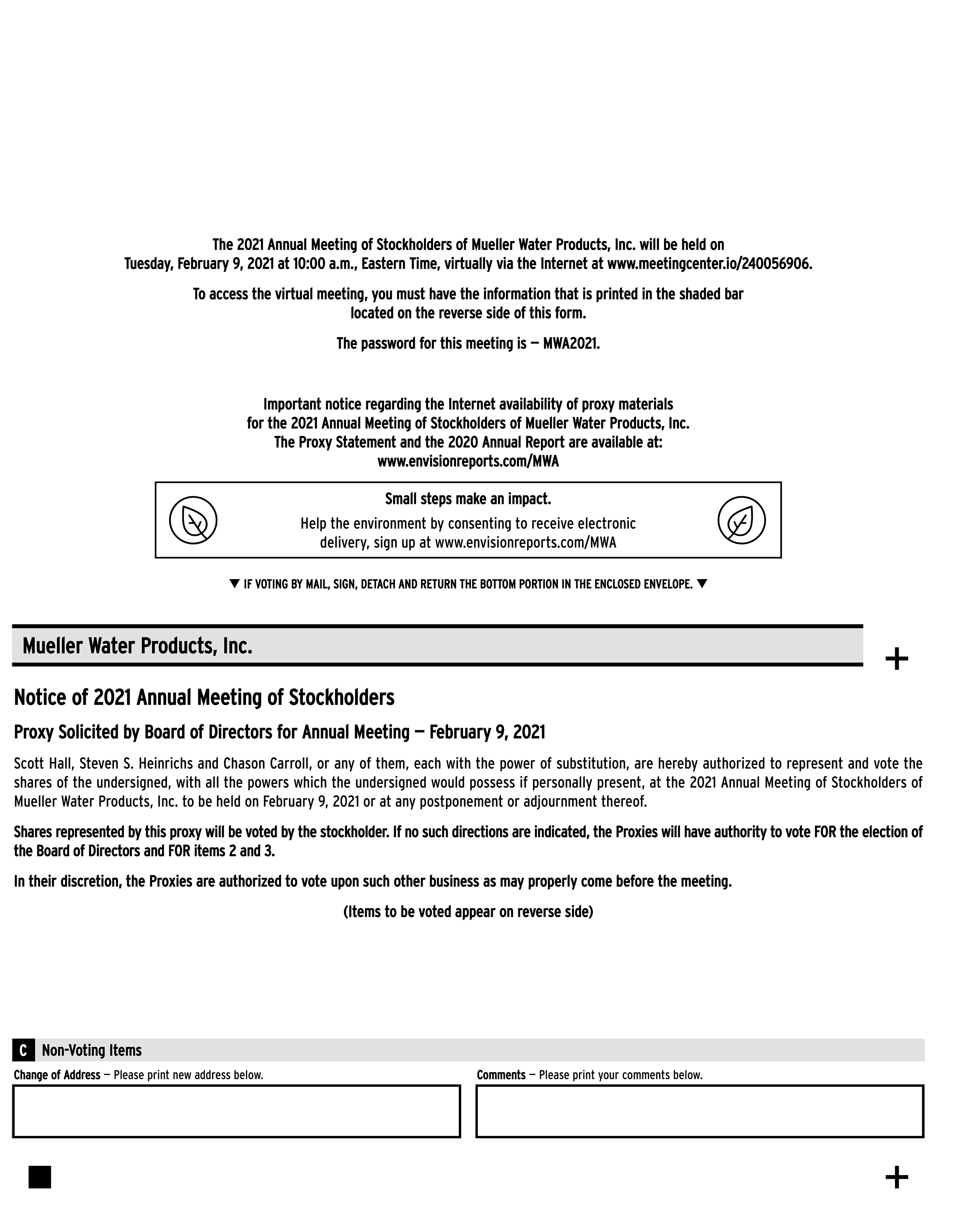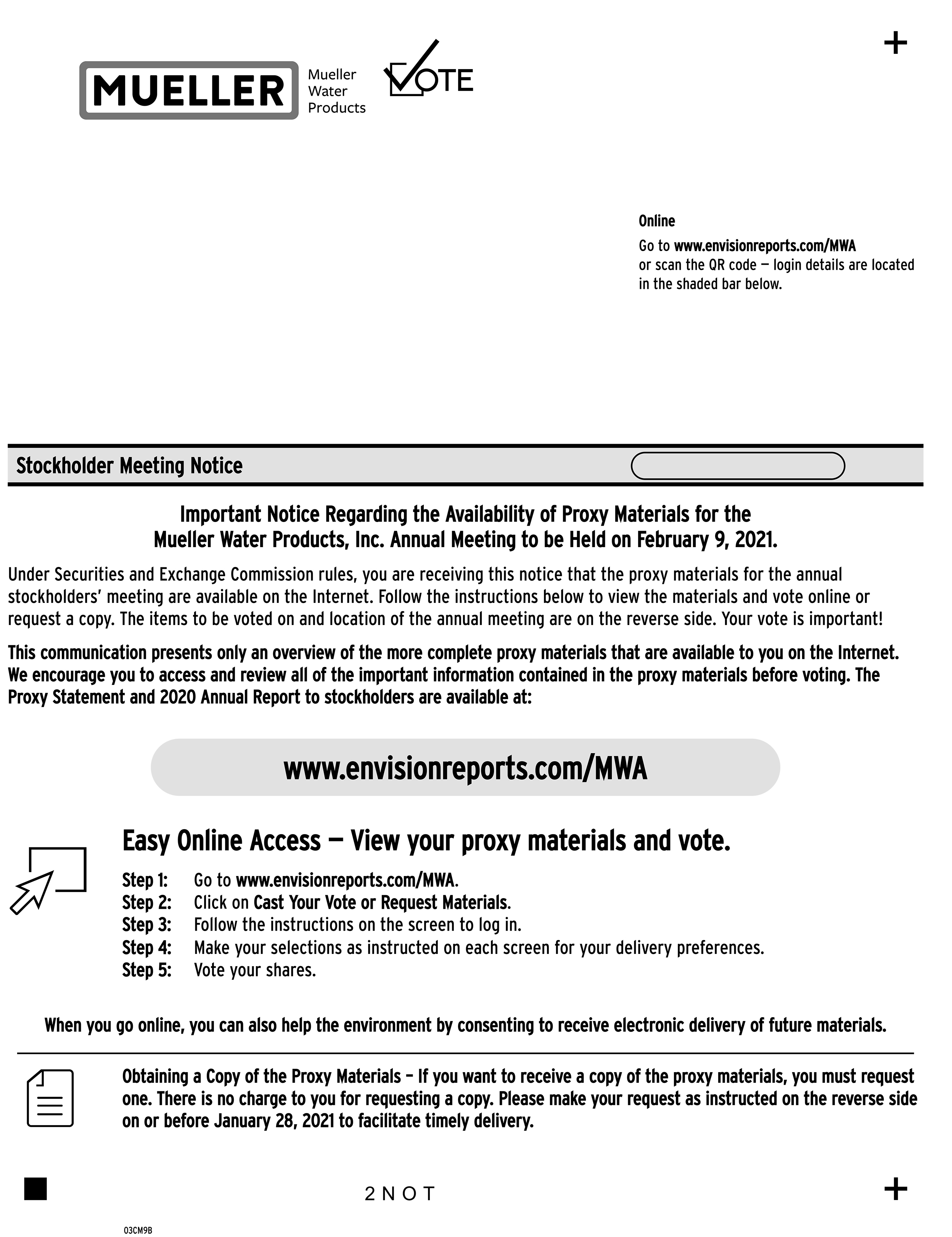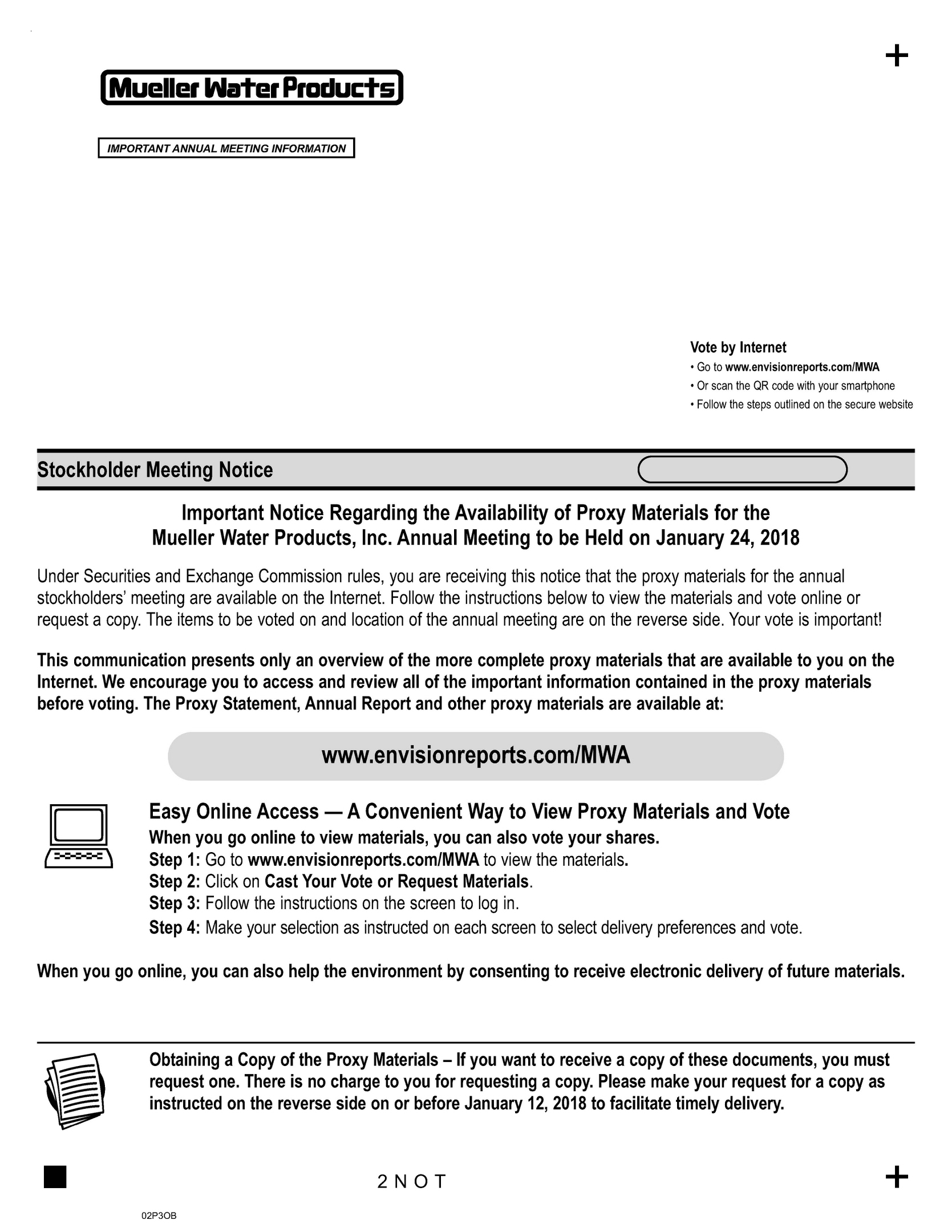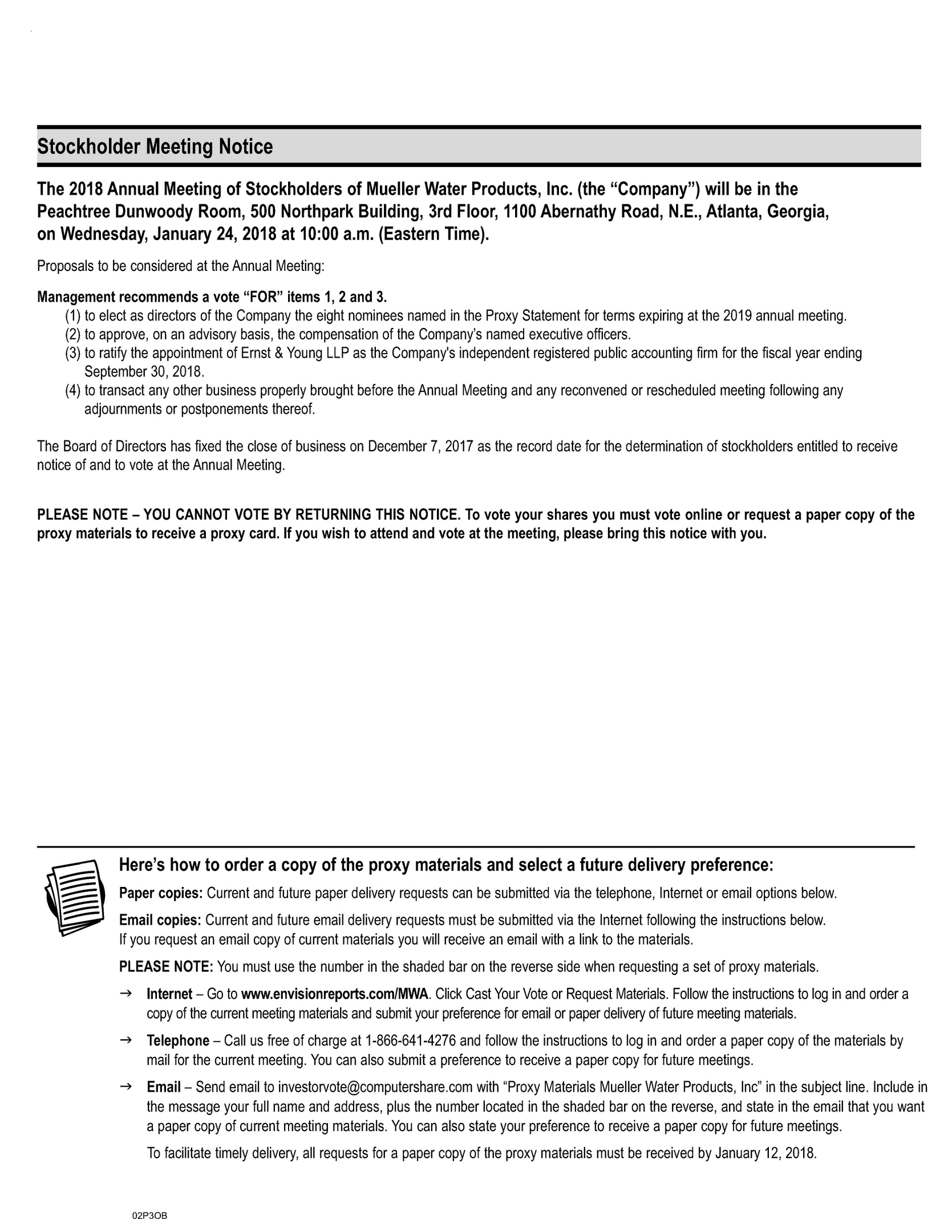PROXY STATEMENT FOR each nominee for director.2021 ANNUAL MEETING 19
PROPOSAL TWO:Director Nomination Process
ADVISORY VOTE TO APPROVE EXECUTIVE COMPENSATION | | | | | | | | | | | |
In discharging its responsibility related to director nominations, the Governance Committee receives input from other directors and, if applicable, an independent professional search firm. It also considers and evaluates candidates recommended by stockholders, as described below. The Governance Committee utilizes the same process and criteria to evaluate all candidates. The Governance Committee’s comprehensive evaluation includes multiple stages. The Chair of the Governance Committee interviews each qualified candidate and selects candidates to be interviewed by other members of the Governance Committee. The Governance Committee's evaluation includes a reference and background check, as well as interviews and discussions about the candidate’s qualifications, availability and commitment. The Governance Committee reviews the results of all interviews and makes a recommendation to the full Board with respect to nominating a candidate for election to the Board. The Board expects all candidates recommended to the full Board to have received the approval of all members of the Governance Committee. In evaluating candidates, the Governance Committee considers a variety of qualifications, experience, attributes and skills and recognizes that a diversity of knowledge, viewpoints and experience can enhance the Board’s effectiveness. Accordingly, as part of its evaluation, the Governance Committee considers how the candidate’s background, qualifications, experience, attributes and skills may enhance the quality of the Board’s deliberations and decisions. | Nomination Process At-a-Glance |
| 1 | Establish Candidate Pool | |
| 2 | Conduct Interview by Chair | |
| 3 | Perform Reference / Background Check and Governance Committee Interviews | |
| 4 | Review Results and Recommend | |
| | |
20 MUELLER WATER PRODUCTS, INC.
Set forth below is a summary of the key skills and experience necessary for the Board as a whole. See “Proposal One - Election of Ten Directors — The Board of Directors” for information concerning each nominee’s relevant skills and experience.
| | | | | |
| Skill/Experience | Relevance to Mueller Water Products |
| Executive Leadership/CEO experience. Experience serving in top management positions is important since these directors bring perspective in analyzing, shaping and overseeing strategy and the execution of important operational and policy issues at a senior level. |
| Corporate Governance expertise. Directors who have corporate governance experience can assist the Board in fulfilling its responsibilities related to the oversight of our legal, environmental and regulatory compliance. |
| Financial/Capital Allocation expertise. Knowledge of financial markets, financing and funding operations, accounting and financial reporting processes is important since it assists our directors in understanding, advising and overseeing our capital structure, financing and investing activities, financial reporting and internal control of these activities. |
| Government and Regulatory Affairs expertise. Directors who have served in government positions or who have worked extensively with governments, environmental or regulatory bodies can provide oversight of compliance with rules and regulations and insight into working constructively with government, environmental and regulatory bodies. |
| International Business experience. Since we manufacture and sell certain of our products outside the United States, directors with global expertise can provide a useful business and cultural perspective regarding significant aspects of our businesses. |
| Mergers and Acquisitions experience. Since we have a strategy of selectively pursuing potential acquisitions, directors who have a background in M&A transactions can provide useful insight into developing and implementing strategies for growing our businesses through combination with other organizations. |
| Multiple-part Manufacturing and Operations experience. Experience in manufacturing is useful in understanding our research and development efforts, product engineering, design and manufacturing, operations, products and the market segments in which we compete. |
| Strategic Planning expertise. We operate in competitive markets and our businesses are subject to a wide variety of risks. Directors who have strategic planning experience can assist the Board in adopting policies and procedures responsive to the risks we face. |
| Enterprise Risk Management experience. In light of the potential financial and reputational damage that can occur when companies fail to oversee compliance and properly manage risk, it is increasingly important to include directors with extensive enterprise risk management experience . |
| Human Capital Management experience. Because we recognize that an engaged and diverse workforce is the foundation of our success, it is important that our directors have experience with organizational management and talent development, including employee compensation and benefits, engagement and training, and diversity and inclusion. |
| Environment, Health and Safety expertise. We are committed to responsible environmental stewardship and rigorous health and safety oversight. We believe directors with EHS experience can help drive strong environment, health and safety performance not only at the most strategic level but also throughout the organization. |
| Technology/Systems experience. Directors with backgrounds in engineering disciplines, computer science, software development and cyber security are increasingly important in light of our strategic focus on manufacturing and product technologies. |
| Materials Science and Engineering experience. Directors with a background in these areas are important to our understanding of how metals, nanomaterials and other substances meet the electrical, chemical or mechanical requirements of our products. |
| Branding expertise. Directors who have worked to define and maintain perceptions of the nature and focus of an enterprise, specifically during transformative change, can be an invaluable asset. |
Director Candidate Recommendations
A stockholder who wishes to submit a director candidate for consideration by the Governance Committee must do so by writing our Corporate Secretary and including the candidate’s biographical data. See “Questions About Voting and the Annual Meeting.”
PROXY STATEMENT FOR 2021 ANNUAL MEETING 21
Board Tenure Policy
The Board believes that an appropriate mix of tenured directors and newer directors with fresh perspectives is necessary to ensure a vital and effective Board. Since January 2017, the Board has appointed three new directors, advancing both the skill set and experience profile of the Board while simultaneously increasing its diversity. Complementing this strategy of refreshment and enhancement is a commitment to making the most of our longer-tenured directors’ experience and intricate knowledge of the Company’s operations. While the Board believes that age and tenure are important considerations in assessing Board composition, it also believes the best interests of the Company are served by being able to take advantage of all available talent and that a significant degree of continuity year-over-year is beneficial to stockholders. For this reason, the Board does not have absolute limits regarding age of directors or the length of time that a director may serve but considers these aspects among several factors in re-nomination decisions.
The Board’s Role and Responsibilities
Overview
Our Board is responsible for overseeing the business affairs of the Company, including regularly monitoring the effectiveness of management’s implementation of strategy, policy, risk mitigation tactics and other decisions. As the Company continues to grow and transform, the Board not only guides management, but also assists in reacting to changing environments. The Board receives regular updates and engages actively with the management team regarding key strategic initiatives, technology trends, competitive and economic changes and other important developments and is also involved in strategic planning and review each year. Combined with management’s execution of our business strategy, the Board’s oversight promotes the creation of long-term stockholder value, with a focus on assessing both the potential opportunities available to us and the risks that we might encounter.
Board Oversight
RISK
While the Board maintains oversight responsibility for how we manage risk, it charges management with assessing and mitigating that risk through the development, implementation and maintenance of the Company's risk management processes and cyber security program. As a result, our internal control environment has been specifically designed to identify and manage risks and to facilitate communication with the Board. Our internal audit department, which reports to the Audit Committee, administers our enterprise risk assessment and, in coordination with our legal and compliance functions, is responsible for ongoing enterprise risk management processes. It also regularly reports to the Board and its committees on risk-related issues as a complement to our strategic planning process. Additionally, the Audit Committee consults with management regarding cyber security initiatives and requests that management report to the Audit Committee and/or the full Board regularly on its assessment not only of cyber security, but also of the operational, financial and accounting, competitive, reputational and legal risks to the Company. The Board also considers specific risk topics and receives regular reports from the heads of our principal businesses and corporate functions that include discussion of the risks and exposures inherent in their respective areas of responsibility.
The Board executes its risk oversight function both as a whole and through delegation to its committees, specifically:
| | | | | |
Audit Committee •Oversees risk management related to accounting and financial reporting, the audit process, internal control over financial reporting and disclosure controls and procedures •Oversees the internal audit function •Monitors legal and compliance issues and active matters •Reviews cyber and data security matters, including our risk mitigation initiatives | Compensation and Human Resources Committee •Oversees risk management related to the risks and rewards associated with our compensation policies and practices •Oversees management development and succession planning across senior positions |
Environment, Health and Safety Committee •Oversees risk management related to risks directly related to the environment, health and safety areas | Nominating and Corporate Governance Committee •Oversees risk management related to governance structure and processes and risks arising from related person transactions |
22 MUELLER WATER PRODUCTS, INC.
ENVIRONMENTAL, SOCIAL AND GOVERNANCE (“ESG”)
We provideembrace our ESG responsibilities and strive to effectively address the issues that matter most to our stockholders, withemployees, customers, suppliers, investors and the annual opportunitycommunities we serve. We are dedicated to cast an advisory vote on the compensationtransparency and measurement of our named executive officers. ESG performance as we execute our business strategy and expand our manufacturing reputation and expertise. We believe that a comprehensive ESG approach is more than a matter of process. Our ESG approach has been developed from a foundation of best practices and a desire for environmental, social and governance leadership, integrity and accountability.
Due to the significance of our ESG approach, the Board as a whole maintains oversight of the Company’s ESG program, including strategy, initiatives, metrics, and policies. To facilitate its oversight, the Board has delegated certain responsibilities to several of its committees as follows:
•The vote on this proposal represents an additional means by which we obtain feedback from our stockholders about executive compensation. OurAudit Committee oversees the appropriateness and reasonableness of the Company's applicable ESG standards, measurement mechanisms and key performance indicators.
•The Compensation and Human Resources Committee (the “Compensation Committee”) sets executive compensation.oversees matters related to human capital management, including matters relating to employee compensation, benefits, engagement, training, diversity, inclusion and other social matters.
•The overall objective of our executive compensation program isEnvironment, Health and Safety Committee oversees the matters related to encouragethe environmental, materials sustainability and rewardemployee health and safety programs.
•The Nominating and Corporate Governance Committee reviews and makes recommendations to the creation of sustainable, long-term stockholder value. To meet this objective,Board regarding the Compensation Committee has designed compensation plans for our executive officers that target total compensation at the 50th percentile (plus or minus 15%) of our customized peer group. A significant portion of our executives’ overall compensation is structured as incentive compensation. For fiscal 2017, incentive compensation represented approximately 74% of our current CEO’s total target compensation,Company’s ESG practices, reviews relevant ESG metrics developed by other Board committees and an average of 65%oversees management’s production of the total target compensation ofCompany’s ESG report.
In December 2020, the other named executive officers. We believe an emphasis on both short-termCompany published its inaugural ESG Report, which includes the principal sustainability metrics the Company plans to track: water/energy consumption, greenhouse gas emissions and long-term incentive compensation aligns executives’ and stockholders’ interests.
We encourage our stockholders to read the Compensation Discussion and Analysis sectionsolid waste creation. The ESG Report may be found at https://www.muellerwaterproducts.com/sustainability-program-vision-and-values. The ESG Report is not a part of this Proxy Statement, whichStatement.
Management Succession Planning
Management conducts annual talent reviews. During these reviews, the executive leadership team discusses how our compensation policiessuccession plans for key positions and procedures implement our compensation philosophy.identifies top talent for development needed in future leadership roles. The Board maintains a succession and the Compensation Committee believe these policies and procedures are strongly aligned with the long-term interests of our stockholders and are effective in implementing our compensation philosophy and in achieving our strategic goals.
Accordingly, we ask for stockholder approval of the following resolution:
RESOLVED, that the stockholders approve, on an advisory basis, the compensation paid to the named executive officers of Mueller Water Products, Inc., as disclosed in the Compensation Discussion and Analysis, the accompanying compensation tables and the related narrative disclosure in the Company’s proxy statementcontingency plan for the 2018 annual meeting of stockholders.
This vote is advisory and therefore not binding on us, the Board or the Compensation Committee. At last year’s annual meeting of stockholders, over 98% of votes cast were in support of the compensation of our named executive officers. The Board and the Compensation Committee value the opinions of our stockholders. The Compensation Committee will consider the result of this year’s vote,CEO position as well as other communications from stockholders relating to our compensation practices, and take them into account in future determinations concerning our executive compensation program. See “Compensation Discussion and Analysis — Highlights of 2017 Executive Compensation”.key officer positions.
The Board recommends a vote FOR Proposal Two.
PROPOSAL THREE:
RATIFICATION OF THE APPOINTMENT OF THE
INDEPENDENT REGISTERED PUBLIC ACCOUNTING FIRM
The Audit Committee has authority to retain and terminate the services of our independent registered public accounting firm. The Audit Committee has appointed Ernst & Young LLP as the independent registered public accounting firm to audit our consolidated financial statements and internal control over financial reporting for the fiscal year ending September 30, 2018, subject to negotiation of definitive fee arrangements. Although stockholder ratification of Ernst & Young’s appointment is not required, the Board believes submitting the appointment to our stockholders for ratification is a matter of good corporate governance. See below for a description of the fees Ernst & Young billed us for fiscal 2017 and fiscal 2016.
A representative of Ernst & Young is expected to be present at the Annual Meeting. The representative will have an opportunity to make a statement and will be available to respond to stockholder questions.
The Board recommends a vote FOR Proposal Three.
FEES AND SERVICES OF THE INDEPENDENT REGISTERED
PUBLIC ACCOUNTING FIRM
The Audit Committee appointed Ernst & Young as the independent registered public accounting firm to audit our consolidated financial statements and internal control over financial reporting for fiscal 2017.
Audit Fees and Other Fees
The following table shows the approximate fees for audit and other services provided by Ernst & Young for fiscal years 2017 and 2016 (in millions).
|
| | | | | | | |
| | 2017 | | 2016 |
Audit fees(1) | $ | 2.4 |
| | $ | 2.5 |
|
| Audit-related fees | — |
| | 0.1 |
|
| Tax fees | 0.4 |
| | 0.1 |
|
| Total fees | $ | 2.8 |
| | $ | 2.7 |
|
| |
(1) | Reflects fees for professional services performed by Ernst & Young for annual audits (including out-of-pocket expenses) and quarterly limited reviews of our consolidated financial statements. |
Pre-Approval of Services Performed by the Independent Registered Public Accounting Firm
The Audit Committee has adopted procedures for pre-approving all audit and non-audit services provided by the independent registered public accounting firm. For both types of pre-approval, the Audit Committee considers whether the services are consistent with the Securities and Exchange Commission (“SEC”) rules on auditor independence and whether the independent registered public accounting firm is able to provide the most effective service. Non-audit fees to be incurred by the independent registered public accounting firm for services permitted by the Sarbanes-Oxley Act of 2002 to be performed by such firm must be approved in advance by the Audit Committee Chairman (for individual projects in amounts up to $100,000) or the Audit Committee. The Audit Committee periodically monitors the services rendered and actual fees paid to the independent registered public accounting firm to ensure the services are within the parameters approved by the Audit Committee.
REPORT OF THE AUDIT COMMITTEE
Committee Composition and Skills
The Audit Committee is comprised of three independent directors meeting the requirements of applicable SEC and NYSE rules. The Board has determined all Audit Committee members are “financially literate” for purposes of the NYSE Listed Company Manual (the “NYSE Manual”) and qualify as audit committee “financial experts” within the meaning of the rules and regulations of the SEC. See “Matters to be Voted On— Proposal One” for a description of the business background of each member. No member of the Audit Committee serves on the audit committee of more than three public companies.
Meetings
The Audit Committee met 13 times during fiscal 2017, including eight times by teleconference. Meetings include periodic executive sessions with the independent registered public accounting firm, our internal auditors and our management.
Responsibilities of the Audit Committee, Management and the Independent Auditor
The Audit Committee’s key responsibilities are set forth in its charter, which was approved by the Board and is available on our website. See “Corporate Governance— Board Operations— Board Committee Information” for more information concerning the Audit Committee and its responsibilities. For the audit of our consolidated financial statements for fiscal 2017 and our internal control over financial reporting:
Management was primarily responsible for preparing our financial statements and establishing and maintaining effective internal control over financial reporting. The Audit Committee was responsible for monitoring and overseeing our financial reporting and audit functions, as well as our internal control over financial reporting and disclosure.
Ernst & Young, our independent registered public accounting firm for fiscal 2017, was responsible for performing an independent audit of our consolidated financial statements and expressing an opinion on the conformity of those financial statements with accounting principles generally accepted in the United States and was also responsible for performing an independent audit of, and expressing an opinion on, our internal control over financial reporting.
The Audit Committee reviewed and discussed with management and Ernst & Young the audited consolidated financial statements for the year ended September 30, 2017, our quarterly consolidated financial statements and operating results for each quarter in the fiscal year and the related significant accounting and disclosure issues, and the effectiveness of our internal control over financial reporting.
The Audit Committee reviewed management’s report contained in our annual report on Form 10-K for the year ended September 30, 2017 (“Annual Report”), as well as Ernst & Young’s Reports of Independent Registered Public Accounting Firm included in the Annual Report related to its audits of the consolidated financial statements and internal control over financial reporting.
The Audit Committee discussed with Ernst & Young matters required to be discussed by Statement on Auditing Standards No. 16, as amended, “Communication with Audit Committees.” In addition, Ernst & Young provided the Audit Committee with the written disclosures and the letter required by the applicable requirements of the Public Company Accounting Oversight Board regarding the independent accountant’s communications with the Audit Committee concerning independence and the Audit Committee has discussed with Ernst & Young the firm’s independence.
Audited Consolidated Financial Statements
Based on the foregoing discussions with and reports of management and our independent registered public accounting firm and the Audit Committee’s review of the representations of management, the Audit Committee recommended to the Board the inclusion of our consolidated financial statements in the Annual Report.
|
|
Audit Committee |
Jerry W. Kolb, Chair |
Thomas J. Hansen |
Bernard G. Rethore |
CORPORATE GOVERNANCE
Overview
Our Board is committed to establishing and maintaining strong corporate governance practices that reflect high standards of ethics and integrity and promote long-term stockholder value.
To that end, we recently amended our Bylaws regarding director elections and, beginning with this year’s Annual Meeting, we are requiring our directors to be elected by the affirmative vote of a majority of the votes cast at the Annual Meeting. In connection with this change, we have also amended our Corporate Governance Guidelines (the “Guidelines”) to provide that an incumbent director who fails to receive a majority of the votes cast must tender an irrevocable offer of resignation to the Board. The Board will then consider a number of factors in determining whether to accept or reject the resignation, including the director’s contributions to the CompanyPolicies and the reasons he or she did not obtain the requisite stockholder vote.Materials
Our corporate governance structure and processes are set forth in our key governance documents, including the Guidelines. The Guidelines govern the operation of the Board and its committees and guide the Board and its committees in the execution of their respective responsibilities. The Governance Committee reviews the Guidelines at least annually and the Board updates the Guidelines periodically in response to changing regulatory requirements, evolving practices and otherwise as circumstances warrant.
In July 2016, a group of leading executives and institutional investors published a statement of “Commonsense Principles of Corporate Governance.” These Commonsense Principles set forth a number of recommendations and guidelines about the roles and responsibilities of boards, public companies and stockholders, and are intended to provide guidance on corporate governance that “works in the real world.”
Because we believe an important aspect of achieving a strong and effective corporate governance structure is to encourage an open dialog with our stockholders, we have reviewed our policies and procedures in light of the suggestions set forth in the Commonsense Principles. Accordingly, highlighted below are the key areas of our corporate governance practices that we believe align with the Commonsense Principles.
|
| | |
Board Composition and Leadership: | | Our Board is led by a Chairman who is not our CEO |
| | Each of our director nominees, other than our CEO, is independent |
| | Our directors have complementary and diverse skills sets, backgrounds and experiences and are continually educated on our industry |
| | Our Board size promotes an open dialogue among directors |
| | |
Majority Voting | | We use a majority voting standard in uncontested director elections, and require incumbent directors who fail to receive a majority of the votes cast to tender their resignation |
| | |
Board Committee Structure: | | We have a well-developed committee structure with clearly understood responsibilities |
| | |
Director Effectiveness: | | Our Board and committees conduct regular self-assessments, led by our Governance Committee, to assess effectiveness and areas for improvement |
| | |
Director Responsibilities: | | Each of our directors has input into the setting of the Board agenda |
| | Each of our directors has unfettered access to management, and committees have the authority to retain independent advisors |
| | Our Board frequently meets in executive session without the CEO or other members of management |
| | Our Board focuses on significant risks and seeks the proper calibration of risk and reward while focusing on the longer-term interests of our stockholders |
| | |
Director Compensation: | | We pay a substantial portion of non-employee director compensation in equity awards |
Our Code of Business Conduct and Ethics (the “Ethics Code”“Code of Conduct”) applies to all of our employees and directors. We also make available an ethics hotlinehelpline that employees and others may use to anonymously report suspected violations of the Ethics Code.Code of Conduct. We will disclose promptly any amendments to, or waivers from, provisions of the Ethics Code of Conduct on our website at www.muellerwaterproducts.com,, as may be required under applicable rules.
The tableListed below listsare some of the Board policies and other materials relating to our corporate governance that are available on our website. We will also provide copies of any of these policies and materials without charge upon written request to our Corporate Secretary at Mueller Water Products, Inc., 1200 Abernathy Road, N.E., Suite 1200, Atlanta, Georgia 30328. The information on our website is not a part of this Proxy Statement. |
| |
Corporate Governance Policies and Materials |
| |
• Corporate Governance Guidelines
• Code of Business Conduct and Ethics
• Board Committee Charters
| • Certificate of Incorporation
• Bylaws
• Stock Ownership Guidelines
|
Board Composition
Board Size
The Board is currently composed of nine directors and, following Mr. Hyland’s retirement as discussed above, will be composed of eight directors. Each director is independent, except Mr. Hyland, our Executive Chairman, and Mr. Hall, our President and CEO. The Board held 10 meetings in fiscal 2017 and each director attended over 96% of the total number of meetings of the Board and committees of which he or she was a member.
Director Independence
The Governance Committee and the Board annually assess the outside affiliations of each director to determine if these affiliations could cause a potential conflict of interest or interfere with the director’s independence. The Guidelines set forth the categorical standards of independence for the Board. To be considered “independent” for purposes of the director qualification standards:
The director must meet bright-line independence standards under the NYSE Manual; and
The Board must affirmatively determine the director otherwise has no material relationship with us directly or as an officer, stockholder or partner of an organization that has a relationship with us. See the Guidelines on our website for more detail.
Each of our directors, other than our Executive Chairman and our CEO, is independent pursuant to our director qualification standards and each member of the Audit Committee, the Compensation Committee and the Governance Committee is independent in accordance with the NYSE Manual and our director independence standards.
No member of those committees receives compensation from us other than directors’ fees and no member is an affiliated person of ours (other than by virtue of his or her directorship).
All members of the Audit Committee meet the additional standards for audit committee members of publicly traded companies required by the Sarbanes-Oxley Act of 2002.
All members of the Compensation Committee qualify as “non-employee directors” as defined in Rule 16b-3 under the Exchange Act and meet the independence requirements of the NYSE Manual and additional standards applicable to “outside directors” under Section 162(m) of the Code.
Director Nomination Process
In discharging its responsibility related to director nominations, the Governance Committee receives input from other directors and, if applicable, an independent professional search firm. It also considers and evaluates candidates recommended by stockholders, as described below. The Governance Committee utilizes the same criteria to evaluate all candidates, regardless of who recommends the candidate.
The Governance Committee’s evaluation includes a reference check, interaction, interviews and discussions about the candidate’s qualifications, availability and commitment. The Chair of the Governance Committee interviews each qualified candidate and selects candidates to be interviewed by other members of the Governance Committee. The Governance Committee reviews the results of all interviews and makes a recommendation to the full Board with respect to nominating a candidate for election to the Board. The Board expects all candidates recommended to the full Board to have received the approval of all members of the Governance Committee.
In evaluating candidates, the Governance Committee considers a variety of qualifications, experience, attributes and skills, and recognizes that a diversity of knowledge, viewpoints and experience can enhance the Board’s effectiveness. Accordingly, as part of its candidate evaluation, the Governance Committee considers how the candidate’s background, qualifications, experience, attributes and skills may enhance the quality of the Board’s deliberations and decisions.
Set forth below is a summary of the key skills and experience that is necessary for the Board as a whole. See “Matters to be Voted On — Proposal One” for information concerning each nominee’s relevant skills and experience.
|
| | | | |
| | |
•Corporate Governance Guidelines | CEO/Executive Leadership experience.• Experience serving in top management positions is important since these directors bring perspective in analyzing, shaping and overseeing the execution of important operational and policy issues at a senior level.Board Committee Charters
| | • | Corporate governance expertise.• Directors who have corporate governance experience can assist the Board in fulfilling its responsibilities related to the oversight of our legal and regulatory compliance.Bylaws
|
| | | | |
•Code of Business Conduct and Ethics | Financial/Capital Allocation expertise.• KnowledgeCertificate of financial markets, financing and funding operations, accounting and financial reporting processes is important since it assists our directors in understanding, advising and overseeing our capital structure, financing and investing activities, financial reporting and internal control of these activities.Incorporation
| | • | Government and regulatory affairs expertise.• Directors who have served in government positions or who have worked extensively with governments or regulatory bodies can provide oversight of compliance with rules and regulations and insight into working constructively with governments or regulatory bodies.
|
| | | | |
• | International business experience. Since we manufacture and sell certain of our products outside the United States, directors with global expertise can provide a useful business and cultural perspective regarding significant aspects of our businesses.
| | • | Marketing expertise. Since we believe many of our products benefit form strong brand recognition, directors who have marketing experience can provide expertise and guidance as we seek to maintain and expand brand and product awareness and a positive reputation.Stock Ownership Guidelines
|
| | | | |
• | Mergers and acquisitions experience. Since we have a strategy of selectively pursuing potential acquisitions, directors who have a background in M&A transactions can provide useful insight into developing and implementing strategies for growing our businesses through combination with other organizations.
| | • | Multiple-part manufacturing and operations experience. Experience in manufacturing is useful in understanding our research and development efforts, product engineering, design and manufacturing, operations, products and the market segments in which we compete.
|
| | | | |
• | Offshore sourcing expertise. Directors with knowledge of trends and developments in offshore sourcing are important to us since we periodically evaluate offshore sourcing of certain of our products.
| | • | Strategic planning expertise. We operate in competitive markets and our businesses are subject to a wide variety of risks. Directors who have strategic planning experience can assist the Board in adopting policies and procedures that respond to the risks we face.
|
| | | | |
• | Compliance/Risk Management. Directors with compliance and risk management experience is increasingly important in light of the potential financial and reputational damage that can occur when companies fail to oversee compliance and properly manage risk.
| | • | Environment, Health and Safety. We are committed to responsible environmental stewardship and rigorous health and safety programs. We believe directors with EHS experience can help drive strong environment, health and safety performance not only at the most strategic level but also throughout the entire organization.
|
| | | | |
• | Technology/Systems experience. Directors with backgrounds in the engineering disciplines, computer science, software development or cyber security are increasingly important in light of our strategies around manufacturing and product technologies.
| | • | Diversity. We are committed to seeking director candidates who offer diverse backgrounds and varied perspectives along with the other requisite skills, experience and character necessary to serve on our Board.
|
Director Candidate Recommendations
A
Stockholder Engagement
We believe that strong corporate governance should include regular engagement with our stockholders to enable us to understand and respond to stockholder who wishesconcerns. Understanding the issues important to submitour stockholders is critical to ensuring that we address their concerns in a director candidate for consideration bymeaningful and effective way. In 2020, management and the Governance Committee must do so by writingBoard, as appropriate, continued to reinforce our Corporate Secretarycommitment to building long-term relationships with our stockholders. As part of our engagement program, we visit representatives of many of our top institutional stockholders to solicit feedback on
PROXY STATEMENT FOR 2021 ANNUAL MEETING 23
performance, strategy, vision, risk management and other matters. We strive to be responsive to our stockholders and are committed to continued engagement, including the candidate’s biographical data. See “Stockholder Information — Procedures for Business Matters and Director Nominations for Consideration at Next Year’s Annual Meeting of Stockholders”.conducting meetings virtually during these unprecedented times.
Board OperationsStructure
Board Leadership Structure
Our governance documents provide the Board with the flexibility to select the appropriate leadership structure for us. Thethe Company, and the Board does not have a formal policy as to whetherbelieves separating the roles of Chairman and Chief Executive Officer should be separate or whetheris in the best interest of the Company and its stockholders. Mr. O’Brien serves as our Non-Executive Chairman, should be an employee or a non-employee director.and Mr. Hall serves as our President and Chief Executive Officer.
Under our Bylaws, the Chairman presides over meetings of the Board and of stockholders, while the Chief Executive Officer has general and active management of our property, business and affairs, subject to the supervision and oversight of the Board. Mr. Hyland currently serves as our Executive Chairman and Mr. Hall serves as our President and Chief Executive Officer. Mr. O’Brien serves as our Lead Director.
The Board currently intends to appoint an independent, non-employee director as Chairman of the Board in conjunction with the 2018 Annual Meeting of Stockholders. The Board believes this structure facilitates decisive and effective leadership and, when combined with our other governance policies and procedures, provides appropriate opportunities for oversight, discussion and evaluation of decisions and direction by the Board.
Director Independence
The Governance Committee and the Board annually assess the outside affiliations of each director to determine if these affiliations could cause a potential conflict of interest or interfere with the director’s independence. Our Corporate Governance Guidelines (the “Guidelines”) set forth the categorical standards of independence for the Board. To be considered “independent” for purposes of the director qualification standards:
•The director must meet bright-line independence standards under NYSE listing standards; and
•The Board must affirmatively determine the director otherwise has no material relationship with us directly or as an officer, stockholder or partner of an organization that has a relationship with us. See the Guidelines on our website www.muellerwaterproducts.com for more detail.
Each of our directors, other than our President and CEO, is independent pursuant to our director qualification standards and each member of the Audit Committee, the Compensation and Human Resources Committee (the “Compensation Committee”) and the Governance Committee is independent in accordance with NYSE listing standards.
•No member of those committees receives compensation from us other than directors’ fees and no member is an affiliated person of ours (other than by virtue of his or her directorship).
•All members of the Audit Committee meet the additional standards for audit committee members of publicly traded companies required by the Sarbanes-Oxley Act of 2002.
•All members of the Compensation Committee qualify as “non-employee directors” as defined in Rule 16b-3 under the Exchange Act and meet the independence requirements of NYSE listing standards and additional standards applicable to “outside directors” under Section 162(m) of the Internal Revenue Code.
Executive Sessions
Our non-employee directors meet at least quarterly in executive sessions at which only non-employee directors are present. Our Non-Executive Chairman presides at these sessions.
Board Committee Information
The Board has four standing committees: the Audit Committee, the Compensation Committee, the Governance Committee and the Environment, Health and Safety Committee (“EHS Committee”). An additional committee, the Executive Committee, meets only as needed. Each standing committee member satisfies both the NYSE’s and our definitions of an independent director, and the Board has determined that all Audit Committee members are “financially literate” under the NYSE Manuallisting standards and qualify as “audit committee financial experts” within the meaning of the rules and regulations of the SEC.
Each standing committee meets periodically throughout the year, reports its actions and recommendations to the Board, receives reports from management and annually evaluates its performance. Additional information about the committees
24 MUELLER WATER PRODUCTS, INC.
is provided below. In addition to the Executive Committee, Mr. O'Brien is an ex officio member of all other standing committees. See the committee charters on our website at www.muellerwaterproducts.com for more detail.
Audit Committee
|
| | | | | | | | | | | | | | | | | | | |
| Audit Committee |
Current MembersCURRENT MEMBERS
Kolb (Chair) Hansen
Rethore | Van Arsdell | •Oversees the integrity of our financial reporting statements, financial reporting activities and accounting policies and procedures. •Selects and oversees the independent registered public accounting firm, approves its services (including both audit and non-audit services) and fees, and evaluates its performance. In its evaluation, the Audit Committee considers the firm’s reputation for independence and integrity, the qualifications and performance of the firm’s personnel and the effectiveness of the firm’s communications, the appropriateness of fees and Public Company Accounting Oversight Board reports on the firm and its peers. •Selects, reviews and evaluates the lead partner of the audit engagement team. •Reviews the scope and results of the independent registered public accounting firm’s audits. •Reviews the scope of the internal audit function, internal audit plans, internal audit reports and corrective actions taken in response to internal audit findings. Evaluates the performance of the internal audit function. •Oversees our internal accounting systems and related internal control over financial reporting, as well as our financial risk management profile. •Oversees our legal compliance and ethics programs and the Ethics Code.Code of Conduct. •Reviews cyber and data security matters, including our risk mitigation initiatives. •Oversees the appropriateness and reasonableness of the Company's applicable ESG standards, measurement mechanisms and key performance indicators. |
| 13 meetings in fiscal 2017 | |
| | 2020 |
Compensation and Human Resources Committee
|
| | | | | | | | | | | | | | | | | | | |
| Compensation and Human Resources Committee |
Current MembersCURRENT MEMBERS
Tokarz(Chair) Franklin Hansen Kolb Ortiz | | • OverseesReviews, approves and administers our executive compensation and equity-based plans. •Reviews and approves goals and objectives for compensation of our CEO, evaluates performance in relation to these goals and objectives, and determines and approves the compensation of our CEO. •Reviews and approves the compensation of all executive officers. •Reviews and recommends the compensation of non-employee directors. •Reviews and approves stock ownership requirements for officers and directors. •Oversees an annual risk assessment process related to compensation programs. • ManagesReviews succession planning across senior positions. •Oversees matters related to human capital management, including matters relating to employee compensation, benefits, engagement, training, diversity, inclusion and other social matters, including such matters related to the Company’s ESG program. |
| 76 meetings in fiscal 2017 | |
| 2020 |
Nominating and Corporate Governance Committee
|
| | | | | | | | | | | | | | | | | | | |
| Current Members
Rethore (Chair)
Kolb
Thomas
Tokarz
| | • Establishes criteria forEnvironment, Health and qualifications of persons suitable for nomination as directors and reports recommendations to Board.
• Develops and annually reviews the Guidelines.
• Oversees the annual Board and committee self-assessment process.
• Makes recommendations to the Board related to committee structure and membership.
Safety Committee |
| 9 meetings in fiscal 2017 | |
Environment, Health and Safety Committee
CURRENT MEMBERS
|
| | | |
| Current Members
Thomas (Chair) Franklin Hansen | Ortiz | •Reviews policies and procedures related to compliance with laws, regulations and rules pertaining to the environment, health and safety. •Monitors compliance with health, safety and environmental policies, programs and practices. •Encourages activities and initiatives that demonstrate sound environmental stewardship. •Reviews the scope of internal and independent environmental, health and safety audits and assessments. •Reviews results of internal compliance reviews and remediation projects. •Supports the Board’s responsibilities relating to sustainability and corporate social responsibility. •Reviews the Company’s environmental, health and safety performance and related initiatives. •Oversees matters related to the environmental, materials sustainability and employee health and safety programs. |
| 4 meetings in fiscal 2017 | 2020 |
Executive Committee
PROXY STATEMENT FOR 2021 ANNUAL MEETING 25
|
| | | | | | | | | | | | | | | | | | | |
| Nominating and Corporate Governance Committee |
CURRENT MEMBERS Rethore (Chair) Kolb Thomas Tokarz Van Arsdell | Current Members•Establishes criteria for and qualifications of persons suitable for nomination as directors and reports recommendations to Board.
Hyland (Chair)•Selects and recommends director candidates to be considered for election.
•Develops and annually reviews the Governance Guidelines. •Oversees the annual Board and committee evaluation process. •Makes recommendations to the Board related to committee structure and membership. •Advises the Board regarding corporate governance matters. •Monitors the orientation and continuing education programs for directors. •Oversees the development, updating and production of the Company's annual ESG Report, reviews and makes recommendations to the Board regarding our ESG practices and reviews applicable Committee ESG metrics. |
| 6 meetings in fiscal 2020 |
| | | | | | | | | | | | | | | | | | | | |
| Executive Committee |
CURRENT MEMBERS Hall(Chair) Kolb O’Brien Rethore Tokarz | | •Exercises interim powers delegated to it when a matter requires expeditious Board action or when it would not be practical for the full Board to meet. |
|
| 2 meetings in fiscal 2017 | | 2020 |
Board Practices, Processes and Policies
History of Commitment to Good Governance Practices
The Board has always followed a principled framework in carrying out its oversight responsibilities related to the business of the Company. The Board is committed to good corporate governance practices and a sound governance structure that promote the interests of all stockholders. While the underlying guiding principles of the Board remain consistent, the implementation of these principles continues to be flexible and evolves in response to ever-changing business, legal and social environments.
Director Attendance
As discussed above, the Board held 10 meetings in fiscal 2017 and each director attended over 96% of the total number of meetings of the Board and its committees of which he or she was a member in fiscal 2017. Each current director also attended the 2017 | | | | | |
| The Board held 9 meetings in fiscal 2020 and each director attended at least 94% of the total number of meetings of the Board and its committees of which he or she was a member in fiscal 2020. Although the Company does not have a formal policy requiring attendance at annual meetings, directors are encouraged to attend and each director also attended the 2020 Annual Meeting of Stockholders. | Fiscal 2020 Board/Committee meeting attendance |
|
Executive Sessions
Our non-employee directors meet at least quarterly in executive sessions at which only non-employee directors are present. Our Lead Director, presides at these sessions.
Board and Committee Evaluations
Each year, the Guidelines require the Board to conduct an evaluation of its own performance. Additionally, our committee charters require each of our committees to conduct an annual performance evaluation. The Governance Committee is responsible for overseeing the annual self-assessmentassessment process on behalf of the Board and its committees. Throughout the self-assessmentevaluation process, the Governance Committee solicits comments from directors, via self and peer evaluations and committee and Board assessments, to ensure that the Board andas a whole, its committees and each director are functioning effectively. The Governance Committee reviews comments from each director to assess directors’ contributions to the Board, evaluateevaluates the Board’s
contributions to the Company and identifyidentifies areas for improvement in the Board’s performance. The Governance Committee submitsdiscusses its findings towith the Board in an annual report discussingannually regarding ways in which the Board and its committees can improve their key functions.
26 MUELLER WATER PRODUCTS, INC.
Board Risk Oversight
Director Orientation and Continuing Education
The Company’s Guidelines establish recommendations for director onboarding and continued education. All new members of the Board maintains oversight responsibility forparticipate in the Company’s new director orientation program, including corporate document and policy reviews, management meetings and site visits. Additionally, directors participate in an in-depth review of the Company strategy and have the opportunity to meet with senior management and obtain insights into the business. All directors are encouraged to participate in continuing education programs, with any associated expenses reimbursed by the Company, to stay current and knowledgeable about the Company’s industry, market and overall environment. Such orientation and continuing education programs are overseen by the Governance Committee.
Corporate Governance Guidelines
Our Board is committed to establishing and maintaining strong corporate governance practices that reflect high standards of ethics and integrity and promote long-term stockholder value.
To that end, our managementBylaws provide that our directors must be elected by the affirmative vote of risk and charges management with assessing and managing risk. Our internal control environment is designeda majority of the votes cast at the Annual Meeting. Additionally, the Guidelines provide that an incumbent director who fails to identify and manage risks andreceive a majority of the votes cast must tender an irrevocable offer of resignation to facilitate communication with the Board. Our internal audit department, which reportsThe Board will then consider a number of factors in determining whether to accept or reject the resignation, including the director’s contributions to the Audit Committee, facilitatesCompany.
Our corporate governance structure and processes are set forth in our enterprise risk assessment and ongoing enterprise risk management processes, in coordination with our legal and compliance functions, and regularly reports on risk-related issues tokey governance documents, including the Guidelines. The Guidelines govern the operation of the Board and its committees to complement our strategic planning process. Theand guide the Board and Auditits committees in the execution of their respective responsibilities. The Governance Committee receive regular reportsreviews the Guidelines at least annually, and the Board updates fromthe Guidelines periodically in response to changing regulatory requirements, evolving practices and otherwise as circumstances warrant.
Because an important aspect of achieving a strong and effective corporate governance structure is to encourage an open dialogue with our legalstockholders, we have aligned our policies and compliance functions. The Board also considers specific risk topics and receives regular reports fromprocedures with the headssuggestions set forth in the Commonsense Principles. Accordingly, highlighted below are the key areas of our principal businesses and corporate functionsgovernance practices that include discussions ofwe believe align with the risks and exposures involved in their respective areas of responsibility.
The Board executes its risk oversight function both as a whole and through delegation to committees. In particular:
|
| | | | | | | |
| Board Composition and Leadership | ü | | | | Our Board is led by an independent Non-Executive Chairman who is not our CEO |
ü | Audit Committee | | | Compensation Committee | Each of our director nominees, other than our President and CEO, is independent |
| ü | •
Oversees riskOur directors have complementary and diverse skills sets, backgrounds and experiences and are continually educated on our industry |
| ü | Our Board size promotes an open dialogue among directors |
| Director Elections | ü | We use a majority voting standard in uncontested director elections, and require incumbent directors who fail to receive a majority of the votes cast to tender their resignation |
| ü | Directors are elected on an annual basis |
| Board Committee Structure | ü | We have a well-developed committee structure with clearly understood responsibilities |
| ü | Each member of our standing committees is independent |
| Director Effectiveness | ü | Our Board, committees and directors conduct regular self and peer evaluations, led by our Governance Committee, to assess effectiveness and areas for improvement |
| Director Responsibilities | ü | Each of our directors has input into the setting of the Board agenda |
| ü | Each of our directors has unfettered access to management, relatedand committees have the authority to accounting and financial reporting,retain independent advisors |
| ü | Our Board frequently meets in executive session without the audit process, internal control over financial reporting and disclosure controls and procedures•
Oversees the internal audit function•
Monitors legal and compliance issues and active matters |
| ü | | | •
Oversees risk management related to theOur Board focuses on significant risks and rewards associated withseeks the proper calibration of risk and reward while focusing on the longer-term interests of our compensation policies and practices•
Oversees management development and succession planning across senior positions | stockholders |
| Director Compensation | ü | | | | |
| | | | | |
| EHS Committee | | | Governance Committee | |
| •
Oversees risk management related to risks directly related to the environment, health and safety areas | | | •
Oversees risk management related to governance structure and processes and risks arising from related person transactions | We pay a substantial portion of non-employee director compensation in equity grants |
PROXY STATEMENT FOR 2021 ANNUAL MEETING 27
Related Person Transactions
The Governance Committee administers a written Related Person Transaction Policy that applies to any transaction or series of transactions in which we are a participant, the amount involved exceeds or may be expected to exceed $120,000 and a related person has a direct or indirect material interest. Under the policy, our General CounselChief Legal and Compliance Officer determines whether a transaction meets the requirements of a related person transaction requiring review by the Governance Committee. Transactions that fall within this definition will be referred to the Governance Committee for approval, ratification or other action. Based on its consideration of all of the relevant facts and circumstances, the Governance Committee will decide whether or not to approve the transaction and will approve only those transactions that are in our best interests.interest. In addition, the Board has delegated to the Chair of the Governance Committee the authority to pre-approve or ratify any transaction with a related person in which the aggregate amount involved is expected to be less than $500,000. We
Following his exit from the Company on May 31, 2020, Mr. Rogowski entered into a consulting agreement with the Company, pursuant to which he agreed to provide consulting services to the Company for a period of six months. As a result, in June 2020, Mr. Rogowski began receiving a monthly amount equal to $25,000 and will receive an aggregate of $150,000.
Other than Mr. Rogowski’s consulting agreement, we did not engage in any transaction during fiscal 2017,2020, and have no currently proposed transaction, in which the amount involved exceeds $120,000 and a related person had or will have a direct or indirect material interest.
Communicating with the Board
Stockholders and other interested parties may communicate with any of our directors, including our Non-Executive Chairman and the Chairs of our committees, or our independent directors as a group, on Board-related issues by writing in care of our Corporate Secretary at our principal executive office address: 1200 Abernathy Road, N.E., Suite 1200, Atlanta, Georgia 30328. Stockholders and other interested persons may also communicate with directors by sending an email message to boardofdirectors@muellerwp.com, or with the Audit Committee by sending an email message to auditcommittee@muellerwp.com. These procedures may change from time to time. Please visit our website at www.muellerwaterproducts.com for the most current means of contacting our directors.
Director Compensation
The Compensation Committee is responsible for reviewing and considering revisions to director compensation. With the assistance of its independent compensation consultant, the Compensation Committee reviews director compensation and compares it to director compensation paid by other companies in the peer group described under “Compensation Discussion and Analysis — Executive Compensation Program Overview — Peer Group Benchmarking and Total Compensation.”
The Board reviews the Compensation Committee’s recommendations and determines the final structure and amounts of director compensation. The Board has determined compensation for non-employee directors should comprise a mix of cash and equity-based awards consistent with the mix and form of payment implemented by other companies in our peer group. In addition to utilizing an overall compensation structure consistent with market practice, the Board believes the interests of directors are aligned with the interests of other stockholders by linking a significant portion of director compensation to Common Stock performance. Under our stock ownership guidelines, directors are required to hold at least 50% of the Common Stock acquired through equity-based awards until they own Common Stock equal in market value to at least five times their annual retainer. See “Compensation Discussion and Analysis — Other Compensation Practices and Policies — Stock Ownership Guidelines” for more information.
Annual Retainer
Each non-employee director was entitled to receive an annual retainer of $60,000 for fiscal 2020. In addition, the Chairs of the Audit Committee, the Compensation Committee, the Governance Committee and the EHS Committee were entitled to receive chair fees equal to $20,000, $15,000, $10,000 and $10,000, respectively. Our Non-Executive Chairman receives $100,000 for serving in this capacity. The annual retainers and chair fees are paid quarterly. During fiscal 2020, due to the impacts of the 2019 Novel Coronavirus ("COVID-19"), all retainer and chair fees accrued and payable to the directors were reduced by 20% during the time period between May 18, 2020 and July 24, 2020.
28 MUELLER WATER PRODUCTS, INC.
Meeting Fees
Each non-employee director was entitled to receive $1,500 for each Board or committee meeting attended during fiscal 2020, except that our Non-Executive Chairman, who is an ex officio member of each standing committee of the Board, receives no Committee meeting fees. Meeting fees are paid promptly after the conclusion of each meeting. The current meeting fee amount has not increased since 2006. During fiscal 2020, due to the impacts of COVID-19, meeting fees accrued and payable to the directors were reduced by 20% during the time period between May 18, 2020 and July 24, 2020.
Deferred Compensation
The Board adopted the Mueller Water Products, Inc. Directors’ Deferred Fee Plan, as amended, under which non-employee directors may elect to defer all or a portion of their directors’ fees. We make deferred payments in January of the year determined by the non-employee director pursuant to an election filed with our Corporate Secretary. The payments may be made in any calendar year not earlier than the year in which the participant has his or her 72nd birthday or the year of the participant’s termination of his or her services as a director, with the payment made in cash in one, five, ten or fifteen annual installments as determined by the participating director in his or her election form. Mr. Tokarz was the only non-employee director who participated in this plan during fiscal 2020. Mr. Tokarz’s deferred payments are maintained in a stock equivalent account.
Equity-Based Awards
Our Second Amended and Restated 2006 Stock Incentive Plan (the “Stock Plan”) provides that, on the date of each annual meeting of stockholders, we will grant equity-based awards with an economic value determined by the Compensation Committee to each non-employee director who is re-elected to the Board and has served as a director for at least six months. In addition, the Stock Plan provides that each director will receive an initial equity-based grant on the date on which he or she commences service as a director, the economic value and terms of which will be determined by the Compensation Committee. See “Compensation Discussion and Analysis — Other Compensation Practices and Policies — Role of Compensation Consultant in Compensation Decisions.”
On January 29, 2020, each non-employee director received equity-based awards in the amount of $105,000, which resulted in the grant of 8,641 restricted stock units (“RSUs”) in accordance with the Stock Plan and related policies. These RSUs will vest for directors remaining in continuous service through the first anniversary of the grant date, although the Compensation Committee may waive this minimum service requirement.
Travel Expenses
We reimburse directors for their travel and related expenses in connection with attending Board and committee meetings and related activities.
PROXY STATEMENT FOR 2021 ANNUAL MEETING 29
Director Compensation Summary
The following table shows fiscal 2020 compensation for our non-employee directors.
| | |
| DIRECTOR COMPENSATION TABLE |
| | | | | | | | | | | | | | | | | | | | |
| | Fees Earned or Paid in Cash ($)(3) | | Stock Awards ($)(2) |
Total
($) |
| Name | Annual Retainer ($)(1) | Meeting Fees
($) | Total
($) | |
| Shirley C. Franklin | 57,000 | 23,100 | 80,100 | | 104,988 | 185,088 |
| Thomas J. Hansen | 57,000 | 26,100 | 83,100 | | 104,988 | 188,088 |
| Jerry W. Kolb | 76,000 | 50,100 | 126,100 | | 104,988 | 231,088 |
| Mark J. O’Brien | 152,000 | 13,200 | 165,200 | | 104,988 | 270,188 |
| Christine Ortiz | 57,000 | 20,100 | 77,100 | | 104,988 | 182,088 |
| Bernard G. Rethore | 66,500 | 41,400 | 107,900 | | 104,988 | 212,888 |
| Lydia W. Thomas | 66,500 | 24,900 | 91,400 | | 104,988 | 196,388 |
Michael T. Tokarz(3) | 71,250 | 30,900 | 102,150 | | 104,988 | 207,138 |
| Stephen C. Van Arsdell | 57,000 | 32,400 | 89,400 | | 104,988 | 194,388 |
(1)Includes fees earned as Chair of a committee or as Non-Executive Chairman.
(2)Reflects the grant date fair value of the RSUs granted during fiscal 2020 computed in accordance with the stock-based compensation accounting rules described in our fiscal 2020 consolidated financial statements, which are included in the 2020 Annual Report.
(3)During fiscal 2020, due to the impacts of COVID-19, all director fees accrued and payable were reduced by 20% during the time period from May 18, 2020 and July 24, 2020.
The following table shows information related to option awards and stock awards made to our non-employee directors that were outstanding at September 30, 2020.
| | | | | | | | | | | | | | |
| | Option Awards |
| Stock Awards |
| | Number of Securities
Underlying Options (#) |
| Number of Shares or
Units of Stock That
Have Not Vested (#) |
| | Exercisable | Unexercisable | |
| Shirley C. Franklin | 39,990 | | — | |
| 8,641 | |
| Thomas J. Hansen | 58,999 | | — | |
| 8,641 | |
| Jerry W. Kolb | — | | — | |
| 8,641 | |
| Mark J. O’Brien | 55,084 | | — | |
| 8,641 | |
| Christine Ortiz | — | | — | |
| 8,641 | |
| Bernard G. Rethore | 33,025 | | — | |
| 8,641 | |
| Lydia W. Thomas | 55,084 | | — | |
| 8,641 | |
| Michael T. Tokarz | 55,084 | | — | |
| 8,641 | |
| Stephen C. Van Arsdell | — | | — | |
| 8,641 | |
30 MUELLER WATER PRODUCTS, INC.
EXECUTIVE COMPENSATION
| | | | | |
| Proposal Two |
| Advisory Resolution to Approve Executive Compensation |
| The Board recommends a vote FOR this proposal. |
We provide our stockholders with the annual opportunity to cast an advisory vote to approve the compensation of our named executive officers. The vote on this proposal represents an additional means by which we obtain feedback from our stockholders about executive compensation. Our Compensation Committee sets executive compensation.
The overall objective of our executive compensation program is to encourage and reward the creation of sustainable, long-term stockholder value. To meet this objective, the Compensation Committee has designed compensation plans for our executive officers that target total compensation at or about the regressed 50th percentile of our customized peer group. See “Compensation Discussion and Analysis — Executive Compensation Program Overview — Peer Group Benchmarking and Total Compensation.” A significant portion of our executives’ overall compensation is structured as incentive compensation. For fiscal 2020, incentive compensation represented approximately 80% of our current CEO’s total target compensation (excluding Other Compensation), and an average of 65% of the total target compensation (excluding Other Compensation) of the other named executive officers. We believe an emphasis on both short-term and long-term incentive compensation aligns executives’ and stockholders’ interests. Further, the Company’s results, as measured against the performance metrics established by the Committee in fiscal 2020, produced a performance-based cash incentive compensation pay out percentage of 117.0% of target and a long-term incentive payout percentage of 90.9%, which illustrate rigorous and meaningful targets and highlight the Committee's pay-for-performance philosophy.
We encourage our stockholders to read the Compensation Discussion and Analysis section of this Proxy Statement, which discusses how our compensation policies and procedures implement our compensation philosophy. The Board and the Compensation Committee believe these policies and procedures are strongly aligned with the long-term interests of our stockholders and are effective in implementing our compensation philosophy and in achieving our strategic goals.
Accordingly, we ask for stockholder approval of the following resolution:
RESOLVED, that the stockholders of Mueller Water Products, Inc. approve, on an advisory basis, the compensation paid to the Company’s named executive officers, as disclosed in the Compensation Discussion and Analysis, the accompanying compensation tables and the related narrative disclosure in the Company’s proxy statement for the 2021 annual meeting of stockholders.
At last year’s annual meeting of stockholders, approximately 97% of votes cast were in support of the compensation of our named executive officers. The Compensation Committee will once again consider the result of this year’s vote, as well as other communications from stockholders relating to our compensation practices, and take them into account in future determinations concerning our executive compensation program. See “Compensation Discussion and Analysis — Highlights of 2020 Executive Compensation.”
PROXY STATEMENT FOR 2021 ANNUAL MEETING 31
Deferred Compensation Committee Interlocks and Insider Participation
During fiscal 2017, none ofThe Board adopted the members of the Compensation Committee was a former or current officer or employee of Mueller Water Products, Inc. Directors’ Deferred Fee Plan, as amended, under which non-employee directors may elect to defer all or a portion of their directors’ fees. We make deferred payments in January of the year determined by the non-employee director pursuant to an election filed with our Corporate Secretary. The payments may be made in any calendar year not earlier than the year in which the participant has his or her 72nd birthday or the year of its subsidiariesthe participant’s termination of his or had any relationships requiring disclosureher services as a related person transaction. None of our executive officers servesdirector, with the payment made in cash in one, five, ten or has served onfifteen annual installments as determined by the board of directorsparticipating director in his or compensation committee of any other entity that has or has had one or more executive officersher election form. Mr. Tokarz was the only non-employee director who served as a member of the Board or its Compensation Committeeparticipated in this plan during fiscal 2017.2020. Mr. Tokarz’s deferred payments are maintained in a stock equivalent account.
Communicating with the Board
Stockholders and other interested parties may communicate with any of our directors, including our Lead Director and the Chairs of our committees, or our independent directors as a group, on Board-related issues by writing in care of our Corporate Secretary at our principal executive office address: 1200 Abernathy Road, N.E., Suite 1200, Atlanta, Georgia 30328. Stockholders and other interested persons may also communicate with directors by sending an email message to boardofdirectors@muellerwp.com, or with the Audit Committee by sending an email message to auditcommittee@muellerwp.com. These procedures may change from time to time. Please visit our website at www.muellerwaterproducts.comfor the most current means of contacting our directors.
DIRECTOR COMPENSATION
The Compensation Committee is responsible for reviewing and considering any revisions to director compensation. With the assistance of its independent compensation consultant, the Compensation Committee reviews director compensation and compares it to director compensation paid by other companies in the peer group described under “Compensation Discussion and Analysis — Executive Compensation Program Overview — Peer Group Benchmarking and Total Compensation.”
The Board reviews the Compensation Committee’s recommendations and determines the final structure and amounts of director compensation. The Board has determined compensation for non-employee directors should comprise a mix of cash and equity-based awards. The Board believes the interests of directors are aligned with the interests of other stockholders by linking a significant portion of director compensation to Common Stock performance. Under our stock ownership guidelines, directors are required to hold at least 50% of the Common Stock acquired through equity-based awards until they own Common Stock equal in market value to at least five times their annual retainer. See “Compensation Discussion and Analysis — Other Compensation Practices and Policies — Stock Ownership Guidelines” for more information.
Annual Retainer
Each non-employee director received an annual retainer of $55,000 for fiscal 2017. Annual retainers are paid quarterly. In addition, the Chairs of the Audit Committee and Compensation Committee each received $15,000, while the Chairs of the Governance Committee and EHS Committee each received $7,500. Our Lead Director received $50,000 for serving in this capacity.
Meeting Fees
Each non-employee director received $1,500 for each Board or committee meeting attended during fiscal 2017, except that our Lead Director, who is an ex officio member of each standing committee of the Board, receives no meeting fees. Meeting fees are paid monthly.
Equity-Based Awards
Our Second Amended and Restated 2006 Stock Incentive Plan (the “2006 Stock“Stock Plan”) provides that, on the date of each annual meeting of stockholders, we will grant equity-based awards with an economic value determined by the Compensation Committee to each non-employee director who is re-elected to the Board and has served as a director for at least six months. In addition, the 2006 Stock Plan provides that each director will receive an initial equity-based grant on the date on which he or she commences service as a director, the economic value and terms of which will be as determined by the Compensation Committee. The number of units equivalent to the economic value of those awards is calculated by the Compensation Committee’s compensation consultant. See “Compensation Discussion and Analysis — Other Compensation Practices and Policies — Role of Compensation Consultant in Compensation Decisions”.Decisions.”
On January 25, 2017,29, 2020, each non-employee director received equity-based awards in the formamount of 6,612$105,000, which resulted in the grant of 8,641 restricted stock units (“RSUs”). The outstanding in accordance with the Stock Plan and related policies. These RSUs will vest for directors remaining in equal installments oncontinuous service through the first second and third anniversariesanniversary of the grant date.
Under our 2006 Stock Plan, once a participant becomes “retirement-eligible,” all outstanding and unvested equity-based awards automatically vest upon retirement. Each of our non-employee directors is “retirement eligible”. Commencing in fiscal 2014, all equity-based awards participants must remain in continuous service from the grant date, through at least the first anniversary thereof to receive accelerated vesting upon retirement from the Board, although the Compensation Committee may waive this minimum service requirement.
Mr. Leonard retired from the Board at the 2017 Annual Meeting. At a January 2017 Board meeting, the Board awarded to Mr. Leonard an equity-based grant equal to 6,612 shares of Common Stock in recognition of his many years of service to the Board and waived the minimum service requirement in connection with the award.
Travel Expenses
We reimburse directors for their travel and related expenses in connection with attending Board and committee meetings and related activities.
Director Compensation Summary
The following table shows fiscal 20172020 compensation for our non-employee directors. | Fiscal 2017 Director Compensation Table |
| | | | | | | | | | | | |
| Name | Fees Earned or Paid in Cash ($) | Stock Awards ($)(2) | All Other Compensation ($) | Total ($) |
Annual Retainer ($)(1) | Meeting Fees ($) | Total ($) |
| Shirley C. Franklin | 55,000 |
| 31,500 |
| 86,500 |
| 89,989 |
| — |
| 176,489 |
|
| Thomas J. Hansen | 55,000 |
| 39,000 |
| 94,000 |
| 89,989 |
| — |
| 183,989 |
|
| Jerry W. Kolb | 70,000 |
| 54,000 |
| 124,000 |
| 89,989 |
| — |
| 213,989 |
|
Joseph B. Leonard(3) | 13,750 |
| 21,000 |
| 34,750 |
| 89,989 |
| — |
| 124,739 |
|
| Mark J. O’Brien | 105,000 |
| 18,000 |
| 123,000 |
| 89,989 |
| — |
| 212,989 |
|
| Bernard G. Rethore | 62,500 |
| 51,000 |
| 113,500 |
| 89,989 |
| — |
| 203,489 |
|
| Lydia W. Thomas | 62,500 |
| 34,500 |
| 97,000 |
| 89,989 |
| — |
| 186,989 |
|
Michael T. Tokarz (4) | 70,000 |
| 42,000 |
| 112,000 |
| 89,989 |
| 20,674 |
| 222,663 |
|
| | |
(1) | Includes fees earned as chair of a committee or as Lead Director.DIRECTOR COMPENSATION TABLE |
| |
(2) | Reflects the grant date fair value of the RSUs granted during fiscal 2017 computed in accordance with the stock-based compensation accounting rules described in Note 11 of our fiscal 2017 consolidated financial statements, which are included in the 2017 Annual Report. Since all non-employee directors were retirement-eligible at the grant date, expense is recognized over one year from the date of grant. |
| |
(3) | Mr. Leonard retired from the Board at the 2017 Annual Meeting. In connection with Mr. Leonard’s retirement, all of his outstanding stock awards vested and became immediately exercisable. |
| |
(4) | Mr. Tokarz deferred the receipt of all director compensation fees earned in fiscal 2017 into 8,992 stock equivalent shares of Common Stock. “All Other Compensation” represents amounts accrued on identical terms to dividends paid on Common Stock equal to the accumulated stock equivalent share balance. See “— Deferred Compensation” for more information. |
| | | | | | | | | | | | | | | | | | | | |
| | Fees Earned or Paid in Cash ($)(3) | | Stock Awards ($)(2) |
Total
($) |
| Name | Annual Retainer ($)(1) | Meeting Fees
($) | Total
($) | |
| Shirley C. Franklin | 57,000 | 23,100 | 80,100 | | 104,988 | 185,088 |
| Thomas J. Hansen | 57,000 | 26,100 | 83,100 | | 104,988 | 188,088 |
| Jerry W. Kolb | 76,000 | 50,100 | 126,100 | | 104,988 | 231,088 |
| Mark J. O’Brien | 152,000 | 13,200 | 165,200 | | 104,988 | 270,188 |
| Christine Ortiz | 57,000 | 20,100 | 77,100 | | 104,988 | 182,088 |
| Bernard G. Rethore | 66,500 | 41,400 | 107,900 | | 104,988 | 212,888 |
| Lydia W. Thomas | 66,500 | 24,900 | 91,400 | | 104,988 | 196,388 |
Michael T. Tokarz(3) | 71,250 | 30,900 | 102,150 | | 104,988 | 207,138 |
| Stephen C. Van Arsdell | 57,000 | 32,400 | 89,400 | | 104,988 | 194,388 |
(1)Includes fees earned as Chair of a committee or as Non-Executive Chairman.
(2)Reflects the grant date fair value of the RSUs granted during fiscal 2020 computed in accordance with the stock-based compensation accounting rules described in our fiscal 2020 consolidated financial statements, which are included in the 2020 Annual Report.
(3)During fiscal 2020, due to the impacts of COVID-19, all director fees accrued and payable were reduced by 20% during the time period from May 18, 2020 and July 24, 2020.
The following table shows information related to option awards and stock awards made to our non-employee directors that were outstanding at September 30, 2020.
| | | | | | | | | | | | | | |
| | Option Awards |
| Stock Awards |
| | Number of Securities
Underlying Options (#) |
| Number of Shares or
Units of Stock That
Have Not Vested (#) |
| | Exercisable | Unexercisable | |
| Shirley C. Franklin | 39,990 | | — | |
| 8,641 | |
| Thomas J. Hansen | 58,999 | | — | |
| 8,641 | |
| Jerry W. Kolb | — | | — | |
| 8,641 | |
| Mark J. O’Brien | 55,084 | | — | |
| 8,641 | |
| Christine Ortiz | — | | — | |
| 8,641 | |
| Bernard G. Rethore | 33,025 | | — | |
| 8,641 | |
| Lydia W. Thomas | 55,084 | | — | |
| 8,641 | |
| Michael T. Tokarz | 55,084 | | — | |
| 8,641 | |
| Stephen C. Van Arsdell | — | | — | |
| 8,641 | |
2017.
|
| | | | | | | | | | | |
| | | Option Awards | Stock Awards |
| | Name(1) | Number of Securities Underlying Options (#) | Number of Shares or Units of Stock That Have Not Vested (#) |
| |
| | Exercisable | Unexercisable |
| | Franklin | | 65,796 |
| | — |
| | 6,612 |
| |
| | Hansen | | 58,999 |
| | — |
| | 6,612 |
| |
| | Thomas | | 79,724 |
| | — |
| | 6,612 |
| |
| | Kolb | | 55,084 |
| | — |
| | 6,612 |
| |
| | O’Brien | | 89,425 |
| | — |
| | 6,612 |
| |
| | Rethore | | 33,025 |
| | — |
| | 6,612 |
| |
| | Tokarz | | 89,425 |
| | — |
| | 6,612 |
| |
30 MUELLER WATER PRODUCTS, INC.
EXECUTIVE COMPENSATION
| | | | | |
(1)Proposal Two |
| Advisory Resolution to Approve Executive Compensation |
| Each director is “retirement-eligible” under the 2006 Stock Plan. Commencing in fiscal 2014, all equity-based awards requireThe Board recommends a grantee who is or becomes “retirement-eligible” prior to an initial vesting date to remain in continuous service from the grant date through at least the first anniversary thereof to receive accelerated vesting upon retirement. For purposes ofvote FOR this table, all stock options and RSUs outstanding are deemed vested.proposal. |
We provide our stockholders with the annual opportunity to cast an advisory vote to approve the compensation of our named executive officers. The vote on this proposal represents an additional means by which we obtain feedback from our stockholders about executive compensation. Our Compensation Committee sets executive compensation. The overall objective of our executive compensation program is to encourage and reward the creation of sustainable, long-term stockholder value. To meet this objective, the Compensation Committee has designed compensation plans for our executive officers that target total compensation at or about the regressed 50th percentile of our customized peer group. See “Compensation Discussion and Analysis — Executive Compensation Program Overview — Peer Group Benchmarking and Total Compensation.” A significant portion of our executives’ overall compensation is structured as incentive compensation. For fiscal 2020, incentive compensation represented approximately 80% of our current CEO’s total target compensation (excluding Other Compensation), and an average of 65% of the total target compensation (excluding Other Compensation) of the other named executive officers. We believe an emphasis on both short-term and long-term incentive compensation aligns executives’ and stockholders’ interests. Further, the Company’s results, as measured against the performance metrics established by the Committee in fiscal 2020, produced a performance-based cash incentive compensation pay out percentage of 117.0% of target and a long-term incentive payout percentage of 90.9%, which illustrate rigorous and meaningful targets and highlight the Committee's pay-for-performance philosophy.
We encourage our stockholders to read the Compensation Discussion and Analysis section of this Proxy Statement, which discusses how our compensation policies and procedures implement our compensation philosophy. The Board and the Compensation Committee believe these policies and procedures are strongly aligned with the long-term interests of our stockholders and are effective in implementing our compensation philosophy and in achieving our strategic goals.
Accordingly, we ask for stockholder approval of the following resolution:
RESOLVED, that the stockholders of Mueller Water Products, Inc. approve, on an advisory basis, the compensation paid to the Company’s named executive officers, as disclosed in the Compensation Discussion and Analysis, the accompanying compensation tables and the related narrative disclosure in the Company’s proxy statement for the 2021 annual meeting of stockholders.
At last year’s annual meeting of stockholders, approximately 97% of votes cast were in support of the compensation of our named executive officers. The Compensation Committee will once again consider the result of this year’s vote, as well as other communications from stockholders relating to our compensation practices, and take them into account in future determinations concerning our executive compensation program. See “Compensation Discussion and Analysis — Highlights of 2020 Executive Compensation.”
PROXY STATEMENT FOR 2021 ANNUAL MEETING 31
Deferred Compensation
The Board adopted the Mueller Water Products, Inc. Directors’ Deferred Fee Plan, as amended, under which non-employee directors may elect to defer all or a portion of their directors’ fees. We make deferred payments in January of the year determined by the non-employee director pursuant to an election filed with our Corporate Secretary. The payments may be made in any calendar year not earlier than the year in which the participant has his or her 72nd72nd birthday or the year of the participant’s termination of his or her services as a director, with the payment made in cash in one, five, ten or fifteen annual installments as determined by the participating director in his or her election form. During fiscal 2017, Mr. Tokarz was the only non-employee director who participated in this plan.plan during fiscal 2020. Mr. Tokarz’s deferred payments are maintained in a stock equivalent account.
Equity-Based Awards
Our Second Amended and Restated 2006 Stock Incentive Plan (the “Stock Plan”) provides that, on the date of each annual meeting of stockholders, we will grant equity-based awards with an economic value determined by the Compensation Committee to each non-employee director who is re-elected to the Board and has served as a director for at least six months. In addition, the Stock Plan provides that each director will receive an initial equity-based grant on the date on which he or she commences service as a director, the economic value and terms of which will be determined by the Compensation Committee. See “Compensation Discussion and Analysis — Other Compensation Practices and Policies — Role of Compensation Consultant in Compensation Decisions.”
On January 29, 2020, each non-employee director received equity-based awards in the amount of $105,000, which resulted in the grant of 8,641 restricted stock units (“RSUs”) in accordance with the Stock Plan and related policies. These RSUs will vest for directors remaining in continuous service through the first anniversary of the grant date, although the Compensation Committee may waive this minimum service requirement.
Travel Expenses
We reimburse directors for their travel and related expenses in connection with attending Board and committee meetings and related activities.
PROXY STATEMENT FOR 2021 ANNUAL MEETING 29
Director Compensation Summary
The following table shows fiscal 2020 compensation for our non-employee directors.
| | |
| DIRECTOR COMPENSATION TABLE |
| | | | | | | | | | | | | | | | | | | | |
| | Fees Earned or Paid in Cash ($)(3) | | Stock Awards ($)(2) |
Total
($) |
| Name | Annual Retainer ($)(1) | Meeting Fees
($) | Total
($) | |
| Shirley C. Franklin | 57,000 | 23,100 | 80,100 | | 104,988 | 185,088 |
| Thomas J. Hansen | 57,000 | 26,100 | 83,100 | | 104,988 | 188,088 |
| Jerry W. Kolb | 76,000 | 50,100 | 126,100 | | 104,988 | 231,088 |
| Mark J. O’Brien | 152,000 | 13,200 | 165,200 | | 104,988 | 270,188 |
| Christine Ortiz | 57,000 | 20,100 | 77,100 | | 104,988 | 182,088 |
| Bernard G. Rethore | 66,500 | 41,400 | 107,900 | | 104,988 | 212,888 |
| Lydia W. Thomas | 66,500 | 24,900 | 91,400 | | 104,988 | 196,388 |
Michael T. Tokarz(3) | 71,250 | 30,900 | 102,150 | | 104,988 | 207,138 |
| Stephen C. Van Arsdell | 57,000 | 32,400 | 89,400 | | 104,988 | 194,388 |
(1)Includes fees earned as Chair of a committee or as Non-Executive Chairman.
(2)Reflects the grant date fair value of the RSUs granted during fiscal 2020 computed in accordance with the stock-based compensation accounting rules described in our fiscal 2020 consolidated financial statements, which are included in the 2020 Annual Report.
(3)During fiscal 2020, due to the impacts of COVID-19, all director fees accrued and payable were reduced by 20% during the time period from May 18, 2020 and July 24, 2020.
The following table shows information related to option awards and stock awards made to our non-employee directors that were outstanding at September 30, 2020.
| | | | | | | | | | | | | | |
| | Option Awards |
| Stock Awards |
| | Number of Securities
Underlying Options (#) |
| Number of Shares or
Units of Stock That
Have Not Vested (#) |
| | Exercisable | Unexercisable | |
| Shirley C. Franklin | 39,990 | | — | |
| 8,641 | |
| Thomas J. Hansen | 58,999 | | — | |
| 8,641 | |
| Jerry W. Kolb | — | | — | |
| 8,641 | |
| Mark J. O’Brien | 55,084 | | — | |
| 8,641 | |
| Christine Ortiz | — | | — | |
| 8,641 | |
| Bernard G. Rethore | 33,025 | | — | |
| 8,641 | |
| Lydia W. Thomas | 55,084 | | — | |
| 8,641 | |
| Michael T. Tokarz | 55,084 | | — | |
| 8,641 | |
| Stephen C. Van Arsdell | — | | — | |
| 8,641 | |
30 MUELLER WATER PRODUCTS, INC.
EXECUTIVE COMPENSATION DISCUSSION AND ANALYSIS
| | | | | |
| Proposal Two |
| Advisory Resolution to Approve Executive Compensation |
| The Board recommends a vote FOR this proposal. |
We provide our stockholders with the annual opportunity to cast an advisory vote to approve the compensation of our named executive officers. The vote on this proposal represents an additional means by which we obtain feedback from our stockholders about executive compensation. Our Compensation Committee sets executive compensation.
The overall objective of our executive compensation program is to encourage and reward the creation of sustainable, long-term stockholder value. To meet this objective, the Compensation Committee has designed compensation plans for our executive officers that target total compensation at or about the regressed 50th percentile of our customized peer group. See “Compensation Discussion and Analysis — Executive Compensation Program Overview — Peer Group Benchmarking and Total Compensation.” A significant portion of our executives’ overall compensation is structured as incentive compensation. For fiscal 2020, incentive compensation represented approximately 80% of our current CEO’s total target compensation (excluding Other Compensation), and an average of 65% of the total target compensation (excluding Other Compensation) of the other named executive officers. We believe an emphasis on both short-term and long-term incentive compensation aligns executives’ and stockholders’ interests. Further, the Company’s results, as measured against the performance metrics established by the Committee in fiscal 2020, produced a performance-based cash incentive compensation pay out percentage of 117.0% of target and a long-term incentive payout percentage of 90.9%, which illustrate rigorous and meaningful targets and highlight the Committee's pay-for-performance philosophy.
We encourage our stockholders to read the Compensation Discussion and Analysis section of this Proxy Statement, which discusses how our compensation policies and procedures implement our compensation philosophy. The Board and the Compensation Committee believe these policies and procedures are strongly aligned with the long-term interests of our stockholders and are effective in implementing our compensation philosophy and in achieving our strategic goals.
Accordingly, we ask for stockholder approval of the following resolution:
RESOLVED, that the stockholders of Mueller Water Products, Inc. approve, on an advisory basis, the compensation paid to the Company’s named executive officers, as disclosed in the Compensation Discussion and Analysis, the accompanying compensation tables and the related narrative disclosure in the Company’s proxy statement for the 2021 annual meeting of stockholders.
At last year’s annual meeting of stockholders, approximately 97% of votes cast were in support of the compensation of our named executive officers. The Compensation Committee will once again consider the result of this year’s vote, as well as other communications from stockholders relating to our compensation practices, and take them into account in future determinations concerning our executive compensation program. See “Compensation Discussion and Analysis — Highlights of 2020 Executive Compensation.”
PROXY STATEMENT FOR 2021 ANNUAL MEETING 31
Compensation Committee Interlocks and Insider Participation
During fiscal 2020, none of the members of the Compensation Committee (comprised of Shirley C. Franklin, Thomas J. Hansen, Jerry W. Kolb, Christine Ortiz and Michael T. Tokarz) was a former or current officer or employee of the Company or any of its subsidiaries or had any relationships requiring disclosure as a related person transaction. None of our executive officers serves or has served on the board of directors or compensation committee of any other entity that has or has had one or more executive officers who served as a member of the Board or its Compensation Committee during fiscal 2020.
Compensation Discussion and Analysis
This Compensation Discussion and Analysis is intended to provide our stockholders with information about our fiscal 20172020 compensation program for the following executive officers (collectively, “named executive officers” or “NEOs”):
Gregory E. Hyland, Executive Chairman and former President and Chief Executive Officer
Scott Hall, President and Chief Executive Officer
Evan L. Hart, Senior Vice President and Chief Financial Officer
Keith L. Belknap, Executive Vice President, Business Development, General Counsel and Chief Compliance Officer
Gregory E. Rogowski, Executive Vice President, Sales and Marketing
Marietta Edmunds Zakas, Executive Vice President, Strategy, Corporate Development and Communications
Fiscal 2017 Events
On January 6, 2017, we sold our former Anvil business. Neither the divestiture of Anvil nor its results of operations had any impact on the compensation of our NEOs for fiscal 2017. Accordingly, Anvil’s results of operations and metrics have been excluded from all financial and performance information related to compensation contained in this proxy statement.
Effective January 23, 2017, our Board appointed Scott Hall as our President and Chief Executive Officer. Mr. Hall joined us from Textron, Inc. where he most recently served as President and Chief Executive Officer of its Industrial segment. Mr. Hall succeeded Mr. Hyland, who assumed the role of Executive Chairman.
On February 15, 2017, we acquired Singer Valve, a manufacturer of automatic control valves. Neither the acquisition of Singer Valve nor its results of operations had any impact on the compensation of our NEOs for fiscal 2017. Accordingly, Singer Valve’s results of operations and metrics have been excluded from all financial and performance information related to compensation contained in this proxy statement.
On September 7, 2017, we announced a strategic reorganization and restructuring plan designed to accelerate our new product innovation and revenue growth. As a result of the reorganization, we will continue to report our financial performance based on two reportable segments. However, the names of these two segments have changed: Our Infrastructure segment was previously reported as “Mueller Co.” and our Technologies segment was previously reported as “Mueller Technologies”. The components of these two segments did not change.
|
| | | | | | | | | | | | | |
| | | | |
Highlights of 2017 Performance |
In fiscal 2017, we improvedScott Hall
President and Chief Executive Officer | Marietta Edmunds Zakas Executive Vice President and Chief Financial Officer | Steven S. Heinrichs Executive Vice President, Chief Legal and Compliance Officer and Secretary | Gregory S. Rogowski Former Executive Vice President, Business Development | Chad D. Mize Senior Vice President, Sales and Marketing |
Notable Achievements in Fiscal 2020
| | | | | |
| We completed the integration of Krausz Industries, our operating performance2019 Israeli acquisition. |
| We began construction of a new state-of-the-art foundry in Decatur, Illinois. |
| We completed construction of a large casting foundry in Chattanooga, Tennessee to broaden our product lines and executed initiativesincrease our overall efficiency and capacity. |
| We acquired a 250,000 SF facility in Kimball, Tennessee to return valueconsolidate various diverse work streams, reduce our geographic footprint and increase the efficiency of sister facilities located in Chattanooga, Tennessee and Albertville, Alabama. |
| We amended our asset-based lending agreement to current market terms with increased capital flexibility and extended the term to July 2025. |
| We entered into the largest commercial transaction in our stockholders.163 year history with the City of Newport News, Virginia for the purchase of our advanced metering infrastructure solution. |
| We ratified a five year collective bargaining agreement in our Decatur, Illinois facility, increasing the stability of our labor relationship, providing fair and competitive wages and promoting the attraction and retention of top talent. |
32 MUELLER WATER PRODUCTS, INC.
Highlights of Fiscal 2020 Performance
| | | | | | | | | | | |
| | | |
| Focused on Operational Investment and Efficiencies to Increase Stockholder Long-Term Value |
| | | | |
| Strong Operating Results
We increasedgenerated net sales 3.2% over the prior year to $826.0 million. Ourof $964.1 million, operating income of $116.8 million, adjusted EBITDA of $190.6 million, net cash from operations of $140.3 million and net income in fiscal 2017 were $100.7 million and $123.3 million, respectively.Adjusted operatingper diluted share of $0.45 (with adjusted net income from continuing operations improved 4.5%per diluted share of $0.52). See Exhibit A for a reconciliation of non-GAAP information to $121.9 million, from $116.7 million in fiscal 2016. Adjusted income from continuing operations improved 17.1% to $71.2, million from $60.8 million in the prior year. GAAP information. |
| | | |
| | | |
| Dividend Benefits | | Stockholder Value |
| | | |
Increased dividend
•We increased ourpaid stockholders a quarterly dividend$0.0525 per share dividend during fiscal 2020. •We returned $33.1 million to $0.04 from $0.03. We paid $24.0 million ofour stockholders through dividends in fiscal 2017.2020.
|
| | | Repurchased Shares
We repurchased $55.0$5 million of our outstanding Common Stock during fiscal 2017. 2020.
|
| | | |
Highlights of 20172020 Performance Related to Executive Compensation
On January 6, 2017, we sold our former Anvil business. On February 15, 2017, we acquired Singer Valve. The results of operations of Anvil and Singer Valve had no impact on the compensation of our named executives officers for fiscal 2017. Accordingly, Anvil’s and Singer Valve’s results of operations and metrics have been excluded from all financial or performance information related to compensation contained in this proxy statement.
The Compensation Committee used several financial and performance elements (including those set forth below) to assess and determine incentive plan compensation earned during fiscal 2017. 2020. See Exhibit A for a reconciliation of the following non-GAAP financial resultsmeasures used in determining executive compensation to GAAP financial results.
Our compensation programs continually evolve to incorporate stockholder feedback, market best practices, and performance and retention considerations. Our stockholders have strongly supported our executive compensation program in the past, as exhibited by an affirmative “say-on-pay” vote of approximately 97% in each of the last two years. Since the Compensation Committee’s approval of our fiscal 2020 compensation program design in December 2019, including the specific annual cash incentive plan and long-term equity program performance metrics and associated weightings, the world has experienced unprecedented industrial, economic and social disruption as a result of the COVID-19 pandemic. As discussed in more detail in “Compensation Elements — Annual Cash Incentive Awards” below, COVID-19 was declared a pandemic and national emergency in March 2020, coinciding with the midpoint of our fiscal year. In light of the widespread effects of the virus on the then-current global business environment, the Compensation Committee decided to take certain actions with respect to the 2020 executive annual cash incentive plan to address the extreme uncertainty and challenges facing the Company. The Compensation Committee convened and decided to replace the previously approved annual incentive plan metrics (i.e., adjusted EBITDA, net cash from operations and net sales (collectively, the “Financial Metrics”)) for the second half of fiscal 2020 with a single performance metric based upon rTSR. The Compensation Committee believes that rTSR has a strong correlation to our operational and financial objectives and performance, having adopted it in November 2019 as a new measurement vehicle for our long-term equity incentive program. The Compensation Committee determined that the rTSR metric was a fair and balanced measure for evaluating performance during this volatile and uncertain period and its substitution for the original Financial Metrics during the second half of fiscal 2020 in the short-term annual incentive program was a reasonable and prudent decision.
We strive to simplify and provide insight into our compensation-related disclosures while providing thorough and meaningful details of our process. Accordingly, the following summarizes the changes adopted by the Compensation Committee in fiscal 2020:
Annual Incentive Plan
•The adjusted operating income financial metric used in fiscal 2019 was replaced by the adjusted EBITDA financial metric in fiscal 2020 (the Compensation Committee maintained the other fiscal 2019 financial metrics, including net cash from operations and net sales). These metrics were approved at the beginning of fiscal 2020 and used for the first six months of fiscal 2020, prior to the declaration of the COVID-19 pandemic.
•The rTSR metric replaced the Financial Metrics for the last six months of fiscal 2020. The maximum attainment with respect to the rTSR metric was limited to 100% of the target opportunity.
Long-Term Equity Plan
•The rTSR metric was added as a metric, supplementing the continued use of the RONA metric. The fiscal 2020 long term equity incentive program design, including its metrics and weightings, were not modified due to the COVID-19 pandemic.
PROXY STATEMENT FOR 2021 ANNUAL MEETING 33
|
| | | | | | | |
| | Adjusted Net Sales | Adjusted Operating Income from Continuing Operations(1) | Adjusted Income from Continuing Operations(2) | Return on Net Assets(3) |
| |
| | ($ in millions) | ($ in millions) | ($ in millions) | (%) |
| 2017 | 815.7 |
| 121.3 |
| 68.5 |
| 34.4 |
| 2016 | 800.6 |
| 116.7 |
| 57.3 |
| 34.0 |
| | | | | | | | | | | | | | | | | | | | | | | |
| Company Results for Performance Evaluation Basis |
| First Half Fiscal 2020
Annual Cash Incentive Award Metrics | | Second Half Fiscal 2020
Annual Cash Incentive Award Metric | | Full Year 2020
LTIA Metric |
| Net Sales(1) | Adjusted EBITDA(2) | Adjusted Cash Flow(3) | | Relative Total Shareholder Return(4) | | Return on Net Assets(5) |
| ($ in millions) | | (Quartile) | | (%) |
| 2020 | 470.3 | 88.2 | 0.5 | | 2nd | | 22.7 |
| |
(1) | Defined for this purpose as operating income adjusted to exclude pension settlement expenses, expenses related to exploring potential acquisitions and divestitures and other charges. |
| |
(2) | Defined for this purpose as income from continuing operations calculated using our actual effective income tax rate in 2017 and a predetermined income tax rate in 2016 and to exclude other charges, expenses related to exploring potential acquisitions and divestitures, results of operations of new or divested businesses and pension settlement expenses. |
| |
(3) | Defined for this purpose as the quotient obtained by dividing income tax-effected adjusted operating income from continuing operations plus amortization by the quarterly average of working capital and fixed assets, excluding balances related to acquired or divested businesses. Working capital excludes cash and debt. Fixed assets is property, plant and equipment. |
(1)Annual Cash Incentive Award metrics used for the first half of fiscal 2020, measured over the first six months of fiscal 2020. (2)Annual Cash Incentive Award metric used for the first half of fiscal 2020, measured over the first six months of fiscal 2020. Defined for this purpose as net income plus interest, income tax, depreciation and amortization expenses, adjusted to exclude significant unusual charges.
(3)Annual Cash Incentive Award metric used for the first half of fiscal 2020, measured over the first six months of fiscal 2020. Defined for this purpose as cash flow from operations excluding cash paid for income taxes and net of refunds.
(4)Annual Cash Incentive Award metric used for the second half of fiscal 2020, measured over the second six months of fiscal 2020. Determined by, during the applicable performance period, computing the total shareholder return of each company that was in the S&P 600 SmallCap Industrial Index at the beginning of the applicable performance period (the “TSR Group”) and comparing the Company’s TSR results thereto in order to determine the quartile ranking within the TSR Group.
(5)Long-term incentive award (“LTIA”) metric measured over the full fiscal year. Defined for this purpose as the after-tax quotient obtained by dividing performance evaluation basis adjusted operating income plus amortization of capitalized software and intangible assets by the quarterly average of the sum of working capital, excluding cash, debt and accrued interest and other items plus property, plant and equipment.
Highlights of 20172020 Executive Compensation
We design our executive officer compensation programs to target total compensation at or about the regressed 50th percentile for comparable executive positions at companies in our customized peer group. The principal elements of our compensation program for executives are base salary, annual performance-based cash bonus, long-term incentive equity compensation and broad-based benefit programs.programs and executive severance plan, as applicable.
We consider stockholder feedback on executive compensation. At our 2016 and 2017 annual meetings of stockholders, approximately 98% of the votes cast supported the advisory vote on executive compensation. We carefully consider feedback from our stockholders regarding executive compensation.
| | | | | |
◦ | Based on strong stockholder support expressed forWe tie our executiveexecutives' compensation programs, the Compensation Committee applied a consistent pay-for-performance philosophy in structuring executive compensation for fiscal 2017.to Company performance. |
| | | | | | | | | | | |
◦ | Stockholders are invited to express their views or concerns on executiveFor fiscal 2020, 65% of our CEO’s total target compensation, directly to the Chairand an average of 55% of the Compensation Committee in the manner described under “Corporate Governance — Communicating with the Board.”total target compensation of our other NEOs, could only be earned by meeting performance goals. | | PERFORMANCE-BASED TOTAL TARGET COMPENSATION(1) | |
| | |
(1)Excludes Other Compensation. See "Executive Compensation — Summary Compensation Table" for total compensation as earned.
We •structureOur NEOs’ compensation was both negatively and positively affected by Company performance in relation to targets set for fiscal 2020.
•Annual cash bonuses earned by our NEOs (excluding Mr. Hall) for fiscal 2020 ranged from $184,275 to $344,717 compared with $81,601 to $195,117 last year.
•Long-term performance-based compensation to paywas paid or credited at 90.9% of target for performance. fiscal 2020 because Company performance on the RONA financial measure was 90.9% of the target level. Long-term performance-based compensation based upon rTSR granted in fiscal 2020 has a three year performance period and vests September 30, 2022.
| | | | | |
| We structure performance-based compensation to pay for performance. |
We set clear and measurable financial goals for Company and segment performance. In evaluating individual performance, we assess progress toward strategic priorities.
34 MUELLER WATER PRODUCTS, INC.
Performance-based compensation earned by our named executive officers. For fiscal 2017, 42% of our CEO’s total target compensation, and an average of 45% of the total target compensation of our other NEOs (excluding Mr. Hyland), could only be earned by meeting performance goals.EXECUTIVE COMPENSATION
| | | | | |
◦ | Our NEOs’ compensation was both positively and negatively affected by Company and segment performance in relation to targets set for fiscal 2017.We consider stockholder feedback on executive compensation. |
| | | | | | | | | | | |
◦At our 2019 and 2020 annual meetings of stockholders, approximately 97% of the votes cast supported the advisory vote on executive compensation. We carefully consider feedback from our stockholders regarding executive compensation. | Annual cash bonuses earned by our continuing NEOs ranged from 74% to 121% of target (compared with 101% to 129% of target last year). | “SAY-ON-PAY” SUPPORT | |
| | |
•Based on strong stockholder support expressed for our executive compensation programs, the Compensation Committee applied a consistent pay-for-performance philosophy in structuring executive compensation for fiscal 2020.
| | | | | |
◦ | Long-term, performance-based compensation was paid or credited at 100% of targetWe utilize best practices for fiscal 2017 becauseexecutive compensation. |
| | | | | | | | | | | | | | |
| ü | WE DO |
| û | WE DON’T |
| ü | Use incentives to substantially link NEO pay to Company performance |
| û | Re-price or exchange equity-based awards |
| ü | Require executives and directors to maintain significant stock ownership levels | | û | Permit hedging or pledging of Common Stock by directors or executives |
| ü | Maintain a compensation clawback policy | | û | Pay dividends on the “return on net assets” financial measure was at the target level.unvested equity-based incentives |
| ü | Require a double trigger for equity award vesting upon a change-in-control | | û | Provide excise tax gross-up benefits |
We continue to maintain best practices for executive compensation.
Executive Compensation Program Overview
Guiding Principles
The Compensation Committee has identified the following guiding principles in overseeing the compensation program for our executives:
|
| | | | |
| | | |
Competitiveness Compensation programs should be designed to target at the 50thregressed 50th percentile plus or minus 15%, of total compensation for comparable executive positions at a customized peer group. | | Pay for Performance Where compensation for an executive is tied to the achievement of financial and strategic goals, actual results that exceed target levels should provide above-target payouts, and results that do not exceed threshold levels should not provide payouts. | |
| | | |
| | | |
Responsibility A significant portion of an executive’s overall compensation should be tied to the achievement of financial performance goals. The portion of an executive’s target total compensation that is incentive based should increase as an executive’s responsibilities increase. | | Stockholder Alignment Executives’ interests are more directly aligned with stockholders’ interests when compensation programs: •Emphasize both short- and long-term financial performanceperformance; •Are significantly impacted by the value of Common StockStock; and •Require meaningful Common Stock ownership. | |
PROXY STATEMENT FOR 2021 ANNUAL MEETING 35
Peer Group Benchmarking and Total Compensation
Each year, the Compensation Committee’s compensation consultant collects peer group compensation data and prepares an executive benchmarking study using a market regression analysis to size-adjust the market data for our net sales size as a whole and for each separate business unit.whole. The Compensation Committee, with input from its independent compensation consultant, reviews the prior year peer group. This review focuses on companies that have a primary manufacturing component to their businesses, have similar organizational structures and are publicly traded or otherwise file financial statements with the SEC. The 20-companyWe believe the resulting peer group approved byprovides a valid and appropriate comparison for the Company’s executive compensation program and governance practices. For fiscal 2020, the Compensation Committee did not make any changes to the previous year’s group. The peer group for fiscal 2017 (the “Peer2020 (“Peer Group”) isconsisted of the companies listed below and is unchanged from the fiscal 2016 peer group.
|
| | | | | | | |
Fiscal 20172020 Peer Group |
Ametek, Inc. | IDEX CorporationThe Compensation Committee targets total compensation at or about the regressed 50th percentile of the Peer Group |
| Armstrong World Industries, Inc. | Lennox InternationalHillenbrand, Inc. |
| Badger Meter, Inc. | IDEX Corporation |
| Chart Industries | Itron, Inc. |
| Circor International Inc. | Mueller Industries, Inc. |
Briggs & Stratton Corporation | Otter Tail Corporation |
Circor International Inc.Crane Co. | Quanex Building Products Corporation |
CraneEnPro Industries, Inc. | Rexnord Corp. |
| Franklin Electric Co. | Roper Technologies, Inc.SPX Flow |
Curtiss-Wright Corporation | Tennant Co. |
Donaldson Company,Graco Inc. | Valmont Industries, Inc. |
EnPro Industries, Inc.Harsco Corp. | Watts Water Technologies, Inc. |
Graco Inc. | Worthington Industries, Inc. |
The Compensation Committee regularly reviews the target total compensation of each executive and compares it to the total compensation for comparable executive positions in the Peer Group. The Compensation Committee targets total compensation at or about the regressed 50th50th percentile of the Peer Group plus or minus 15% (“targeted 50th percentile range”), subject to individual adjustments based on experience, length of service, individual performance and other factors deemed appropriate by the Compensation Committee.
Compensation Elements
The following table lists our primary elements of compensation. Each element is targeted at or about the 50thregressed 50th percentile for comparable positions in the Peer Group.
|
| | | | | | | | | | | | | | | | | | | | | | | | | | | | | | | | | | | | | | | | | | | | | | | | | | | | | | | | | | |
| Pay Element | Salary | Bonus | RSUs | PRSUs |
| Recipients |
| | | |
Who Receives | All NEOs ----------------------------------------------------------------------------------------------------------------------------------------> |
| | | | | |
| All NEOs |
| | | | | | | |
When Granted
|
|
|
|
|
|
|
|
|
|
|
|
|
| |
| Period of Grant | Generally reviewed every 12 months | Annually | Annually | Annually |
| Form of Delivery |
| | Cash | | |
| |
Form of Delivery
| Cash ----------------------------------------------------------> | Equity ---------------------------------------------------------> |
| | Equity | | |
|
|
|
|
|
|
|
|
| |
| Type of Performance |
| Short-term emphasis -------------------------------------> |
|
|
|
| Long-term emphasis --------------------------------------> | |
|
|
|
|
| |
Performance
Measures | — | Mix of financial results, EHS-related operational goals and market index performance (rTSR) | Value of delivered shares based on stock price on vesting dates | Return on Net Assets ("RONA") achievement | Relative total shareholder return ("rTSR") |
| Performance Period / Vesting | Ongoing | 1 year | Generally vest annually over 3 years | VestsEarned annually and vest at the end of the 3-year award cycle | Vest at the end of 3-year award cycles |
| | | | cycle |
How Payout
Determined | Predominantly tied to Peer Group data, with an element of Compensation Committee discretion | Predominantly formulaic (based on performance against goals)goals and market index), with an element of Compensation Committee discretion | Completion of required service period through each vesting date | Formulaic (based on performance against goals); Compensation Committee verifies results |
| for specific performance periods | | | | |
Most Recent Performance Measures | __ | Mix of 90% financial results / 10% EHS-related operational goals | Value of delivered shares basedFormulaic (based on stock price on vesting dates | Improvement in return on net assetsperformance against peers) for specific performance periods |
36 MUELLER WATER PRODUCTS, INC.
Salary
The Compensation Committee regularly compares the salary of each executive to the regressed 50th50th percentile of comparable executives in the Peer Group and uses that benchmark as a guide. Salaries for the NEOs are adjusted, as appropriate, annually on February 1. In February 2017, Mr. Hart received an annual salary increase of 3.1%; Mr. Belknap received a salary increase of 3.0%; 1, 2020. The Compensation Committee approved the following salaries for our NEOs in fiscal 2020.
| | | | | | | | | | | | | | |
| Name | Annual Salary Rate at September 30, 2020(2) ($) | Annual Salary Rate at September 30, 2019 ($) | Salary Increase (%) |
| Scott Hall | 815,567 | | 795,675 | | 2.5 | |
| Marietta Edmunds Zakas | 424,350 | | 414,000 | | 2.5 | |
| Steven S. Heinrichs | 433,063 | | 422,500 | | 2.5 |
|
Gregory S. Rogowski(1) | N/A | 470,900 | | N/A | |
| Chad D. Mize | 315,000 | | 315,000 | | 0.0 | |
(1)Mr. Rogowski received a salary increaseexited the Company on May 31, 2020.
(2)Due to and in mitigation of 3.0%;the impact of COVID-19, Messrs. Hall, Heinrichs, Mize and Rogowski and Ms. Zakas received atwenty percent (20%) reduced salary increase of 4.4%. Ms. Zakas also received payments of $5,000 per month for assuming interim human resources responsibilities.the period from May 18, 2020 through July 24, 2020. |
| | | | | | | | |
| Name | Annual Salary Rate at September 30, 2017 ($) | Annual Salary Rate at September 30, 2016 ($) |
| Gregory E. Hyland | 1,000,000 | | 900,000 | |
| Scott Hall | 750,000 | | N/A | |
| Evan L. Hart | 418,000 | | 405,300 | |
| Keith L. Belknap | 443,500 | | 430,500 | |
| Gregory E. Rogowski | 446,000 | | 433,000 | |
| Marietta Edmunds Zakas | 357,000 | | 341,900 | |
Annual Cash Incentive Awards
The annual cash incentive plan rewards our named executive officers for achieving key financial metrics, which drive our operating results and enhance stockholder value. The Compensation Committee targetssets the annual cash incentive compensationtarget opportunity for each executive at the regressed 50th50th percentile of comparable executives in the Peer Group. For
Historically, the Compensation Committee has selected two types of performance metrics: (i) financial goals (weighted 90%) and (ii) EHS-related performance metrics (weighted 10%), each subject to a performance multiplier ranging between 0% and 200%. At the outset of fiscal 2017,2020, the total target opportunity forCompensation Committee continued this practice, with each NEO was within the targeted 50th percentile range of the Peer Group. Based on actual achieved performance against performance goals, each NEO mayable to earn between 0% and 200% of his or her annual cash target opportunity. ForThe financial goals consisted of adjusted EBITDA, net cash from operations and net sales. However, with the declaration of the COVID-19 pandemic at the midpoint of the Company’s fiscal 2017, each NEO could earn anyear, the Compensation Committee, recognizing the unpredictable effects of the pandemic on the Company’s performance in the near term, convened to review the Company’s actual performance year to date against the performance goals established at the beginning of fiscal 2020. The Compensation Committee determined that the uncertainty within the marketplace, the importance of executive engagement and retention, and the need to align compensation targets with meaningful and reasonable goals demanded a modification to the previously approved annual cash incentive plan. Accordingly, the Compensation Committee, using its discretion and on its own initiative, modified the structure of the annual cash incentive award based on achievement against financial performance goals (weighted 90%) and EHS-related operational goals (weighted 10%).program, dividing the program into two six-month measurement periods for non-EHS metrics. For financial performance goals,the first six months of fiscal 2020, the Compensation Committee determined numericthat the annual incentive award would be based upon the Company’s original performance metrics and associated targets and actual performance prior to the declaration of the COVD-19 pandemic. For the second half of the fiscal year, the Compensation Committee determined that the annual incentive award would be based upon rTSR because it believes rTSR is one of the most tangible, visible measures of the value created for stockholders during this uncertain and volatile period. Additionally, the Compensation Committee limited the performance multiplier for the second half of the fiscal year to 100% of the target bonus opportunity.
FISCAL 2020 FIRST HALF
For the first six months of fiscal 2020 (“First Half”), the Compensation Committee retained the financial goals targeting percentage improvements overas the prior year’s results. Allperformance metric, but modified the associated full year weighting to 45% of the total target bonus opportunity. Each goal continued to be subject to a performance multiplier ranging between 0% and 200%. When doing so, the Compensation Committee evaluated actual financial performance achieved in the First Half against pro forma First Half targets and EHS-related operational goals were setapproved a weighted average performance of 59.8% against such targets for First Half attainment.
FISCAL 2020 SECOND HALF
For the last six months of fiscal 2020 ("Second Half"), the Compensation Committee replaced the First Half financial metrics with minimum (or threshold)rTSR actual performance as measured against the S&P 600 SmallCap Industrial Index (based upon a 20-trading day average), with a full year weighting of 45% of the total target bonus opportunity and maximum objectives for each goal.subject to a performance multiplier ranging between 0% and 100%, i.e., the Second Half attainment multiplier was limited to 100% of the target
bonus opportunity. Comparing the Second Half Company actual performance against the Second Half target, the Compensation Committee approved a Second Half attainment of Contents44.7%.
FISCAL 2020 FULL YEAR
The EHS-related performance metric (weighted 10% of the total target bonus opportunity), subject to a performance multiplier ranging between 0% and 200%, resulted in the full year EHS attainment.
Fiscal 2017 FinancialThe sum of the First Half attainment, the Second Half attainment and Operational Goals and Resultsthe full year EHS attainment thus represented the percentage of each NEO’s annual cash target opportunity earned during the year.
The Compensation Committee selected these financial performance goals for corporate executives basedmetrics to encourage our NEOs to focus on adjustedgenerating income from continuing operations.operations and enhancing long-term stockholder value. The Compensation Committee selected thisEHS-related performance metric to encourage focus on delivering income from continuing operations.
The Compensation Committee selected financial performance goals for Mr. Rogowski based on the Infrastructure segment’s adjusted operating income (defined as operating income, adjusted to exclude certain effects of results of operation’s of newly acquired businesses, pension settlement expenses and other charges), the Infrastructure segment’s adjusted net sales (adjusted to exclude Singer Valve) and adjusted income from continuing operations. The Compensation Committee selected a segment-specific financial performance goal for Mr. Belknap of improvement in adjusted operating income of Technologies and adjusted income from continuing operations. The Compensation Committee selected these performance goals primarily to encourage focus on increasing adjusted operating income.
The Compensation Committee established operational safety and environmental (“EHS”) objectives applicable to each NEO that werewas tied to reductions in total recordable incidence rates and key performance indicators for sustainability and specific activities identified as leading indicators. The EHS objectives for Messrs. Hyland, HallCompensation Committee selected these metrics and Hartestablished the associated targets because they promote, drive and Ms. Zakas were based on company-wide performance. The EHS objectives for Messrs. Rogowskisupport the Company’s initiatives and Belknap were based on Infrastructureperformance and Technologies performance, respectively.reflect a reasonable chance of achievability while remaining challenging. The Compensation Committee used adjusted income from continuing operationsinvested significant effort to determineensure that the availabilitymetrics and targets reflect both a desire for continuous improvement, stockholder value creation and a realistic assessment of a pool from whichchanges in the market environment. All financial performance goals, subject to pay the operational EHS objectives portion of the incentive award to Messrs. Hyland, Hall, Rogowski and Belknap.
The following table shows the fiscal 2017 performance targets and actual results applicable to each NEO.
| Performance Targets and Results |
| | | | | | | | | | | |
| | | | Results Required to Achieve Bonus ($ in millions, except for percentages) | 2017
Actual
Results
($ in millions) | Actual 2017 Payout Factor (% of Target Bonus) unweighted |
| | | Weight (% of Target Bonus) |
| Name | Metric | Threshold (0%) | Target (100%) | Maximum (200%) |
| Gregory E. Hyland | Adjusted Income from Continuing Operations | 90 | 52.7 |
| 65.8 |
| 79.0 |
| 68.5 |
| 120.4 |
| | EHS | 10 | — |
| — |
| — |
| — |
| 128.3 |
| Scott Hall | Adjusted Income from Continuing Operations | 90 | 52.7 |
| 65.8 |
| 79.0 |
| 68.5 |
| 120.4 |
| | EHS | 10 | — |
| — |
| — |
| — |
| 128.3 |
| Evan L. Hart | Adjusted Income from Continuing Operations | 90 | 52.7 |
| 65.8 |
| 79.0 |
| 68.5 |
| 120.4 |
| | EHS | 10 | — |
| — |
| — |
| — |
| 128.3 |
| Keith L. Belknap | Adjusted Income from Continuing Operations | 55 | 52.7 |
| 65.8 |
| 79.0 |
| 68.5 |
| 120.4 |
| Technologies Adjusted Operating Income (Loss) | 35 | (5.0 | ) | 0 |
| 5.0 |
| (9.7 | ) | 0 |
| | EHS | 10 | — |
| — |
| — |
| — |
| 75.0 |
| Gregory S. Rogowski | Infrastructure Adjusted Operating Income | 40 | 138.4 |
| 173.0 |
| 207.6 |
| 166.2 |
| 80.2 |
Infrastructure Adjusted Net Sales | 25 | 715.7 |
| 753.0 |
| 790.6 |
| 729.6 |
| 37.1 |
| Adjusted Income from Continuing Operations | 25 | 52.7 |
| 65.8 |
| 79.0 |
| 68.5 |
| 120.4 |
| | EHS | 10 | — |
| — |
| — |
| — |
| 137.0 |
| Marietta Edmunds Zakas | Adjusted Income from Continuing Operations | 90 | 52.7 |
| 65.8 |
| 79.0 |
| 68.5 |
| 120.4 |
| | EHS | 10 | — |
| — |
| — |
| — |
| 128.3 |
Fiscal 2017 Annual Cash Incentive Awards
Fiscal 2017above, were set with minimum (or threshold), target and maximum objectives for each goal as described in the “Performance Targets and Results” table below.
| | | | | | | | | | | | | | | | | | | | | | | |
| 2020 ANNUAL PERFORMANCE TARGETS AND RESULTS |
| | | | | | | |
Based on First Half Results(1) | | Weighted Aggregate Actual % of Target
117.0% |
| Metric | First Half Weight
(% of Target Bonus) | Results Required to Achieve Bonus ($ in millions) | Actual Payout Factor Based on Results
(% of Target Bonus Unweighted) | |
|
Threshold
(50%) | Target
(100%) | Maximum
(200%) | |
| Adjusted EBITDA | 22.5% | | 176.7% | |
| Adjusted Cash Flow | 12.5% | | 0.0% | |
| Net Sales | 10.0% | | 200% | |
| Based on Second Half Results | |
| Metric | Second Half Weight
(% of Target Bonus) | Results Required to Achieve Bonus | Actual Payout Factor Based on Results
(% of Target Bonus Unweighted) | |
(Quartile)(2) | |
Threshold
(50%) | Target
(100%) | Maximum
(100%) | |
| rTSR | 45% | 2nd | 3rd | 4th | 99.3%
(2nd Quartile) | |
| Based on Full Year Results | |
| Metric | Full Year Weight (% of Target Bonus) | Results Required to Achieve Bonus
(Percentile) | Actual Payout Factor Based on Results
(% of Target Bonus Unweighted) | |
Threshold
(50%) | Target
(100%) | Maximum
(100%) | |
| EHS | 10% | — | — | — | 124.9% | |
(1)See Exhibit A for a reconciliation of non-GAAP information to GAAP information.
(2)Linearly interpolated between Threshold and Target and between Target and Maximum based upon actual results.
38 MUELLER WATER PRODUCTS, INC.
FISCAL 2020 ANNUAL CASH INCENTIVE AWARDS
Based on actual performance against the performance goals as set forth above, each NEO earned 117.0% of his or her annual cash target opportunity for fiscal 2020. The table below shows each NEO’s annual cash target opportunity and the amount of the annual cash bonuses paid to each NEO are set forth inNEO.
| | | | | | | | | | | | | | | | | |
| At Target Performance |
| At Actual Performance |
| Name | % of Salary | Amount ($) | | % of Target | Amount ($) |
| Scott Hall | 100 | % | 808,936 | |
| 117.0 | % | 946,456 |
| Marietta Edmunds Zakas | 70 | % | 294,630 | |
| 117.0 | % | 344,717 |
| Steven S. Heinrichs | 60 | % | 257,725 | |
| 117.0 | % | 301,538 |
Gregory S. Rogowski(1) | 75 | % | 237,804 | |
| 117.0 | % | 278,231 |
| Chad D. Mize | 50 | % | 157,500 | |
| 117.0 | % | 184,275 |
(1)Amounts reflect Mr. Rogowski's salary prior to exiting the following table:Company on May 31, 2020.
|
| | | | | | |
| Name | At Target Performance | At Actual Performance |
| % of Salary | Amount ($) | % of Target | Amount ($) |
Gregory E. Hyland(1) | 100 | 301,736 |
| 121.2 | 365,674 |
|
Scott Hall(1) | 100 | 750,000 |
| 121.2 | 908,925 |
|
| Evan L. Hart | 75 | 310,325 |
| 121.2 | 376,083 |
|
| Keith L. Belknap | 70 | 307,417 |
| 73.7 | 226,627 |
|
| Gregory E. Rogowski | 75 | 331,250 |
| 85.2 | 282,075 |
|
| Marietta Edmunds Zakas | 60 | 211,180 |
| 121.2 | 255,929 |
|
| |
(1) | Mr. Hyland’s 2017 bonus was based on his salary in effect, and performance achieved, during the period in which he served as President and Chief Executive Officer (from October 2016 through January 2017). Mr. Hall’s annual bonus for fiscal 2017 was not pro rated. |
Long-Term Equity-Based Compensation
For fiscal 2017, ourThe long-term incentive program included grantsaligns the interest of our NEOs with those of our stockholders and rewards our NEOs for achieving key metrics. This program drives operating results, enhances stockholder value and helps retain our NEOs.
For fiscal 2020, the Compensation Committee set each NEO’s target long-term compensation value at or about the regressed 50th percentile of comparable executives in the Peer Group. This target value was allocated 70% in the form of performance-based restricted stock units (“PRSUs”) and time-vested RSUs. The Compensation Committee targets long-term compensation value for each NEO at the regressed 50th percentile of comparable executives30% in the Peer Group. For fiscal 2017, target long-term compensation value for each NEO was withinform of time-based restricted stock units (“RSUs”).
PERFORMANCE-BASED RESTRICTED STOCK UNITS
The following are the 50th percentile target rangekey aspects of the Peer Group.PRSUs awarded to our NEOs in fiscal 2020:
Performance-Based Restricted Stock Units
For fiscal 2017, 50%•70% of each NEO’s target long-term incentive compensation value was awarded in the form of PRSUs. The key terms of the PRSUs are as follows:
Each PRSU award reflects a target number of shares (based onPRSUs awarded in fiscal 2020 was equal to the fair markettarget value divided by the share price of our Common Stock on the award date) that may be issued todate of award.
•The PRSUs are divided into two categories, based upon applicable performance metric: (i) 57% of the award recipient atPRSUs (and 40% of the endtotal award) are based upon after-tax RONA achievement ("RONA Units") and (ii) 43% of a three-year award cyclethe PRSUs (and 30% of the total award) are based on the achievement ofupon rTSR performance targets.("Market Units").
PRSUs•RONA Units:
◦The RONA Units are divided into three equal tranches and each tranche is earned over successive one-year performance periods coinciding with our fiscal years.
◦The Compensation Committee establishes RONA Unit performance period targets for the then-current performance period on an annual basis.
◦At the end of each performance period, the Compensation Committee confirms actual performance against the applicable performance period target.
◦The number of shares of our Common Stock earned at the conclusion of each applicable RONA Unit performance period may range from zero to two times the number of target RONA Units in the applicable tranche, based on the level of achievement against the applicable annual performance target.
Each performance period target is established by the Compensation Committee on an annual basis coinciding with our fiscal year.target.
At the end of each fiscal year, the Compensation Committee confirms performance against the applicable performance target, and PRSUs◦RONA Units representing the level of achievement during thatthe specific performance period are “banked” for potential payout following the end of the three-year award cycle.
Earned•Market Units:
◦The Market Units consist of a single tranche and vest on a 3-year cumulative performance period against the applicable index.
◦The Compensation Committee establishes the performance period target related to the Market Unit award on the grant date of the award.
PROXY STATEMENT FOR 2021 ANNUAL MEETING 39
◦At the end of the three-year award period, the Compensation Committee confirms actual performance against the applicable performance target.
◦The number of shares of our Common Stock earned at the conclusion of each Market Unit performance period may range from zero to two times the number of target Market Units awarded, based on the level of achievement against the applicable performance period target.
•All PRSUs are settled in shares of Common Stock. The actual number
•To receive earned shares of shares a participant may receive ranges from zero to two timesCommon Stock, the target numberNEO must be employed through the last day of shares, depending solely on the level of achievement during each performance period within thethree-year award cycle.
•PRSUs do not convey voting rights or earnaccrue dividends.
Timeline for PRSU Grants |
| | | | | |
Grant | Fiscal 2015 | Fiscal 2016 | Fiscal 2017 | Fiscal 2018 | Fiscal 2019 |
Fiscal 2015 | Performance Period | Performance Period | Performance Period | | |
Fiscal 2016 | | Performance Period | Performance Period | Performance Period | |
Fiscal 2017 | | | Performance Period | Performance Period | Performance Period |
Performance Measure and Result for Fiscal 2017PERFORMANCE MEASURE AND RESULT FOR FISCAL 2020
The applicable performance target for the fiscal 20172020 performance period for PRSUs awarded in fiscal 2018 and fiscal 2019 was based solely on RONA. The applicable performance targets for the fiscal 2020 performance period for PRSU awards made in fiscal 2015, fiscal 2016 and fiscal 2017 was based on2020 apply only to the percentage year-over-year improvement in return on net assets, or “RONA.” For these purposes, the termRONA units. “RONA” has the meaning described in footnote 4 to the table under “— Highlights of 20172020 Performance Related to Executive Compensation”.Compensation.” The Compensation Committee determined the RONA target using benchmark data from the Peer Group and assistance from the Company’s independent compensation consultant. For fiscal 2019 and fiscal 2020, the Compensation Committee established the RONA target at an absolute percentage on an after-tax basis, whereas in fiscal 2018, the RONA target was based on a pre-tax basis due to uncertainty arising from changes in tax legislation for fiscal 2018. For fiscal 2020, the performance necessary to earn a100% of RONA Unit target payout required a 1.16% year-over-year improvement in RONA of 23.5%, and the performance necessary to earn athe maximum 200% of RONA Unit target payout required RONA of at least an 8.00% year-over-year improvement in RONA.26.0%. Actual RONA performance for fiscal 20172020 was 34.41%, compared to22.7%. Therefore, the 2020 performance period RONA of 34.01% for fiscal 2016, a 1.16% improvement. Accordingly, the recipients of PRSU awards were each credited with 100.0%Units will settle at 90.9% of the awards attributable to the fiscal 2017 performance period.awards. See “Executive Compensation — Grants of Plan-Based Awards Table”.Table.”
For these purposes, the relative total shareholder return or “rTSR” has the meaning described in footnote 4 to the table under “— Highlights of 2020 Performance Related to Executive Compensation.” The Compensation Committee determined the rTSR target using benchmark data from the S&P 600 SmallCap Industrial Index (based upon a 20 trading day average) and assistance from the Company’s independent compensation consultant. For the fiscal 2020 grants, the performance necessary to earn 100% of Market Unit target payout requires the rTSR to be in the 50th percentile, and the performance necessary to earn the minimum of 50% and a maximum of 200% of Market Unit target payout requires the rTSR to be in the 25th and 75th percentile, respectively. The fiscal 2020 Market Unit grants will vest and settle at the end of the cumulative 3-year performance period.
| | |
| PRSU PERFORMANCE MEASURE AND RESULT FOR FISCAL 2020 |
|
40 MUELLER WATER PRODUCTS, INC.
PRSU Awards Issued
AWARD ISSUANCES
Common Stock to be issued related to PRSUs awarded in fiscal 20162019 (for the three-year award cycle from fiscal 20162019 through fiscal 2018)2021) and fiscal 20172020 (for the three-year award cycle from fiscal 20172020 through fiscal 2019)2022) will not be issued until the Compensation Committee certifiesconfirms performance results for the fiscal 20182021 and fiscal 20192022 performance periods.periods, respectively. Shares of Common Stock issued in December 2020 to NEOs for the PRSUs awarded in fiscal 20152018 (for the three-year award cycle from fiscal 20152018 through fiscal 2017)2020) and vested in fiscal 2020 are set forth in the following table:below:
| PRSU Settlements |
| | | | | |
| | Shares Earned | |
| Name | Fiscal 2015(1) (#) | Fiscal 2016(1) (#) | Fiscal 2017 (#) | Total Shares Issued (#) |
| Gregory E. Hyland | 0 | 34,798 | 34,083 | 68,881 |
|
| Evan L. Hart | 0 | 9,795 | 9,594 | 19,389 |
|
| Keith L. Belknap | 0 | 6,959 | 6,816 | 13,775 |
|
| Gregory E. Rogowski | 0 | 9,395 | 9,202 | 18,597 |
|
| Marietta Edmunds Zakas | 0 | 4,697 | 4,601 | 9,298 |
|
| | | | | | | | | | | | | | | | | |
(1)Year of Award | See the definitive proxy statements we filed with the SEC on January 15, 2016 and December 15, 2016, respectively, for information concerning target RONA performance and actual RONA performance for the 2015 and 2016 performance periods.Performance Period |
| Fiscal 2018 | Fiscal 2019 | Fiscal 2020 | Fiscal 2021 | Fiscal 2022 |
| Fiscal 2018 |
|
| Vested 2018 PRSU Awards
(3 Tranches) |
|
|
| | | | | |
| Fiscal 2019 |
|
|
| Future Vesting of 2019 PRSU Awards
(3 Tranches) |
|
| |
| | | |
| Fiscal 2020 |
|
|
|
| Future Vesting of 2020 RU Awards
(3 Tranches) |
|
| Future Vesting of 2020 MU Awards
(1 Tranche) |
Time-Based Restricted Stock Units
As described above, a portion of an executive’s long-term incentive award value has historically been awarded in
| | |
| PRSU SETTLEMENTS OF FISCAL 2018 AWARD |
| | | | | | | | | | | | | | |
| Performance Periods | Total Issued Number of Shares |
| Fiscal 2018 | Fiscal 2019 | Fiscal 2020 |
| Name | Number of Shares Earned(1) |
| Scott Hall | 31,892 | 15,088 | 21,364 | 68,344 |
| Marietta Edmunds Zakas | 10,934 | 5,173 | 7,324 | 23,431 |
| Chad D. Mize | 2,505 | 1,214 | 1,678 | 5,397 |
(1)See the form of time-based RSUs. definitive proxy statements we filed with the SEC on December 13, 2018 and December 12, 2019, respectively, for information concerning target RONA performance and actual RONA performance for the 2018 and 2019 performance periods.
TIME-BASED RESTRICTED STOCK UNITS
For fiscal 2017, 50%2020, 30% of each NEO’s target long-term incentive compensation value was awarded in RSUs. The Compensation Committee approves a dollar value for these awards and its compensation consultant calculates the number of RSUs that equals thatgranted was equal to the compensation value baseddivided by the price of our Common Stock on the grant date stock price.of award. Typically, one-third of the RSUs granted vest on each anniversary of the grant date. See “Executive Compensation — Grants of Plan-Based Awards Table”.Table.”
Timing of Equity AwardsTIMING OF EQUITY AWARDS
While the Compensation Committee may grant equity-based awards at any of its scheduled meetings or by unanimous written consent, it generally grantsestablishes awards for executives at its November or December meeting each year, except for awards related to promotions or new hires. Grants approved during scheduled meetings become effective and are priced as of the date of approval or as of a pre-determinedpredetermined future date based on a date of hire. Grants approved by unanimous written consent become effective and are priced as of a pre-determinedpredetermined future date. All stock options have a per-share exercise price equal to the closing stock price on the NYSE on the effective date of the grant.
PROXY STATEMENT FOR 2021 ANNUAL MEETING 41
Other Cash and Equity Awards
Upon his exit from the Company, Mr. Hall’s employment agreement provides forRogowski will receive an initial long-term incentive opportunity valued at $1.5 millionaggregate $1,260,835 of severance payments, payable in 18 monthly installments beginning June 2020. During fiscal 2020, severance payments, including accrued vacation, to Mr. Rogowski totaled $290,444. Following his exit from the Company on the dateMay 31, 2020, in order to ensure a smooth transition of grant, comprised of (i) 50% in RSUs that vest ratably over three years and (ii) 50% in PRSUs vesting, to the extent earned, at the end of fiscal 2019. The awards for the fiscal 2017 performance period are not pro rated.
As an offset for forfeited performance and equity awards under Textron’s incentive plans,his responsibilities, Mr. Hall was granted 56,069 RSUs, as determined in accordance with his employment agreement. These RSUs vest in full on the first anniversary of the commencement of Mr. Hall’s employment.
In May 2017, weRogowski entered into ana consulting agreement with Mr. Rogowski that will provide him with a lump sum payment of $550,000 in cash, provided he remains employed with the Company, through February 16, 2020. The award is forfeited if, priorpursuant to such date, Mr. Rogowski’s employment is terminated bywhich he agreed to provide consulting services to the Company with cause (as such term is definedfor a period of six months. As a result, in his employment agreement) or byJune 2020, Mr. Rogowski for any reason. If Mr. Rogowski’s employment is involuntarily terminated prior to such date by reasonbegan receiving $25,000 per month (a total of death or disability,$100,000 in fiscal 2020) and will receive a pro rata portioncumulative amount of the cash award would be payable.$150,000.
Retirement Benefits
We offer retirement benefits to our NEOs and other employees intended to provide a competitive source of retirement income. These retirement benefits are provided through the vehicles described below.
Retirement Savings Plan Applicable to Employees GenerallyRETIREMENT SAVINGS PLAN APPLICABLE TO EMPLOYEES GENERALLY
The Mueller Water Products, Inc.Group LLC Retirement Savings Plan is a 401(k) plan that provides retirement benefits for our non-union employees and those of our participating subsidiaries. Each of our NEOs participated in the plan in fiscal 20172020 on the same basis as our other eligible employees.
Deferred Compensation Plan
Mr. Hyland is the only NEO who participates in a deferred compensation plan. He participates in an unfunded deferred compensation plan (the “Retirement Plan”), pursuant toemployees, under which we credited a bookkeeping account for him, commencing April16, 2007 and each calendar month thereafter through September16, 2010,make matching contributions in accordance with an amount equal to 10%the terms of his then current monthly base salary. The amounts credited to the plan bear interest at 120% of the long-term Applicable Federal Rate (as defined in the Code) until payment. At September30, 2017, $663,814 had been accrued and credited to Mr.Hyland’s deferral account. No further accruals will occur to the account, except for interest. Our fiscal 2017 interest accruals to the plan for Mr.Hyland were $19,754.that plan.
Upon termination of his employment with us, other than for cause, all deferred compensation under the Retirement Plan will be paid as a lump sum to Mr.Hyland.
Other Benefits
PerquisitesPERQUISITES
We provide certain perquisites to theour NEOs that the Compensation Committee believes are reasonable and consistent with itsour overall compensation program. In fiscal 2017,2020, the Compensation Committee offered the NEOs limited perquisites, including a car allowance (excluding Mr. Mize), life insurance, supplemental long-term disability insurance and reimbursement for certain financial planning and annual physical examination expenses. See “Executive Compensation — Summary Compensation Table -— All Other Compensation”.Compensation.”
Severance BenefitsSEVERANCE BENEFITS
Each NEO is entitled to severance benefits. See “Executive Compensation — Potential“Potential Payments Upon Termination or Change-in-Control”.Change-in-Control.”
Change-in-Control AgreementsCHANGE-IN-CONTROL BENEFITS
Change-in-control agreements are used to create incentives for executives to build stockholder value and to seek the highest value possible for stockholders should we be acquired, despite the risk of losing employment. Our change-in-control agreements for executives provide for vesting of outstanding equity-based awards and payment of severance amounts upon a change-in-control and operate with a “double trigger”for severance payments and equity awards, meaning severance payments and accelerated vesting of equity awards do not occur unless the executive’s employment is involuntarily terminated (other than for cause or for termination for good reason) within 24 months following a change-in-control. The Compensation Committee believes this structure strikes an appropriate balance of incenting executives without providing benefits to executives who continue to enjoy employment with an acquiring company. The Compensation Committeeagreements also believes this structure is more attractive to potential acquiring companies that may place significant value on retaining members of our executive team and may perceive this objective to be undermined if executives receive significant severance payments solely
upon the closing of such a transaction. The agreements for Messrs. Rogowski and Hart and Ms. Zakas provide for an additional payment sufficient to eliminate the effect of any applicable excise tax on severance payments in excess of any amount determined under 280G of the Code. We would not be able to deduct payments subject to the excise tax for federal and state income tax purposes. The agreements for Messrs. Hall and Belknap contain a “best-of-net” provision, so that, in the event excise taxes would be imposed on payments under the agreements, the NEO will, at his or her discretion, either (1) pay the excise tax without assistance from the Company or (2) have the payments reduced to an amount at which an excise tax would no longer be payable, based on which resultpayable.
The Company provides NEOs without a change-in-control agreement with change-in-control benefits via the Company's executive severance plan approved by the Compensation Committee and instituted by the Company in January 2020. The executive severance plan provides applicable employees, upon a change-in-control, for vesting of outstanding equity-based awards if a replacement award (as defined in the executive severance plan) is more favorable tonot available and payment of severance amounts if the NEO on an after-tax basis.executive’s employment is involuntarily terminated (other than for cause or for termination for good reason) within 24 months following a change-in-control, i.e., a “double trigger.”
Employee Stock Purchase PlanEMPLOYEE STOCK PURCHASE PLAN
Our Employee Stock Purchase Plan (“ESPP”) provides all of our employees an opportunity to purchase Common Stock, subject to certain restrictions, through regular payroll deductions. During fiscal 2017, Messrs. Hart and Belknap were the only NEOs to participate in the ESPP.
Health and Welfare Benefits
42 MUELLER WATER PRODUCTS, INC.
HEALTH AND WELFARE BENEFITS
We generally offer group medical, dental, vision, life and long-term disability insurance in a flexible benefits package to all active U.S. employees, except as otherwise required by collective bargaining agreements. Employees are provided life insurance up to one times their base salaries at no charge, other than related income taxes, to the employee. For an additional charge, employees may obtain coverage of up to four times their base salary up to a maximum life insurance benefit of $1,250,000. NEOs participate on the same basis as other eligible employees.
Other Factors Considered by the Compensation Committee
Risk and Incentive Compensation
The Compensation Committee has conducted an assessment of our compensation policies and practices and does not believe these policies and practices are reasonably likely to have a material adverse effect on us. This assessment included a review of the risk profile of our compensation policies and practices for all employees. To facilitate its review, the Compensation Committee engaged its compensation consultant to review our compensation structure to identify design elements that might encourage excessive risk taking. The compensation consultant discussed its review and conclusions with the Compensation Committee. In conducting its review, the Compensation Committee noted several policies and practices that mitigate risk, including:
•Using multiple performance measures in annual incentive awards and capping payout levels;
•Maintaining the ability to reduce annual incentive awards, based on its independent judgment;
•Using multiple long-term incentive vehicles;
•Using overlapping multi-year award cycles in connection with performance shares and capping payout levels; and
•Maintaining stock ownership guidelines, an anti-hedging policy, an anti-pledging policy and a clawback policy.
Tally Sheets
The Compensation Committee regularly reviews “tally sheets” for each executive. The tally sheets contain information concerning prior years’ compensation, proposed compensation for the current year, outstanding equity-based awards (both vested and unvested) and various termination-of-employment scenarios. The tally sheets enableassist the Compensation Committee to view and evaluatein evaluating the many facets of executive compensation, understandunderstanding the magnitude of potential payouts as a result of termination-of-employment scenarios and considerconsidering changes to our compensation programs, arrangements and plans in light of emerging trends.
Wealth Accumulation Review
The Compensation Committee reviews “wealth accumulation” calculations, such as projections of how much stock an executive is projected to earn or accrue over time through cash and equity-based compensation or through certain benefits.
Other Compensation Practices and Policies
Role of Compensation Consultant in Compensation Decisions
The Compensation Committee has sole authority to select and retain a compensation consultant, including authority to approve fees and retention terms. For fiscal 2017,2020, the Compensation Committee retained Meridian Compensation Partners, LLC as its compensation consultant. The Compensation Committee reviews the performance of its compensation consultant annually.
In fiscal 2017,2020, the compensation consultant’s responsibilities included, but were not limited to:
•Providing recommendations regarding the composition of our Peer Group;
•Preparing and analyzing Peer Group compensation and plan design data;
•Reviewing and advising on the performance measures to be used in incentive awards;
•Valuing equity-based awards; and
•Reviewing and advising on principal aspects of executive and non-employee director compensation, including base salaries, bonuses and equity-based awards for executives, and cash compensation and equity-based awards for non-employee directors.
The Compensation Committee considered the independence of its compensation consultant in light of standards under the NYSE Manual.listing standards. The Compensation Committee requested and received a letter from the compensation consultant addressing its independence, including the factors described below:
PROXY STATEMENT FOR 2021 ANNUAL MEETING 43
•Other services provided to us by the consultant;
•Fees paid by us as a percentage of the consultant’s total revenue;
•Policies or procedures maintained by the consultant that are designed to prevent a conflict of interest;
•Any business or personal relationships between the individual consultants involved in the engagement and a member of the Compensation Committee;
•Any Common Stock owned by the individual consultants involved in the engagement; and
•Any business or personal relationships between our executives and the consultant or the individual consultants involved in the engagement.
The Compensation Committee took into account these considerations, along with other factors relevant to the compensation consultant’s independence from management, and concluded the compensation consultant is independent and the engagement of the compensation consultant and the services rendered by the compensation consultant did not raise any conflict of interest.
Role of Management in Compensation Decisions
The Compensation Committee reviews information provided by its compensation consultant and uses that information as a reference point for the components of compensation. The Compensation Committee and the Chief Executive Officer discuss the financial metrics and operational goals intended to closely align performance targets of the business units and the Company as a whole with our strategic goals. The Chief Executive Officer makes recommendations to the Compensation Committee for executives other than himself with respect to annual salary adjustments, annual incentive adjustments and grants of equity-based awards under our incentive plans. The Compensation Committee makes the final decision with respect to the compensation of these executives, taking into consideration the Chief Executive Officer’s recommendations.
The Compensation Committee annually receives input from the entire Board with respect to the Chief Executive Officer’s performance and recommends his compensation level to the Board. The Board discusses and approves the annual salary of the Chief Executive Officer. The Chair of the Compensation Committee and another Compensation Committee member designated byNon-Executive Chairman of the ChairBoard meet with the Chief Executive Officer to discuss the Chief Executive Officer’s performance and compensation based on evaluations received from the Board. These discussions are considered by the Compensation Committee in setting all elements of compensation for the Chief Executive Officer.
In fiscal 2017,2020, the Chief Executive Officer was present at all of the Compensation Committee meetings but was excused from the executive sessions of the Compensation Committee and did not participate in meetings or deliberations during which his compensation was discussed.
Income Tax Consequences of Executive Compensation
Our compensation programs were designed to permit us to deduct compensation expense under Section 162(m) of the Internal Revenue Code, which historically limited the tax deductibility of annual compensation paid to executives to $1 million, unless the compensation qualified as “performance-based.” The exemption from Section 162(m)’s deduction limit for performance-based compensation has been repealed (subject to certain transition rules), effective for taxable years beginning after December 31, 2017, such that compensation paid to our NEOs in excess of $1 million is generally deniesnot deductible. As a corporate taxresult, we may no longer take a deduction for annualany compensation exceeding $1 million paid to our NEOs (other thanin excess of $1 million. In fiscal 2020 and in plans for fiscal 2021, the CFO). The limitation does not applyCompensation Committee continued to design compensation based on achievementprograms and make grants that it believes are performance-based and well aligned with the interests of pre-established performance goals if certain requirements are met. The 2006our stockholders.
Previous grants made under the Stock Plan, and the PRSUs granted thereunder, as well as the annual cash incentive award, arewere structured and were intended to permit such awards to qualify as performance-based“performance-based” compensation to maximize the tax deductibility of these awards. Theseawards under Section 162(m). Those awards may not be fully deductible under all circumstances, as a number of additional requirements must be met for the awards to qualify as performance-based“performance-based” compensation. In addition, the Compensation Committee believes stockholder interests are best served by not restricting its discretion and flexibility in structuring compensation programs, even though such programs may result in certain non-deductible compensation expenses, and therefore, it reserves the discretion to award compensation that is not exempt from the deduction limits of Section 162(m).
Compensation Recovery (Clawback) Policy
Our employment agreements contain a provision requiring the employee,NEOs are required, to the extent required by law, to reimburse us following the publication of a restatement of our financial statements due to material noncompliance with any financial reporting requirement under the securities laws as a result of misconduct for (a)incentive-based or equity-based compensation received and (b)any profits realized from the sale of our securities in each case during the 12 months prior to discovery of the noncompliance. The Compensation Committee has exclusive authority to interpret and enforce this provision.
44 MUELLER WATER PRODUCTS, INC.
The Compensation Committee has adopted a “Clawback Policy” to recover pay that is determined to have been wrongfully earned by managerial or executive employees, including our NEOs. As a result, all RSUsequity awards granted after November 30, 2009 include a clause that reduces the number of equity-based awards upon the occurrence of certain events. The Compensation Committee has the exclusive authority to interpret the Clawback Policy, and may offset compensation as necessary to recover amounts due under the Clawback Policy.
Prohibition on Hedging and Pledging
We do not allow directors or employees to hedge the value of our equity securities held directly or indirectly by them. Our policy prohibits the purchase or sale of puts, calls, options or other derivative securities based on our securities, as well as hedging or monetization transactions, purchases of our equity securities on margin and borrowing against any account in which our securities are held. We prohibit pledging of Common Stock by executives or directors.
Stock Ownership Guidelines
The Compensation Committee has adopted stock ownership guidelines to promote a high level of stock retention among executives and non-employee directors. The guidelines require that the total value of the executive’s or non-employee director’s holdings of Common Stock must equal or exceed the specified target value shown below.
|
| | | | | | | |
| Position/Title | | Target Ownership |
| Chief Executive Officer and President | | 6 x6x base salary |
| Executive Vice Presidents | | 3 x 3xbase salary |
| Senior Vice Presidents | | 2 x2x base salary |
| Vice Presidents | | 1x base salary |
| Non-Employee Directors | | 5 x5x annual retainer |
All NEOs and directors are in compliance with our stock ownership requirements.guidelines. Our stock ownership guidelines are available on our website. Seewebsite at www.muellerwaterproducts.com.
Report of the Guidelines for more detail.
REPORT OF THE COMPENSATION AND HUMAN RESOURCES COMMITTEECompensation and Human Resources Committee
The Compensation Committee participated in the preparation of the Compensation Discussion and Analysis. Based on its review and discussions with management, the Compensation Committee recommended to the Board that the Compensation Discussion and Analysis be included in this Proxy Statement.
See “Corporate Governance— Board Operations“Board Structure — Board Committee Information” for information concerning the Compensation Committee and its responsibilities.
| | | | | |
|
| Compensation and Human Resources Committee |
Michael | MICHAEL T. Tokarz, ChairmanTOKARZ, CHAIR |
Shirley | SHIRLEY C. FranklinFRANKLIN |
Jerry | THOMAS J. HANSEN |
| JERRY W. KolbKOLB |
| CHRISTINE ORTIZ |
Executive Compensation Tables Summary Compensation Table
The amounts reported in the following table, including base salary, annual and long-term incentive amounts, benefits and perquisites, are described more fully under “Compensation Discussion and Analysis”Analysis.”
| | | | | | | | | | | | | | | | | | | | | | | |
Name and Principal Position(1) | Fiscal
Year | Salary(2) ($) | Bonus(3) ($) | Stock Awards(4) ($) | Non-Equity Incentive Plan Compensation(5) ($) | All Other Compensation(6) ($) | Total
($) |
Scott Hall President and Chief Executive Officer | 2020 | 777,786 | | — | | 2,509,534 | | 946,456 | | 52,990 | | 4,286,766 | |
| 2019 | 787,950 | | — | | 1,514,329 | | 438,889 | | 259,338 | | 3,000,506 | |
| 2018 | 765,000 | | — | | 1,402,578 | | 1,009,839 | | 41,715 | | 3,219,132 | |
Marietta Edmunds Zakas Executive Vice President and Chief Financial Officer | 2020 | 404,692 | | — | | 755,866 | | 344,717 | | 49,395 | | 1,554,671 | |
| 2019 | 409,333 | | — | | 457,792 | | 159,599 | | 50,426 | | 1,077,150 | |
| 2018 | 379,529 | | 15,000 | | 524,124 | | 338,173 | | 41,900 | | 1,298,726 | |
Steven S. Heinrichs Executive Vice President, Chief Legal and Compliance Officer and Secretary | 2020 | 413,001 | | — | | 521,697 | | 301,538 | | 36,975 | | 1,273,211 | |
| 2019 | 420,000 | | — | | 253,320 | | 140,364 | | 50,451 | | 864,135 | |
| 2018 | 61,307 | | 275,000 | | 499,994 | | 48,557 | | 7,543 | | 892,401 | |
Gregory S. Rogowski Former Executive Vice President, Business Development | 2020 | 313,070 | | 550,000 | | 207,850 | | 278,231 | | 418,181 | | 1,767,332 | |
| 2019 | 467,067 | | — | | 476,609 | | 195,117 | | 45,438 | | 1,184,231 | |
| 2018 | 454,933 | | — | | 591,809 | | 450,401 | | 84,458 | | 1,581,601 | |
Chad D. Mize Senior Vice President, Sales and Marketing | 2020 | 302,969 | | — | | 304,481 | | 184,275 | | 13,654 | | 805,379 | |
| 2019 | — | | — | | — | | — | | — | | — | |
| 2018 | — | | — | | — | | — | | — | | — | |
(1)Effective January 23, 2017, Mr. Hall was appointed President and Chief Executive Officer. Effective January 1, 2018, Ms. Zakas was appointed Executive Vice President and Chief Financial Officer. Effective August 8, 2018, Mr. Heinrichs was appointed Executive Vice President, Chief Legal and Compliance Officer and Secretary. Effective October 1, 2019, Mr. Mize was appointed Senior Vice President, Sales and Marketing. Effective May 31, 2020, Mr. Rogowski was no longer with the Company.
(2)Due to and in mitigation of the financial impact of COVID-19, our NEOs received twenty percent (20%) reduced salary payments for the period from May 18, 2020 through July 24, 2020.
(3)Mr. Heinrichs received a sign-on bonus in connection with joining the Company in August 2018. Ms. Zakas received payments in recognition of assuming interim Human Resources responsibilities from January 2016 through December 2017. Mr. Rogowski received $550,000 under an amendment to his employment agreement dated May 5, 2017.
(4)“Stock Awards” comprise RSUs, Market Units and RONA Units. All RSUs and Market Units are granted on the date of award. RONA Units are granted annually in three equal tranches, beginning on the date of award. The Stock Awards amounts include the aggregate grant date fair values of RSUs and Market Units granted in fiscal 2020 and the third, second and first tranches of RONA Units awarded in fiscal 2018, 2019 and 2020, respectively, for the fiscal 2020 performance period. The dollar amounts shown for Stock Awards represent the aggregate grant date fair values calculated in accordance with ASC 718, Stock Compensation. See “Compensation Discussion and Analysis — Compensation Elements — Long-Term Equity-Based Compensation” for more information.
(5)Amounts reflect annual non-equity incentive plan compensation awards earned by our NEOs based on Company financial performance, EHS-related objectives and rTSR results. The amounts earned for fiscal 2020 were paid in December 2020. See “Compensation Discussion and Analysis — Compensation Elements — Annual Cash Incentive Awards” for more information.
(6)Amounts reflect the combined value of each NEO’s perquisites and compensation that is not otherwise reflected in the Summary Compensation Table. Amounts for fiscal 2020 are described in “— Summary Compensation Table — All Other Compensation” below.
46 MUELLER WATER PRODUCTS, INC.
|
| | | | | | | | | | | | | | | | | | | | | |
Name and Principal Position(1) | Fiscal Year | Salary(2) ($) | Bonus(3) ($) | Stock Awards(4) ($) | Non-Equity Incentive Plan Compensation(5) ($) | Change in Pension Value and Nonqualified Deferred Compensation Earnings(6) ($) | All Other Compensation(7) ($) | Total ($) |
Gregory E. Hyland Executive Chairman, Former President and Chief Executive Officer | 2017 | | 968,403 |
| — |
| | 2,256,468 |
| | 365,674 |
| | 19,754 |
| | 49,624 |
| | 3,659,923 |
|
| 2016 | | 900,000 |
| 27,000 |
| | 2,020,011 |
| | 1,160,658 |
| | 17,669 |
| | 53,791 |
| | 4,179,129 |
|
| 2015 | | 900,000 |
| 27,000 |
| | 2,248,099 |
| | 280,485 |
| | 19,044 |
| | 51,122 |
| | 3,525,750 |
|
Scott Hall President and Chief Executive Officer | 2017 | | 518,229 |
| — |
| | 1,657,694 |
| | 908,925 |
| | — |
| | 108,195 |
| | 3,193,043 |
|
| | | | | | | | | | | | | | |
| | | | | | | | | | | | | | |
Evan L. Hart Senior Vice President and Chief Financial Officer | 2017 | | 413,767 |
| — |
| | 641,505 |
| | 376,083 |
| | — |
| | 32,035 |
| | 1,463,390 |
|
| 2016 | | 401,367 |
| — |
| | 573,278 |
| | 388,208 |
| | — |
| | 31,801 |
| | 1,394,654 |
|
| 2015 | | 389,673 |
| — |
| | 652,443 |
| | 96,560 |
| | — |
| | 31,769 |
| | 1,170,445 |
|
Keith L. Belknap Executive Vice President, Business Development, General Counsel and Chief Compliance Officer | 2017 | | 439,167 |
| — |
| | 541,499 |
| | 226,627 |
| | — |
| | 40,295 |
| | 1,247,588 |
|
| 2016 | | 427,000 |
| — |
| | 470,670 |
| | 302,454 |
| | — |
| | 37,198 |
| | 1,237,322 |
|
| 2015 | | 385,760 |
| — |
| | 703,181 |
| | 89,218 |
| | — |
| | 38,787 |
| | 1,216,946 |
|
Gregory S. Rogowski Executive Vice President, Sales and Marketing | 2017 | | 441,667 |
| — |
| | 632,914 |
| | 282,075 |
| | — |
| | 37,372 |
| | 1,394,028 |
|
| 2016 | | 429,500 |
| — |
| | 552,069 |
| | 389,614 |
| | — |
| | 37,226 |
| | 1,408,409 |
|
| 2015 | | 418,382 |
| — |
| | 631,719 |
| | 196,283 |
| | — |
| | 34,005 |
| | 1,280,389 |
|
| Marietta Edmunds Zakas | 2017 | | 351,967 |
| 60,000 |
| | 393,623 |
| | 255,929 |
| | — |
| | 36,883 |
| | 1,098,402 |
|
| Executive Vice President, Strategy, Corporate Development and Communications | 2016 | | 338,567 |
| 145,000 |
| | 271,111 |
| | 261,973 |
| | — |
| | 36,612 |
| | 1,053,263 |
|
| | |
|
|
|
| |
|
| |
|
| |
|
| |
|
| |
|
|
| |
(1) | Effective January 23, 2017, Scott Hall was appointed President and Chief Executive Officer. Mr. Hall succeeded Gregory Hyland, Executive Chairman. |
| |
(2) | Mr. Hyland served as our President and Chief Executive Officer until January 23, 2017. Mr Hyland’s annualized salary was $900,000 during the period of October 1, 2016 through January 31, 2017, and $1,000,000 during the period of February 1, 2017 through September 30, 2017. |
| |
(3) | Payments made to Ms. Zakas were in recognition of assuming interim Human Resources responsibilities. See “Compensation Discussion and Analysis — Compensation Elements — Salary”. |
| |
(4) | The dollar amounts shown for RSU and PRSU awards represent the aggregate grant date fair values calculated in accordance with ASC 718, Stock Compensation, excluding the effect of forfeitures. See “Compensation Discussion and Analysis — Compensation Elements — Long-Term Equity-Based Compensation” for more information. The dollar amounts shown for fiscal 2017 include the aggregate grant date fair values of PRSUs awarded in fiscal 2015, 2016 and 2017 for the fiscal 2017 performance period assuming target performance. Assuming maximum performance, the aggregate values of PRSUs awarded for the fiscal 2017 performance period would have been: $500,016 for Mr. Hall; $2,512,956 for Mr. Hyland; $713,017 for Mr. Hart; $583,016 for Mr. Belknap; $387,272 for Ms. Zakas; and $693,842 for Mr. Rogowski. Estimated amounts that may be earned over the entire three-year award cycle of outstanding PRSUs are reflected in “Outstanding Equity Awards Table” below. The dollar amount shown for Mr. Hall includes stock awards made to Mr. Hall as an offset for forfeited performance and equity awards under his prior employer’s incentive plans. See “Compensation Discussion and Analysis — Compensation Elements — Other Cash and Equity Awards” for more information. |
| |
(5) | Amounts reflect annual non-equity incentive plan compensation awards earned by our NEOs based on Company and segment financial performance and EHS-related objectives. The amounts earned for fiscal 2017 were paid in December 2017. See “Compensation Discussion and Analysis — Compensation Elements — Annual Cash Incentive Awards” for more information. |
| |
(6) | Amounts reflect accruals for deferred compensation for Mr. Hyland under a plan we established for his benefit. See “— Nonqualified Deferred Compensation During Fiscal Year 2017” below. |
| |
(7) | Amounts reflect the combined value of each NEO’s perquisites and compensation that is not otherwise reflected in the Summary Compensation Table. Amounts for fiscal 2017 are described in “— All Other Compensation” below. |
Summary Compensation Table - All Other Compensation
The following table provides additional detail regarding the amounts presented in the “All Other Compensation” column in the Summary Compensation Table for fiscal 2020.
| | | | | | | | | | | | | | | | | | | | |
| Name | Vehicle
Allowance
($) | Financial Planning(1) ($) | Contributions
to 401(k)
Plans
($) | Life and
Long-Term
Disability
Insurance
($) | Other(2) ($) | Total
($) |
| Scott Hall | 24,000 | | — | | 11,548 | | 17,442 | | — | | 52,990 | |
| Marietta Edmunds Zakas | 18,000 | | 7,500 | | 11,474 | | 9,370 | | 3,051 | | 49,395 | |
| Steven S. Heinrichs | 18,000 | | — | | 11,573 | | 7,402 | | — | | 36,975 | |
| Gregory S. Rogowski | 12,000 | | — | | 7,813 | | 7,923 | | 390,445 | | 418,181 | |
| Chad D. Mize | — | | 1,350 | | 10,019 | | 2,285 | | — | | 13,654 | |
(1)2017NEOs are entitled to reimbursement of up to $7,500 for annual financial planning ($10,000 for the CEO).
(2)Other compensation for Mr. Hall, Heinrichs and Mize and Ms. Zakas consists of reimbursement of annual physical exam expenses. Other compensation for Mr. Rogowski consists of severance benefits and monthly fees for consulting services provided to the Company following his exit. See “Compensation Discussion and Analysis — Compensation Elements — Other Cash and Equity Awards.”
|
| | | | | | | | | | | | |
| Name | Vehicle Allowance or Use of Leased Vehicle ($) | Financial Planning (1) ($) | Contributions to 401(k) Plans ($) | Life and Long-Term Disability Insurance ($) | Other(2) ($) | Total ($) |
| Gregory E. Hyland | 14,000 |
| 2,825 |
| 10,800 |
| 18,999 |
| 3,000 | 49,624 |
|
| Scott Hall | 17,000 |
| — |
| 10,800 |
| 3,739 |
| 76,656 | 108,195 |
|
| Evan L. Hart | 18,000 |
| — |
| 10,800 |
| 3,235 |
| — | 32,035 |
|
| Keith L. Belknap | 18,000 |
| 2,100 |
| 10,800 |
| 6,395 |
| 3,000 | 40,295 |
|
| Gregory S. Rogowski | 18,000 |
| — |
| 10,800 |
| 5,524 |
| 3,048 | 37,372 |
|
| Marietta Edmunds Zakas | 14,400 |
| 7,500 |
| 10,800 |
| 4,183 |
| — | 36,883 |
|
| |
(1)
| NEOs are entitled to reimbursement of up to $7,500 of annual financial planning ($10,000 for the CEO). |
| |
(2) | For Messrs. Hyland and Belknap, represents reimbursement of annual physical exam expenses. For Mr. Hall, represents relocation reimbursements and expenses. For Mr. Rogowski, represents the incremental cost to us of his spouse accompanying him on a sales incentive trip. |
Grants of Plan-Based Awards Table
The following table summarizes the equity awardsfiscal 2020 grants made to our NEOs during fiscal 2017on December 3, 2019 on a grant-by-grant basis. Each of the equity-based awards granted during fiscal 20172020 and reported in the following table was granted under, and is subject to the terms of, the 2006 Stock Plan. |
| | | | | | | | | | | | | | | | | |
| Fiscal 2017 Grants of Plan-Based Awards Table |
| | | | Estimated Possible Payouts Under Non-Equity Incentive Plan Awards (1) | Estimated Future Issuance of Shares Under Equity Incentive Plans (2) | All Other Stock-Based Awards (#) (3) | Grant Date Fair Value of Stock-Based Awards ($) (4) |
| Name | Grant Date | | Threshold ($) | Target ($) | Maximum ($) | Threshold (#) | Target (#) | Maximum (#) |
| Gregory E. Hyland | | | — | 301,736 |
| 603,472 |
| | | | | |
| | 11/29/2016 | | | | | | | | 75,414 |
| 999,990 |
|
| | 11/29/2016 | (5) | | | | 12,569 |
| 25,138 |
| 50,276 |
| | 333,330 |
|
| | 12/1/2015 | (5) | | | | 17,768 |
| 35,536 |
| 71,072 |
| | 471,207 |
|
| | 12/2/2014 | (5) | | | | 17,041 |
| 34,083 |
| 68,166 |
| | 451,941 |
|
| Scott Hall | | | — | 750,000 |
| 1,500,000 |
| | | | | |
| | 3/29/2017 | | | | | | | | 56,069 |
| 657,689 |
|
| | 1/23/2017 | | | | | | | | 57,034 |
| 749,997 |
|
| | 1/23/2017 | (5) | | | | 9,506 |
| 19,012 |
| 38,024 |
| | 250,008 |
|
| Evan L. Hart |
| | — | 310,325 |
| 620,650 |
| | | | | |
| | 11/29/2016 | | | | | | | | 21,493 |
| 284,997 |
|
| | 11/29/2016 | (5) | | | | 3,582 |
| 7,164 |
| 14,328 |
| | 94,995 |
|
| | 12/1/2015 | (5) | | | | 5,064 |
| 10,128 |
| 20,256 |
| | 134,297 |
|
| | 12/2/2014 | (5) | | | | 4,797 |
| 9,594 |
| 19,188 |
| | 127,216 |
|
| Keith L. Belknap |
| | — | 307,417 |
| 614,834 |
| | | | | |
| | 11/29/2016 | | | | | | | | 18,853 |
| 249,991 |
|
| | 11/29/2016 | (5) | | | | 3,142 |
| 6,284 |
| 12,568 |
| | 83,326 |
|
| | 12/1/2015 | (5) | | | | 4,442 |
| 8,884 |
| 17,768 |
| | 117,802 |
|
| | 12/2/2014 | (5) | | | | 3,408 |
| 6,816 |
| 13,632 |
| | 90,380 |
|
| Gregory S. Rogowski |
| | — | 331,250 |
| 662,500 |
| | | | | |
| | 11/29/2016 | | | | | | | | 21,568 |
| 285,992 |
|
| | 11/29/2016 | (5) | | | | 3,594 |
| 7,189 |
| 14,378 |
| | 95,326 |
|
| | 12/1/2015 | (5) | | | | 4,886 |
| 9,772 |
| 19,544 |
| | 129,577 |
|
| | 12/2/2014 | (5) | | | | 4,601 |
| 9,202 |
| 18,404 |
| | 122,019 |
|
| Marietta Edmunds Zakas |
| | — | 211,180 |
| 422,360 |
|
|
|
|
|
|
| |
|
|
| | 11/29/2016 | |
|
|
|
|
| | | | 15,082 |
| 199,987 |
|
| | 11/29/2016 | (5) |
|
|
|
|
| 2,513 |
| 5,027 |
| 10,054 |
| | 66,658 |
|
| | 12/1/2015 | (5) |
|
|
|
|
| 2,487 |
| 4,975 |
| 9,950 |
| | 65,969 |
|
| | 12/2/2014 | (5) |
|
|
|
|
| 2,300 |
| 4,601 |
| 9,202 |
| | 61,009 |
|
| | |
(1) | Amounts represent the range of possible cash payouts for fiscal 2017 awards under the annual cash incentive plan as described in “Compensation Discussion and Analysis — Compensation Elements — Annual Cash Incentive Awards”. The awards that were earned based on actual performance for fiscal 2017 were paid in December 2017 and are shown in the “Non-Equity Incentive Plan Compensation” column of the Summary Compensation Table.FISCAL 2020 GRANTS OF PLAN-BASED AWARDS TABLE |
| |
(2) | Represents PRSU awards that may be earned based on the achievement of performance goals in the 2017 performance period. See “Compensation Discussion and Analysis — Compensation Elements — Long-Term Equity-Based Compensation — Performance-Based Restricted Stock Units”. Estimated amounts that may be earned over the three-year award cycle of PRSUs granted for fiscal 2015, 2016 and 2017 are reflected in “Outstanding Equity Awards Table” below. |
| |
(3) | Represents time-vesting RSUs. Each RSU entitles the grantee to receive one share of Common Stock upon vesting. The RSUs generally vest in equal installments on the first, second and third anniversaries of the grant date. See “Compensation Discussion and Analysis — Compensation Elements — Long-Term Equity-Based Compensation — Time-Based Restricted Stock Units”. The RSUs granted to Mr. Hall on March 29, 2017 vest in full on January 23, 2018. See “Compensation Discussion and Analysis — Other Cash and Equity Awards” for more information. |
| |
(4) | See footnote 4 to the “Summary Compensation Table” for a description of the methods used to determine grant date fair value of equity-based awards. |
| |
(5) | Represents the range of shares of Common Stock that may vest after the end of the three-year award cycle applicable to a PRSU award solely with respect to the fiscal 2017 performance period, assuming achievement of threshold, target and maximum performance. |
| | | | | | | | | | | | | | | | | | | | | | | | | | | | | | | | | | | |
| | | | Estimated Possible Payouts Under Non-Equity Incentive Plan Awards(1) | | Estimated Future Issuance of Shares Under Equity Incentive Plans(2) | All Other Stock-Based Awards (#)(3) | Grant Date Fair Value of Stock-Based Awards ($)(4) |
| Name | Award Date | Threshold ($) | Target
($) | Maximum ($) | | Threshold (#) | Target (#) | Maximum (#) |
| Scott Hall | | | — | | 808,936 | | 1,009,552 | |
|
|
|
|
|
|
| 12/3/2019 | | | | |
| | | | 55,950 | | 629,997 | |
| 12/3/2019 | (5) |
|
|
|
| 27,975 | | 55,950 | | 111,900 | | | 835,893 | |
| 12/3/2019 | (6) | | | | | 12,433 | | 24,866 | | 49,732 | | | 279,991 | |
| 11/27/2018 | (6) |
|
|
|
| 22,159 | | 44,317 | | 88,634 | | | 499,009 | |
| 11/28/2017 | (6) | | | | | 11,752 | | 23,503 | | 47,006 | | | 264,644 | |
| Marietta Edmunds Zakas | | | — | | 294,630 | | 367,698 | |
|
|
|
|
|
|
| 12/3/2019 | |
|
|
|
|
|
|
| 16,518 | | 185,993 | |
| 12/3/2019 | (5) | | | | | 8,259 | | 16,518 | | 33,036 | | | 246,779 | |
| 12/3/2019 | (6) | | | | | 3,671 | | 7,341 | | 14,682 | | | 82,660 | |
| 11/27/2018 | (6) |
|
|
|
| 6,648 | | 13,295 | | 26,590 | |
| 149,702 | |
| 11/28/2017 | (6) |
|
|
|
| 4,029 | | 8,058 | | 16,116 | |
| 90,733 | |
| Steven S. Heinrichs | | | — | | 257,725 | | 321,641 | |
|
|
|
|
|
|
| 12/3/2019 | | | | | | | | | 12,921 | | 145,490 | |
| 12/3/2019 | (5) | | | | | 6,461 | | 12,921 | | 25,842 | | | 193,040 | |
| 12/3/2019 | (6) | | | | | 2,871 | | 5,742 | | 11,484 | | | 64,655 | |
| 11/27/2018 | (6) | | | | | 5,263 | | 10,525 | | 21,050 | | | 118,512 | |
| | | | | | | | | | | | | | | | | | | | | | | | | | | | | | | | | | | |
| | | | Estimated Possible Payouts Under Non-Equity Incentive Plan Awards(1) | | Estimated Future Issuance of Shares Under Equity Incentive Plans(2) | All Other Stock-Based Awards (#)(3) | Grant Date Fair Value of Stock-Based Awards ($)(4) |
| Name | Award Date | Threshold ($) | Target
($) | Maximum ($) | | Threshold (#) | Target (#) | Maximum (#) |
| Gregory S. Rogowski | | | — | | 237,804 | | 296,780 | |
|
|
|
|
|
|
| 12/3/2019 | | | | | | | | | — | | — | |
| 12/3/2019 | (5) | | | | | 1,806 | | 3,611 | | 7,222 | | | 53,948 | |
| 12/3/2019 | (6) | | | | | 2,403 | | 4,805 | | 9,610 | | | 54,104 | |
| 11/27/2018 | (6) |
|
|
|
| 4,432 | | 8,863 | | 17,726 | | | 99,797 | |
| 11/28/2017 | (6) |
|
|
|
| — | | — | | — | |
| — | |
| Chad D. Mize | | | — | | 157,500 | | 196,560 | | | | | | | |
| 12/3/2019 | | | | |
|
|
|
| 7,992 | | 89,990 | |
| 12/3/2019 | (5) | | | | | 3,996 | | 7,992 | | 15,984 | | | 119,400 | |
| 12/3/2019 | (6) | | | | | 1,776 | | 3,552 | | 7,104 | | | 39,996 | |
| 11/27/2018 | (6) | | | | | 1,523 | | 3,046 | | 6,092 | | | 34,298 | |
| 11/28/2017 | (6) | | | | | 924 | 1,847 | | 3,694 | | | 20,797 | |
(1)Amounts represent the range of possible cash payouts for fiscal 2020 awards under the annual cash incentive plan as described in “Compensation Discussion and Analysis — Compensation Elements — Annual Cash Incentive Awards.” The awards that were earned based on actual performance for fiscal 2020 were paid in December 2020 and are shown in the “Non-Equity Incentive Plan Compensation” column of the Summary Compensation Table.
(2)Represents (i) shares that could have been earned based on the achievement of RONA performance goals in the 2020 performance period in connection with applicable RONA Unit grants and (ii) shares that could be earned based on the achievement of rTSR performance goals established in fiscal 2020 in connection with applicable Market Unit grants. Estimated amounts that may be earned over the three-year RONA Unit award cycle and three-year Market Unit cumulative award period of applicable PRSUs awarded for fiscal 2018, 2019 and 2020 are reflected in the “Outstanding Equity Awards Table” below. Market Units were initially granted in fiscal 2020. See “Compensation Discussion and Analysis — Compensation Elements — Long-Term Equity-Based Compensation — Performance-Based Restricted Stock Units.”
(3)Represents time-based RSUs. Each RSU entitles the grantee to receive one share of Common Stock upon vesting. The RSUs generally vest in equal installments on the first, second and third anniversaries of the award date. See “Compensation Discussion and Analysis — Compensation Elements — Long-Term Equity-Based Compensation — Time-Based Restricted Stock Units.”
(4)See footnote 4 to the “Summary Compensation Table” for a description of the methods used to determine grant date fair value of equity-based awards.
(5)Represents the range of shares of Common Stock that may vest after the end of the three-year cumulative award period applicable to a PRSU award based solely on rTSR performance goals established in fiscal 2020, i.e., Market Units, assuming achievement of threshold, target and maximum performance. Mr. Rogowski receives a prorated amount based upon his time of service, ending May 31, 2020, during the award period.
(6)Represents the range of shares of Common Stock that may vest after the end of the three-year award cycle applicable to a PRSU award solely with respect to the fiscal 2020 RONA performance period goals established in fiscal 2020, i.e., RONA Units, assuming achievement of threshold, target and maximum performance. Mr. Rogowski receives a prorated amount based upon his time of service, ending May 31, 2020, during the award cycle.
48 MUELLER WATER PRODUCTS, INC.
Outstanding Equity Awards Table
The following table sets forth information detailing the outstanding unexercised options and unvested RSUs and PRSUs held by each of our NEOs at September 30, 2017.2020.
| | | | | | | | | | | | | | | | | | | | | | | | | | | | | | | | | | | |
|
| | Option Awards |
| Stock Awards |
|
| | Number of Securities
Underlying Options
(#) | Option Exercise Price ($)(1) | Option
Expiration
Date |
| Number of Units That Have Not Vested (#)(2) | Market Value of Units That Have Not Vested ($)(3) | Number of
Performance
Units That
Have Not
Vested
(#) | Market Value of Performance Units That Have Not Vested ($)(3) |
| Name | Award Date | Exercisable | Unexercisable |
|
| Scott Hall | 11/28/17 | |
|
|
|
|
| 23,502 | | 244,186 | | — | | — | |
| 11/27/18 | (4) |
|
|
|
|
| 37,986 | | 394,675 | | 113,054 | | 1,174,631 | |
| 12/03/19 | (5) | | | | | | 55,950 | | 581,321 | | 128,285 | | 1,332,882 | |
| Marietta Edmunds Zakas | 11/29/11 | | 25,260 | | — | | 2.03 | | 11/29/21 |
| — | | — | | — | | — | |
| 11/28/17 | |
|
|
|
|
| 8,058 | | 83,723 | | — | | — | |
| 11/27/18 | (4) | | | | | | 11,396 | | 118,404 | | 33,916 | | 352,387 | |
| 12/03/19 | (5) | | | | | | 16,518 | | 171,622 | | 37,872 | | 393,490 | |
| Steven S. Heinrichs | 11/27/18 | (4) | | | | | | 9,021 | | 93,728 | | 26,850 | | 278,972 | |
| 12/03/19 | (5) | | | | | | 12,921 | | 134,249 | | 29,624 | | 307,793 | |
| Gregory S. Rogowski | 11/27/18 | (4) | | | | | | 11,396 | | 118,404 | | 16,591 | | 172,380 | |
| 12/03/19 | (5) | | | | | | — | | — | | 7,978 | | 82,891 | |
| Chad D. Mize | 11/28/17 | | | | | | | 1,846 | | 19,180 | | — | | — | |
| 11/27/18 | (4) | | | | | | 2,611 | | 27,128 | | 7,820 | | 81,250 | |
| 12/03/19 | (5) | | | | | | 7,992 | | 83,037 | | 18,324 | | 190,386 | |
|
| | | | | | | | | | | | | | | | | | |
| Name | | | Option Awards | Stock Awards |
Grant Date | Number of Securities Underlying Options (#) | Option Exercise Price ($) (1) | Option Expiration Date | Number of Units of Stock That Have Not Vested (#) (2) | Market Value of Units of Stock That Have Not Vested ($) (3) | Number of Performance Shares That Have Not Vested (#) | Market Value of Performance Shares That Have Not Vested ($) (3) |
| Exercisable | | Unexercisable |
Gregory E. Hyland (6) | 11/29/07 | | 226,757 |
| | — |
| 10.66 |
| 11/29/17 | — |
| — |
| — |
| — |
|
| | 12/02/08 | | 343,155 |
| | — |
| 5.49 |
| 12/02/18 | — |
| — |
| — |
| — |
|
| | 12/01/09 | | 154,427 |
| | — |
| 5.05 |
| 12/01/19 | — |
| — |
| — |
| — |
|
| | 12/01/15 | (4) | | | | | | — |
| — |
| 35,536 |
| 454,861 |
|
| | 11/29/16 | (5) | | | | | | 75,414 |
| 965,299 |
| 50,276 |
| 643,533 |
|
| Scott Hall | 01/23/17 | (5) |
|
| |
|
|
|
|
| 57,034 |
| 730,035 |
| 57,034 |
| 730,035 |
|
| | 03/29/17 | |
|
|
|
|
|
|
|
| 56,069 |
| 717,683 |
|
|
|
|
|
| Evan L. Hart | 11/29/07 | | 10,459 |
| | — |
| 10.66 |
| 11/29/17 | — |
| — |
| — |
| — |
|
| | 07/31/08 | | 24,752 |
| | — |
| 9.10 |
| 07/31/18 | — |
| — |
| — |
| — |
|
| | 12/02/08 | | 66,539 |
| | — |
| 5.49 |
| 12/02/18 | — |
| — |
| — |
| — |
|
| | 12/01/09 | | 84,615 |
| | — |
| 5.05 |
| 12/01/19 | — |
| — |
| — |
| — |
|
| | 11/30/10 | | 84,615 |
| | — |
| 3.52 |
| 11/30/20 | — |
| — |
| — |
| — |
|
| | 11/29/11 | | 71,942 |
| | — |
| 2.03 |
| 11/29/21 | — |
| — |
| — |
| — |
|
| | 12/02/14 | | | | | | | 9,594 |
| 122,803 |
| — |
| — |
|
| | 12/01/15 | (4) | | | | | | 20,255 |
| 259,264 |
| 30,595 |
| 391,616 |
|
| | 11/29/16 | (5) | | | | | | 21,493 |
| 275,110 |
| 21,493 |
| 275,110 |
|
| Keith L. Belknap | 04/02/12 | | 22,335 |
| | — |
| 3.54 |
| 04/02/22 | — |
| — |
| — |
| — |
|
| | 12/02/14 | | | | | | | 6,816 |
| 87,245 |
| — |
| — |
|
| | 07/27/15 | | | | | | | 9,502 |
| 121,626 |
| — |
| — |
|
| | 12/01/15 | (4) | | | | | | 17,768 |
| 227,430 |
| 26,838 |
| 343,526 |
|
| | 11/29/16 | (5) | | | | | | 18,853 |
| 241,318 |
| 18,853 |
| 241,318 |
|
| Gregory S. Rogowski | 12/01/09 | | 85,839 |
| | — |
| 5.05 |
| 12/01/19 | — |
| — |
| — |
| — |
|
| | 11/30/10 | | 85,839 |
| | — |
| 3.52 |
| 11/30/20 | — |
| — |
| — |
| — |
|
| | 11/29/11 | | 70,684 |
| | — |
| 2.03 |
| 11/29/21 | — |
| — |
| — |
| — |
|
| | 12/02/14 | | | | | | | 9,202 |
| 117,786 |
| — |
| — |
|
| | 12/01/15 | (4) | | | | | | 19,544 |
| 250,163 |
| 29,522 |
| 377,882 |
|
| | 11/29/16 | (5) | | | | | | 21,568 |
| 276,070 |
| 21,568 |
| 276,070 |
|
| Marietta Edmunds Zakas | 11/29/07 | | 22,676 |
| | — |
| 10.66 |
| 11/29/17 | — |
| — |
| — |
| — |
|
| | 12/02/08 | | 38,022 |
| | — |
| 5.49 |
| 12/02/18 | — |
| — |
| — |
| — |
|
| | 12/01/09 | | 34,965 |
| | — |
| 5.05 |
| 12/01/19 | — |
| — |
| — |
| — |
|
| | 11/30/10 | | 34,965 |
| | — |
| 3.52 |
| 11/30/20 | — |
| — |
| — |
| — |
|
| | 11/29/11 | | 25,260 |
| | — |
| 2.03 |
| 11/29/21 | — |
| — |
| — |
| — |
|
| | 12/02/14 | | | | | | | 4,601 |
| 58,893 |
| — |
| — |
|
| | 12/01/15 | (4) |
|
| |
|
|
|
| | 9,950 |
| 127,360 |
| 15,029 |
| 192,371 |
|
| | 11/29/16 | (5) | | | | | | 15,082 |
| 193,050 |
| 15,082 |
| 193,050 |
|
| |
(1) | (1)Option exercise prices are equal to the closing price of Common Stock on the NYSE on the respective grant dates. |
| |
(2) | RSUs granted on 12/02/14, 7/27/15, 12/01/15, 11/29/16 and 1/23/17 each vest in equal installments on the first, second and third anniversaries of the respective grant dates. RSUs granted on 03/29/17 vest in full on 1/23/18. |
| |
(3) | “Market value” is calculated by multiplying the number of RSUs or PRSUs that have not vested by the closing price of Common Stock on the NYSE on September 30, 2017 of $12.80 per share. |
| |
(4) | Includes PRSUs awarded in fiscal 2016 for a three-year award cycle (fiscal 2016 through fiscal 2018). The PRSUs shown are based on actual performance for fiscal 2016 and 2017 and assume target performance for fiscal 2018. Actual performances for fiscal 2016 and 2017 were 102.1% and 100% of target, respectively. See “Compensation Discussion and Analysis — Compensation Elements — Long-Term Equity-Based Compensation — Performance-Based Restricted Stock Units”. |
| |
(5) | Includes PRSUs awarded in fiscal 2017 for a three-year award cycle (fiscal 2017 through fiscal 2019). The PRSUs shown are based on actual performance for fiscal 2017 and assume target performance for fiscal 2018 and 2019. Actual performance for fiscal 2017 was 100% of target. See “Compensation Discussion and Analysis — Compensation Elements — Long-Term Equity-Based Compensation — Performance-Based Restricted Stock Units”. |
| |
(6) | Mr. Hyland is “retirement-eligible” under the terms and for purposes of the 2006 Stock Plan. Accordingly, for purposes of this table, all of his outstanding equity-based awards (other than unearned and outstanding PRSUs) are deemed vested. |
(2)RSUs vest in equal installments on the first, second and third anniversaries of the respective award dates.
(3)Market value is calculated by multiplying the number of RSUs or PRSUs that have not vested by the closing price of Common Stock on the NYSE on September 30, 2020 of $10.39 per share.
(4)Includes RONA Units and Market Units awarded in fiscal 2019 for a three-year award cycle (fiscal 2019 through fiscal 2021). The PRSUs shown are based on actual RONA performance for fiscal 2019 and 2020 and assume target performance for fiscal 2021. Actual RONA performances for fiscal 2019 and 2020 were 64.2% and 90.9% of target, respectively. See “Compensation Discussion and Analysis — Compensation Elements — Long-Term Equity-Based Compensation — Performance-Based Restricted Stock Units.” Market Units were initially granted in fiscal 2020.
(5)Includes RONA Units and Market Units awarded in fiscal 2020 for a three-year award cycle (fiscal 2020 through fiscal 2022). The RONA Units shown are based on actual RONA performance for fiscal 2020 and assume target performance for fiscal 2021 and 2022. Actual RONA performance for fiscal 2020 was 90.9% of target. See “Compensation Discussion and Analysis — Compensation Elements — Long-Term Equity-Based Compensation — Performance-Based Restricted Stock Units.”
Option Exercises and Stock Vested Table
The following table shows stock options exercised and RSUs and PRSUs vested during fiscal 2017.2020.
| | | | | | | | | | | | | | | | | | | | | | | | | | |
| Option Awards | | RSU Awards | | PRSU Awards(3) |
| Name | Number of
Shares
Acquired
on Exercise | Value Realized on Exercise(1) ($) |
| Number of
Shares
Acquired
on Vesting
(#) | Value Realized on Vesting(2) ($) |
| Number of
Shares
Acquired
on Vesting
(#) | Value Realized on Vesting(2) ($) |
| Scott Hall | — | | — | |
| 61,507 | | 710,014 | |
| 68,344 | | 710,094 | |
| Marietta Edmunds Zakas | 69,930 | | 477,869 | |
| 18,783 | | 211,460 | |
| 23,431 | | 243,448 | |
| Steven S. Heinrichs | — | | — | |
| 46,492 | | 524,294 | |
| — | | — | |
| Gregory S. Rogowski | 156,523 | | 1,322,540 | |
| 20,568 | | 231,606 | |
| — | | — | |
| Chad D. Mize | — | | — | |
| — (4) | 60,975 | |
| 5,397 | | 56,075 | |
(1)Calculated by subtracting the exercise price of the option from the actual trade value of the share on exercise, multiplied by the number of options exercised.
PROXY STATEMENT FOR 2021 ANNUAL MEETING 49
|
| | | | | | | | |
| Option Awards | Stock Awards |
| Name | Number of Shares Acquired on Exercise | Value Realized on Exercise(1) ($) | Number of Shares Acquired on Vesting | Value Realized on Vesting(2) ($) |
| Gregory E. Hyland | 500,000 |
| 4,685,686 |
| 108,743 |
| 1,437,163 |
|
| Scott Hall | — |
| — |
| — |
| — |
|
| Evan L. Hart | — |
| — |
| 30,735 |
| 406,205 |
|
| Keith L. Belknap | — |
| — |
| 33,027 |
| 420,183 |
|
| Gregory S. Rogowski | — |
| — |
| 29,538 |
| 390,388 |
|
| Marietta Edmunds Zakas | — |
| — |
| 13,977 |
| 184,755 |
|
| |
(1) | Calculated by subtracting the exercise price of the option from the closing price of Common Stock on the NYSE on the exercise date, multiplied by the number of options exercised. |
| |
(2) | Calculated as the closing price of Common Stock on the NYSE on the vesting date multiplied by the number of RSUs that vested. |
(2)Calculated as the closing price of Common Stock on the NYSE on the vesting date multiplied by the number of RSUs or PRSUs that vested. Nonqualified Deferred Compensation During Fiscal 2017(3)
Mr. Hyland participates in a deferred compensation plan pursuant to the termsConsists only of his employment agreement. None of our other NEOs participate in any executive deferred compensation plan. Mr. Hyland accumulated aggregate earnings from interestRONA Units. Market Units were initially granted in fiscal 20172020, which potentially vest in 2023.
(4)Cash equivalent of $19,754 and held an aggregate balance on September 30, 2017 of $663,814. These contributions and aggregate earnings are reflected in the “Change in Pension Value and Nonqualified Deferred Compensation Earnings” column of the Summary Compensation Table.5,414 shares via annual incentive plan.
Pension Plan
None of our NEOs participate in a defined benefit pension plan. Each NEO participates in our 401(k) plan, under which we make matching contributions in accordance with the terms of that plan.
Employment, Severance and Change-in-Control Arrangements
At September 30, 2017,2020, we maintained employment agreements with each NEO.NEO except as noted. Each agreement (other than Mr. Hyland’s agreement) provides for an annual equity opportunity, which is subject to the discretion of the Compensation Committee, and commensurate with their executive-level position. Each agreement also entitles the employee to receive reimbursement for financial planning services and the cost of an annual physical exam. The following table sets forth certain information with respect to these agreements.
| | | | | | | | | | | | | | | | | |
| Name | Base Salary Rate(1) ($) | Annual Target Bonus as Percent of Base Salary(2) (%) | Monthly Car
Allowance
($) | Annual
Vacation | Severance Benefits as Percent of Salary(3) (%) |
| Scott Hall | 815,567 | | 100 | | 2,000 | | 4 weeks | 300.0 | |
| Marietta Edmunds Zakas | 424,350 | | 70 | | 1,500 | | 4 weeks | 262.5 | |
| Steven S. Heinrichs | 433,063 | | 60 | | 1,500 | | 4 weeks | 262.5 | |
Chad D. Mize(4) | 315,000 | | 50 | | N/A | 4 weeks | 100.0 |
|
| | | | | | | |
| Name | Base Salary Rate(1) ($) | Annual Target Bonus as Percent of Base Salary(2) (%) | Monthly Car Allowance ($) | Annual Vacation | Severance Benefits as Percent of Salary(3) (%) |
Gregory E. Hyland(4) | 1,000,000 |
| N/A | — |
| 4 weeks | N/A |
| Scott Hall | 750,000 | 100 | 2,000 |
| 4 weeks | 300.0 |
| Evan L. Hart | 418,000 |
| 75 | 1,500 |
| 4 weeks | 262.5 |
| Keith L. Belknap | 443,500 |
| 70 | 1,500 |
| 4 weeks | 240.0 |
| Gregory S. Rogowski | 446,000 |
| 75 | 1,500 |
| 4 weeks | 262.5 |
| Marietta Edmunds Zakas | 357,000 |
| 60 | 1,200 |
| 4 weeks | 225.0 |
| |
(1) | (1)Salaries are reviewed annually. Amounts shown represent annual salary rates as of September 30, 2017. |
| |
(2) | Payout can range from zero to up to twice the amount of the target based on the satisfaction of predetermined financial, operational and individual performance objectives. Mr. Hyland’s 2017 bonus was based on his salary in effect, and performance achieved, during the period in which he served as President and Chief Executive Officer (from October 2016 through January 2017). |
| |
(3) | Severance benefits under Mr. Hyland’s agreement are equal to the amount of salary unpaid from the date of termination through January 2018. Cash severance to Mr. Hyland would also include payout under the Retirement Plan. See “— Nonqualified Deferred Compensation During Fiscal 2017”. Other severance benefits are paid in monthly installments over 24 months, in the case of Mr. Hall, and over 18 months in the case of each other NEO, together with a lump sum payment of unpaid salary and other benefits. |
(2)Payout can range from zero to up to twice the amount of the target based on the satisfaction of predetermined financial, market and operational performance objectives.
| |
(4) | Mr. Hyland participates in an unfunded deferred compensation plan. See “— Nonqualified Deferred Compensation During Fiscal 2017”. |
(3)Other severance benefits are paid in monthly installments over 24 months, in the case of Mr. Hall, and over 18 months in the case of each other NEO, together with a lump sum payment of unpaid salary and other benefits. Potential Payments Upon Termination or Change-in-Control(4)Mr. Mize is subject to the Company's executive severance plan and does not maintain a separate employment agreement.
At September 30, 2017,2020, we also maintained change-in-control arrangements with each NEO. Under the existing change-in-control agreements with each NEO (other than Mr. Hyland). The following table sets forth certain information with respect to these agreements.
Under these agreements,Messrs. Hall and Heinrichs and Ms. Zakas, upon a change-in-control (as defined in the agreement) of Mueller Water Products, Inc.the Company and (i) the executive’s employment is terminated other than for Cause or for Good Reason (each as defined in the agreement) within 24 months following a change-in-control or (ii) a replacement award (as defined in the agreement) was not available (i.e., a double trigger), all outstanding options and RSUs would immediately vest. The value of PRSUs reflects the pro rata portion of shares earned during the performance period and payout at target for future performance periods within the award cycle. In addition, if the executive’s employment is terminated other than for Cause or for Good Reason (each as defined in the agreement) within 24 months following a change-in-control, the executive would be entitled to a lump-sum severance payment equivalent to 2.0x base salary and annual incentive bonus (generally calculated as the greater of (i) the Executive’s annual target bonus and (ii) the average of actual annual incentive bonuses over the preceding three years) and continuation of certain benefits, such as group life and medical insurance coverage for a period of 24 months. The agreements for Messrs. Rogowski and Hart and Ms. Zakas provide for an additional payment sufficient to eliminate the effect of any applicable excise tax on severance payments in excess of any amount determined under 280G of the Code. We would not be able to deduct payments subject to the excise tax for federal and state income tax purposes. The agreements for Messrs. Hall and Belknapalso contain a “best-of-net” provision, so that, in the event excise taxes would be imposed on payments under the agreements, Messrs. Hall and Belknapthe NEO will either (1) pay the excise tax without assistance from the Company or (2) have the payments reduced to an amount at which an excise tax would no longer be payable, based on which result is more favorable to him or her on an after-tax basis.
Mr. Mize receives change-in-control benefits under the executive severance plan. The executive severance plan provides, upon a change-in-control, for vesting of outstanding equity-based awards if a replacement award (as defined in the Executive Severance Plan) is not available and for payment of cash severance amounts if Mr. Mize’s employment is involuntarily terminated (other than for cause or for termination for Good Reason as defined in the executive severance plan) within 24 months following a change-in-control (i.e., a double trigger). Such cash severance payments would include a lump-sum payment equivalent to the sum of 1.0x base salary and annual target incentive bonus, a pro rata amount of his annual target incentive bonus (prorated based upon the time of service during the applicable fiscal year) and cash equivalent amounts related to other benefits.
50 MUELLER WATER PRODUCTS, INC.
Potential Payments Upon Termination or Change-in-Control
The following table sets forth the potential benefits each NEO would be entitled to receive upon termination of employment in the situations outlined below. The NEO would not be entitled to the severance benefits described below if he or she terminates employment without Good Reason or is terminated for Cause. The amounts shown are estimates and do not necessarily reflect the actual amounts that would be paid to the NEOs, which would only be known at the time they become eligible for payment. The amounts shown are the amounts that could be payable under existing plans and arrangements if the NEO’s employment had terminated on September 30, 2017, including (other than for Messrs. Hall and Belknap), an estimated gross-up for excise taxes in the event that any payments made in connection with a change-in-control were subject to such taxes.
2020.
The termination events pursuant to which the NEOs are entitled to potential payments are as follows:
A - Severance arrangement for termination without cause or for good reason
B - Termination without causeCause after a change-in-control or, if applicable, sale of segment
C - Death, disability or retirement
| | | | | | | | | | | | | | | | | | | | | | | | | | | | | | | | |
| POTENTIAL PAYMENTS UPON TERMINATION OR CHANGE-IN-CONTROL TABLE |
| | | | | | | | | | | |
| Name |
| Cash Severance
($) | Bonus Earned as of Event Date(1) ($) | Vesting of Unvested Long-Term Awards(2) ($) | Health, Welfare and Other Benefits Continuation(3) ($) | Outplacement(4) ($) | Total
($) |
| Scott Hall | A | 2,509,437 | | (5) | 946,456 | | — | | | 57,992 | | | 25,000 | | 3,538,885 | |
| B | 3,467,622 | | (6) | 946,456 | | 3,727,688 | | | 121,504 | | | 285,448 | | 8,548,718 | |
| C | — | | | — | | 2,169,188 | | | — | | | — | | 2,169,188 | |
| Marietta Edmunds Zakas | A | 1,146,561 | | (5) | 344,717 | | — | | | 59,216 | | | 25,000 | | 1,575,494 | |
| B | 1,470,602 | | (6) | 344,717 | | 1,119,630 | | | 132,250 | | | 148,523 | | 3,215,722 | |
| C | — | | | — | | 657,327 | | | — | | | — | | 657,327 | |
| Steven S. Heinrichs | A | 1,170,103 | | (5) | 301,538 | | — | |
| 585 | | | 25,000 | | 1,497,226 | |
| B | 1,361,626 | | (6) | 301,538 | | 814,743 | | | 128,395 | | | 151,572 | | 2,757,874 | |
| C | — | | | — | | 451,810 | | | — | | | — | | 451,810 | |
| Chad D. Mize | A | 339,231 | | (5) | 184,275 | | — | | | 24,689 | | | 25,000 | | 573,195 | |
| B | 496,731 | | (6) | 184,275 | | 400,981 | | | 24,689 | | | 25,000 | | 1,131,676 | |
| C | — | | | — | | 212,465 | | | — | | | — | | 212,465 | |
(1)Each is entitled to a pro rata share of the current fiscal year bonus in the event of termination without Cause or after a change-in-control. Amounts in this table assume a termination date of September 30, 2020 and represent the actual bonus paid for fiscal 2020 since this amount would not have otherwise been paid at that date.
(2)The value of RSUs is the closing price of Common Stock on September 30, 2020 multiplied by the number of RSUs. The value of PRSUs reflects the pro rata portion of shares earned during the performance period and payout at target for future performance periods within the award cycle. The closing price of our Common Stock on September 30, 2020 on the NYSE was $10.39.
(3)For all NEOs, excluding Mr. Mize, health and welfare benefits are continued for up to 42 months from the separation date based on the current elections and plan premiums.
(4)Services in Case A (without Cause termination) will be reasonable in our sole discretion. Services in Case B (change-in-control termination) will be provided for up to two years, but will not exceed 35% of the base salary at the time of termination for Messrs. Hall and Heinrichs and Ms. Zakas or $25,000 for Mr. Mize.
(5)Cash severance in Case A (without Cause termination) is equal to a percentage of current annual base salary plus accrued vacation. The percentage applicable to Mr. Hall is 300%. The percentage applicable to Mr. Heinrichs and Ms. Zakas is 262.5%. The percentage applicable to Mr. Mize is 100%. Other severance benefits, if applicable, are paid in monthly installments over 24 months in the case of Mr. Hall and over 18 months in the case of each other NEO, together with a lump sum payment of unpaid salary and other benefits.
(6)Cash severance in Case B (change-in-control termination) for Messrs. Hall and Heinrichs and Ms. Zakas is equal to two times annual base salary plus two times the greater of (i) the annual target bonus and (ii) the average bonus over the last three years, plus accrued vacation. Cash severance in Case B (change-in-control termination) for Mr. Mize is equal to one times annual base salary and target annual incentive bonus plus pro rata target annual incentive bonus, accrued vacation and ancillary medical benefits. Accrued vacation assumes no vacation has been taken.
PROXY STATEMENT FOR 2021 ANNUAL MEETING 51
|
| | | | | | | | | | | | | | | | | |
| Potential Payments Upon Termination or Change-in-Control Table |
| Name | | Cash Severance ($) | | Bonus Earned as of Event Date(1) ($) | Vesting of Unvested Long-Term Awards(2) ($) | Health, Welfare and Other Benefits Continuation(3) ($) | | Outplacement(4) ($) | | Sec 280G Excise Tax and Related Gross-Up(5) ($) | Total ($) |
| Scott Hall | A | 2,307,692 |
| (6) | 908,925 |
| — |
| 27,276 |
| | 25,000 |
|
| 0 | 3,268,893 |
|
| | B | 3,057,692 |
| (7) | 908,925 |
| 2,177,753 |
| 36,368 |
| | 262,500 |
|
| 0 | 6,443,238 |
|
| | C | — |
|
| — |
| 1,691,059 |
| — |
|
| — |
|
| 0 | 1,691,059 |
|
| Evan L. Hart | A | 1,129,404 |
| (6) | 376,083 |
| — |
| 12,867 |
| | 25,000 |
| | 0 | 1,543,354 |
|
| | B | 1,404,457 |
| (7) | 376,083 |
| 1,323,927 |
| 17,156 |
| | 146,300 |
| | 0 | 3,267,923 |
|
| | C | — |
| | — |
| 1,010,881 |
| — |
| | — |
| | 0 | 1,010,881 |
|
| Keith L. Belknap | A | 1,098,515 |
| (6) | 226,627 |
| — |
| 30,798 |
|
| 25,000 |
| | 0 | 1,380,940 |
|
| | B | 1,238,441 |
| (7) | 226,627 |
| 1,262,474 |
| 41,064 |
| | 155,225 |
| | 0 | 2,923,831 |
|
| | C | — |
| | — |
| 987,881 |
| — |
| | — |
| | 0 | 987,881 |
|
| Gregory S. Rogowski | A | 1,205,058 |
| (6) | 282,075 |
| — |
| 7,803 |
|
| 25,000 |
| | 0 | 1,519,936 |
|
| B | 1,526,060 |
| (7) | 282,075 |
| 1,297,971 |
| 10,405 |
| | 156,100 |
| | 0 | 3,272,611 |
|
| | C | — |
| | — |
| 988,842 |
| — |
| | — |
| | 0 | 988,842 |
|
| Marietta Edmunds Zakas | A | 830,712 |
| (6) | 255,929 |
| — |
| 26,093 |
| | 25,000 |
| | 0 | 1,137,734 |
|
| B | 1,082,756 |
| (7) | 255,929 |
| 764,724 |
| 34,791 |
| | 124,950 |
| | 0 | 2,263,150 |
|
| | C | — |
| | — |
| 572,344 |
| — |
| | — |
| | 0 | 572,344 |
|
CEO Pay Ratio Disclosure
For fiscal 2020, (i) the annual total compensation of our median employee (excluding our CEO) was $55,478 and (ii) the annual total compensation of our CEO was $4,286,766. Based on this information, the ratio of the annual total compensation of our CEO to that of the median employee is approximately 77 to 1. Our employee population consists of approximately 3,100 employees located throughout the world, with approximately 84% in the United States.
To identify the median employee for fiscal 2020, we included all part-time and full-time employees that were employed for any portion of fiscal 2020 so long as they were still actively employed on September 30, 2020. Compensation elements used included regular pay (base salary for exempt population and hourly wages for non-exempt population), bonuses, overtime, shift pay and paid time off. Commissions and executive perquisites were omitted from the median employee selection calculation. Using this methodology, we determined the “median employee” was a full-time, hourly employee located in the United States.
52 MUELLER WATER PRODUCTS, INC.
RATIFICATION OF APPOINTMENT OF INDEPENDENT AUDITORS
| | | | | |
(1)Proposal Three |
Each is entitled to a pro rata shareRatification of the current fiscal year bonus in the eventAppointment of termination without Cause or afterour Independent Registered Public Accounting Firm for Fiscal 2021 |
| The Board recommends a change-in-control. Amounts invote FOR this table assume a termination date of September 30, 2017 and represent the actual bonus paid for fiscal 2017 since this amount would not have otherwise been paid at that date.proposal. |
The Audit Committee has authority to retain and terminate the services of our independent registered public accounting firm. The Audit Committee has appointed Ernst & Young LLP as the independent registered public accounting firm to audit our consolidated financial statements and internal control over financial reporting for the fiscal year ending September 30, 2021, subject to negotiation of definitive fee arrangements. Although stockholder ratification of Ernst & Young’s appointment is not required, the Board believes submitting the appointment to our stockholders for ratification is a matter of good corporate governance. See below for a description of the fees Ernst & Young billed us for fiscal 2020 and fiscal 2019.
A representative of Ernst & Young is expected to be present at the Annual Meeting. The representative will have an opportunity to make a statement and will be available to respond to stockholder questions.
Fees and Services of the Independent Registered Public Accounting Firm
The Audit Committee appointed Ernst & Young as the independent registered public accounting firm to audit our consolidated financial statements and internal control over financial reporting for fiscal 2020.
Audit Fees and Other Fees
The following table shows the approximate fees for audit and other services provided by Ernst & Young for fiscal years 2020 and 2019 (in millions). All fees in 2020 and 2019 were pre-approved by the Audit Committee.
| | | | | | | | |
| 2020 | 2019 |
Audit fees(1) | $ | 3.0 | | $ | 2.3 | |
| Audit-related fees | — | | — | |
| Tax fees | — | | 0.2 | |
| Total fees | $ | 3.0 | | $ | 2.5 | |
(1)Reflects fees for professional services performed by Ernst & Young for annual audits (including out-of-pocket expenses) and quarterly limited reviews of our consolidated financial statements.
Pre-Approval of Services Performed by the Independent Registered Public Accounting Firm
The Audit Committee has adopted procedures for pre-approving all audit and non-audit services provided by the independent registered public accounting firm. For both types of pre-approval, the Audit Committee considers whether the services are consistent with the Securities and Exchange Commission (“SEC”) rules on auditor independence and whether the independent registered public accounting firm is able to provide the most effective service. Non-audit fees to be incurred by the independent registered public accounting firm for services permitted by the Sarbanes-Oxley Act of 2002 to be performed by such firm must be approved in advance by the Audit Committee Chairman (for individual projects in amounts up to $100,000) or the Audit Committee. The Audit Committee periodically monitors the services rendered and actual fees paid to the independent registered public accounting firm to ensure the services are within the parameters approved by the Audit Committee.
PROXY STATEMENT FOR 2021 ANNUAL MEETING 53
RATIFICATION OF APPOINTMENT OF INDEPENDENT AUDITORS
Report of the Audit Committee
Committee Composition and Skills
The Audit Committee is comprised of three independent directors meeting the requirements of applicable SEC and New York Stock Exchange (“NYSE”) rules. The Board has determined all Audit Committee members are “financially literate” for purposes of the NYSE Listed Company Manual (the “NYSE Manual”) and qualify as audit committee “financial experts” within the meaning of the rules and regulations of the SEC. See “Proposal One - Election of Ten Directors — The Board of Directors” for a description of the business background of each member. No member of the Audit Committee serves on the audit committee of more than three public companies.
Meetings
The Audit Committee met 13 times during fiscal 2020, including 11 times by video/teleconference. Meetings include periodic executive sessions with the independent registered public accounting firm, our internal auditors and our management.
Responsibilities of the Audit Committee, Management and the Independent Auditor
The Audit Committee’s key responsibilities are set forth in its charter, which was approved by the Board and is available on our website at www.muellerwaterproducts.com. See “Corporate Governance — Board Operations — Board Committee Information” for more information concerning the Audit Committee and its responsibilities. For the audit of our consolidated financial statements for fiscal 2020 and our internal control over financial reporting:
•Management was responsible for preparing our financial statements and establishing and maintaining effective internal control over financial reporting. The Audit Committee was responsible for monitoring and overseeing our financial reporting and audit functions, as well as our internal control over financial reporting and disclosure.
•Ernst & Young, our independent registered public accounting firm for fiscal 2020, was responsible for performing an independent audit of our consolidated financial statements and expressing an opinion on the conformity of those financial statements with accounting principles generally accepted in the United States and was also responsible for performing an independent audit of, and expressing an opinion on, our internal control over financial reporting.
•The Audit Committee reviewed and discussed with management and Ernst & Young the audited consolidated financial statements for the year ended September 30, 2020, our quarterly consolidated financial statements and operating results for each quarter in the fiscal year and the related significant accounting and disclosure issues, our Critical Audit Matters (“CAMs”} and the effectiveness of our internal control over financial reporting.
•The Audit Committee reviewed management’s report contained in our annual report on Form 10-K for the year ended September 30, 2020 (“Annual Report”), as well as Ernst & Young’s Reports of Independent Registered Public Accounting Firm included in the Annual Report related to its audits of the consolidated financial statements and internal control over financial reporting.
•The Audit Committee discussed with Ernst & Young matters required to be discussed by the applicable requirements of the Public Company Accounting Oversight Board and the SEC. In addition, Ernst & Young provided the Audit Committee with the written disclosures and the letter required by the applicable requirements of the Public Company Accounting Oversight Board regarding the independent accountant’s communications with the Audit Committee concerning independence and the Audit Committee has discussed with Ernst & Young the firm’s independence.
Audited Consolidated Financial Statements
Based on the foregoing discussions with and reports of management and our independent registered public accounting firm and the Audit Committee’s review of the representations of management, the Audit Committee recommended to the Board the inclusion of our consolidated financial statements in the Annual Report.
| | | | | |
(2)
| The value of stock options is calculated as the difference between the closing price of Common Stock on September 30, 2017 and the option exercise prices per share multiplied by the number of in-the-money options. The value of RSUs is the closing price of Common Stock on September 30, 2017 multiplied by the number of RSUs. The value of PRSUs reflects the pro rata portion of shares earned during the performance period and payout at target for future performance periods within the award cycle. The closing price of our common stock on September 30, 2017 on the NYSE was $12.80.Audit Committee |
| JERRY W. KOLB, CHAIR |
| BERNARD G. RETHORE |
| |
(3) | Welfare benefits are continued for up to 24 months for Mr. Hall and 18 months for other NEOs from the separation date based on the current elections and plan premiums.STEPHEN C. VAN ARSDELL |
| |
(4) | Services in Case A will be reasonable in our sole discretion. Services in Case B will be provided for up to two years, but will not exceed 35% of the NEO’s base salary at the time of termination. |
| |
(5) | The change-in-control agreements for Messrs. Hart and Rogowski and Ms. Zakas contain a tax gross-up provision, which require the Company to pay any excise taxes imposed on payments received under their agreements. For purposes of this calculation, the gross-up would have been calculated by determining whether the total amount payable to the executive contingent upon a change-in-control exceeded 2.99 times the average of the annual eligible compensation payable to the executive during the preceding five years. If the total amount payable exceeded the average annual compensation amount, a gross up amount would have been added to the amounts otherwise payable to the executive in order to put the executive in the same after-tax position as if he or she had not been subject to the excise tax. The change-in-control agreements for Messrs. Hall and Belknap contain a “best-of-net” provision, so that, in the event excise taxes would be imposed on payments under the agreements, the executive will either (1) pay the excise tax without assistance from the Company or (2) have the payments reduced to an amount at which an excise tax would no longer be payable, based on which result is more favorable to the executive on an after-tax basis. |
| |
(6) | Cash severance is equal to a percentage of current annual base salary plus accrued vacation. The percentage applicable to Mr. Hall is 300%. The percentage applicable to Messrs. Hart and Rogowski is 262.5%. The percentage applicable to Mr. Belknap is 240%. The percentage applicable to Ms. Zakas is 225%. Other severance benefits are paid in monthly installments over 24 months in the case of Mr. Hall and over 18 months in the case of each other NEO, together with a lump sum payment of unpaid salary and other benefits. |
| |
(7) | Cash severance for Messrs. Hall, Hart and Rogowski and Ms. Zakas is equal to two times annual base salary plus two times the average bonus over the last three years, plus accrued vacation. Cash severance for Mr. Belknap is equal to two times annual base salary plus one and one-half times the average bonus over the last three years, plus accrued vacation. Accrued vacation assumes no vacation has been taken. |
BENEFICIAL OWNERSHIP OF COMMON STOCK
The following table lists information as of December 7, 2017 about14, 2020 regarding the number of shares of Common Stock beneficially owned by each incumbent director, each NEO, all of our directors and current executive officers as a group, and each person or group known by us to own more than 5% of our Common Stock. Unless otherwise noted, voting power and investment power in Common Stock are exercisable solely by the named person.
At December 7, 2017,14, 2020, there were 158,540,171158,315,625 shares of Common Stock outstanding.
| | | | | | | | | | | |
Name and Address of Beneficial Owner(1) | Aggregate Number of Shares of Common Stock Beneficially Owned(2) | Percent of Outstanding Common Stock |
Shirley C. Franklin Director | 100,544 | | (3) | * |
Scott Hall Director, President and Chief Executive Officer | 237,111 | | | * |
Thomas J. Hansen Director | 132,865 | | (3) | * |
Jerry W. Kolb Director | 130,586 | | (3) | * |
Mark J. O’Brien Non-Executive Chairman | 183,621 | | (3) | * |
Christine Ortiz Director | 18,185 | | (3) | * |
Bernard G. Rethore Director | 179,785 | | (3) | * |
Lydia W. Thomas Director | 147,386 | | (3) | * |
Michael T. Tokarz Director | 392,913 | | (3) | * |
Stephen C. Van Arsdell Director | 45,289 | | (3) | * |
Marietta Edmunds Zakas Executive Vice President and Chief Financial Officer | 352,280 | | | * |
Steven S. Heinrichs Executive Vice President, Chief Legal and Compliance Officer and Secretary | 41,099 | | | * |
Gregory S. Rogowski Former Executive Vice President, Business Development | 364,534 | | (4) | * |
Chad D. Mize Senior Vice President, Sales and Marketing | 31,207 | | | * |
| All directors and executive officers as a group (19 individuals) | 2,439,787 | | | 1.5 | % |
The Vanguard Group, Inc. PO Box 2600, V26, Valley Forge, PA 19482-2600 | 14,376,199 | | (5) | 9.1 | % |
BlackRock, Inc.
55 East 52nd Street, New York, NY 10055 | 11,871,890 | | (6) | 7.5 | % |
Impax Asset Management Group plc, et al.
7th Floor, 30 Panton Street, London, SW1Y 4AJ | 10,647,689 | | (7) | 6.7 | % |
| | | |
PROXY STATEMENT FOR 2021 ANNUAL MEETING 55
BENEFICIAL OWNERSHIP OF COMMON STOCK
|
| | | | | |
Name and Address of Beneficial Owner (1) | Aggregate Number of Shares of Common Stock Beneficially Owned (2) | Percent of Outstanding Common Stock |
| Shirley C. Franklin, Director | 119,965 |
| (3) | * |
|
| Scott Hall, President and Chief Executive Officer | 75,081 |
| (4) | * |
|
| Thomas J. Hansen, Director | 106,972 |
| (3) | * |
|
| Gregory E. Hyland, Executive Chairman | 1,600,501 |
| (5) | 1.0 | % |
| Jerry W. Kolb, Director | 159,777 |
| (3) | * |
|
| Mark J. O’Brien, Director | 176,566 |
| (3) | * |
|
| Bernard G. Rethore, Director | 146,470 |
| (3) | * |
|
| Lydia W. Thomas, Director | 161,227 |
| (3) | * |
|
| Michael T. Tokarz, Director | 520,276 |
| (3) | * |
|
| Evan L. Hart, Senior Vice President and Chief Financial Officer | 271,436 |
| | * |
|
| Keith L. Belknap, Executive Vice President, Business Development, General Counsel and Chief Compliance Officer | 207,920 |
| | * |
|
| Gregory S. Rogowski, Executive Vice President, Sales and Marketing | 538,195 |
| | * |
|
Marietta Edmunds Zakas Executive Vice President, Strategy, Corporate Development and Communications | 380,876 |
| | * |
|
| All directors and executive officers as a group (16 individuals) | 4,827,957 |
| | 3.0 | % |
Vanguard Group Inc. PO Box 2600, V26, Valley Forge, PA 19482-2600 | 11,632,394 |
| (6) | 7.3 | % |
BlackRock, Inc. 55 East 52nd Street, New York, NY 10055 | 10,465,831 |
| (7) | 6.6 | % |
EARNEST Partners, LLC 1180 Peachtree Street, NE, Suite 2300, Atlanta, GA 30309 | 8,136,500 |
| (8) | 5.1 | % |
| | | | | | | | | | | |
Name and Address of Beneficial Owner(1) | Aggregate Number of Shares of Common Stock Beneficially Owned(2) | Percent of Outstanding Common Stock |
Franklin Mutual Advisers, LLC
101 John F. Kennedy Parkway, Short Hills, NJ 07078-2789 | 9,274,730 | | (8) | 5.9 | % |
T. Rowe Price Associates, Inc.
100 E. Pratt Street, Baltimore, MD 21202 | 7,927,122 | | (9) | 5.0 | % |
*Less than 1% of outstanding common stock
| |
(1) | The address of each of our directors and executive officers is c/o Mueller Water Products, Inc., 1200 Abernathy Road, N.E., Suite 1200, Atlanta, Georgia 30328. |
| |
(2) | Beneficial ownership as reported in the table has been determined in accordance with the rules of the SEC. Under those rules, a person is deemed to be a “beneficial owner” of a security if that person has or shares “voting power,” which includes the power to vote or to direct the voting of such security, or “investment power,” which includes the power to dispose of, or to direct the disposition of, such security. The person is also deemed to be a beneficial owner of any security of which that person has a right to acquire beneficial ownership within 60 days. Under such rules, more than one person may be deemed to be a beneficial owner of the same securities, and a person may be deemed to be a beneficial owner of securities as to which he or she may disclaim any beneficial interest. Except as indicated in other notes to this table, directors and executive officers possessed sole voting and investment power with respect to all shares of Common Stock referred to in the table. See “Executive Compensation — Outstanding Equity Awards at Fiscal Year-End Table” for more information concerning outstanding equity awards to our NEOs and “Director Compensation — Director Compensation Summary” for more information concerning outstanding equity awards to our directors. |
| |
(3) | Each non-employee director is “retirement-eligible” under and for purposes of the 2006 Stock Plan. Accordingly, for purposes of this table, all outstanding equity-based awards are deemed vested. Beginning with the equity-based awards granted to directors in January 2014, all such awards to directors require a grantee who is or becomes retirement-eligible prior to an initial vesting date to remain in continuous service from the grant date through at least the first anniversary thereof to receive accelerated vesting upon retirement. The beneficial ownership reported in the table assumes each grantee of an award on January 25, 2017 will remain in continuous service through January 25, 2018. |
| |
(4) | Includes 75,081 RSUs that will vest within 60 days. |
| |
(5) | Includes 85,812 RSUs that are subject to accelerated vesting upon retirement. |
| |
(6) | As reported on Schedule 13G/A filed with the SEC on February 10, 2017, Vanguard Group, Inc. has sole investment discretion with respect to 11,632,394 shares and sole voting power with respect to 310,655 shares. |
| |
(7) | As reported on Schedule 13G/A filed with the SEC on January 25, 2017, Blackrock, Inc. has sole investment discretion of 10,465,831 shares and sole voting power with respect to 9,926,566 shares. |
| |
(8) | As reported on Schedule 13G/A filed with the SEC on July 7, 2017, EARNEST Partners, LLC has sole investment discretion with respect to 8,136,500 shares and sole voting power with respect to 2,188,924. |
(1)The address of each of our directors and executive officers is c/o Mueller Water Products, Inc., 1200 Abernathy Road, N.E., Suite 1200, Atlanta, Georgia 30328.
(2)Beneficial ownership as reported in the table has been determined in accordance with the rules of the SEC. Under those rules, a person is deemed to be a “beneficial owner” of a security if that person has or shares “voting power,” which includes the power to vote or to direct the voting of such security, or “investment power,” which includes the power to dispose of, or to direct the disposition of, such security. The person is also deemed to be a beneficial owner of any security of which that person has a right to acquire beneficial ownership within 60 days. Under such rules, more than one person may be deemed to be a beneficial owner of the same securities, and a person may be deemed to be a beneficial owner of securities as to which he or she may disclaim any beneficial interest. Except as indicated in other notes to this table, directors and executive officers possessed sole voting and investment power with respect to all shares of Common Stock referred to in the table. See “Executive Compensation — Outstanding Equity Awards at Fiscal Year-End Table” for more information concerning outstanding equity awards to our NEOs and “Director Compensation — Director Compensation Summary” for more information concerning outstanding equity awards to our directors.
(3)Each non-employee director, with the exception of Dr. Ortiz and Mr. Van Arsdell, is “retirement-eligible” under and for purposes of the 2006 Stock Plan. Accordingly, for purposes of this table, all outstanding equity-based awards for the retirement eligible non-employee directors are deemed vested. Beginning with the equity-based awards granted to directors in January 2014, all such awards to directors require a grantee who is or becomes retirement-eligible prior to an initial vesting date to remain in continuous service from the grant date through at least the first anniversary thereof to receive accelerated vesting upon retirement. The beneficial ownership reported in the table assumes each grantee of an award on January 29, 2020 will remain in continuous service through February 9, 2021. Excludes Mr. Tokarz's 184,197 stock equivalent shares of Common Stock, which settle in cash in accordance with the Directors' Deferred Fee Plan.
(4)Reflects Mr. Rogowski’s beneficial ownership as of the record date consisting solely of Common Stock.
(5)As reported on Schedule 13G/A filed with the SEC on February 12, 2020, The Vanguard Group, Inc. has sole investment discretion with respect to 14,114,404 shares, sole voting power with respect to 258,116 shares, shared voting power with respect to 23,269 shares and shared investment discretion with respect to 261,795 shares as follows: (1) Vanguard Fiduciary Trust Company, a wholly-owned subsidiary of The Vanguard Group, Inc., is the beneficial owner of 238,526 shares or 0.15% of the common stock outstanding of the company as a result of its serving as investment manager of collective trust accounts, and (2) Vanguard Investments Australia, Ltd., a wholly-owned subsidiary of The Vanguard Group, Inc., is the beneficial owner of 42,859 shares or 0.03% of the common stock outstanding of the company as a result of its serving as investment manager of Australian investment offerings.
(6)As reported on Schedule 13G/A filed with the SEC on February 5, 2020, BlackRock, Inc. has sole investment discretion of 11,871,890 shares and sole voting power with respect to 11,549,281 shares.
(7)As reported on Schedule 13G filed with the SEC on February 13, 2020, Impax Asset Management Group plc and Impax Asset Management Limited each have sole investment discretion with respect to 10,647,689 shares and sole voting power with respect to 10,647,689 shares.
(8)As reported on Schedule 13G/A filed with the SEC on February 3, 2020, Franklin Mutual Advisers, LLC has sole investment discretion of 9,274,730 shares and sole voting power with respect to 8,581,327 shares.
(9)As reported on Schedule 13G/A filed with the SEC on February 14, 2020, T. Rowe Price Associates, Inc. has sole investment discretion of 7,927,122 shares and sole voting power with respect to 1,625,987 shares.
Delinquent Section 16(a) Reports
Section 16(a) of the Exchange Act requires executive officers and directors and persons who beneficially own more than 10% of a company’s common stock (together, “Reporting Persons”) to file initial reports of ownership and reports of changes in ownership with the SEC. Reporting Persons are required by SEC rules to furnish companies with copies of all Section 16(a) forms they file. Based solely on a review of copies of such forms furnished to us and written representations from the executive officers and directors, we believe our Reporting Persons complied with all Section 16 filing requirements during fiscal 2020, with the exception of Mr. Michael S. Nancarrow's December 5, 2019 late filing on Form 4 related to the exercise and sale of 3,973 options and Mr. Michael T. Tokarz’ July 2, 2020 late filing on Form 4 related to the acquisition of 8,520.63 shares of phantom stock acquired under the Directors’ Deferred Fee Plan.
QUESTIONS ABOUT VOTING AND THE ANNUAL MEETING
When and where is the Annual Meeting?
OurIn light of the public health and travel concerns our stockholders may have and the protocols that federal, state and local governments have and may impose regarding COVID-19, this year’s Annual Meeting will be heldconducted virtually on Wednesday, January 24, 2018February 9, 2021. You will be able to virtually (i) attend the Annual Meeting, (ii) vote your shares and (iii) submit questions during the meeting via live webcast by visiting: www.meetingcenter.io/240056906.
To participate virtually at the Annual Meeting, you will need the voter control number included in your proxy materials or on your proxy card and the password for the Annual Meeting, which is MWA2021. We encourage you to allow ample time for online check-in as the meeting will begin promptly at 10:00 A.M.,a.m. Eastern Time,Time. Please note that there is no in-person meeting for you to attend.
The Annual Meeting will begin promptly at 10:00 a.m. Eastern Time. We encourage you to access the Annual Meeting prior to the start time to allow you ample time to log in to the Peachtree Dunwoody Room onlive webcast and test your computer audio system. We recommend that you carefully review in advance the 3rd Floor of Building 500 at Northpark Town Center, located at 1100 Abernathy Road, N.E., in Atlanta, Georgia.procedures needed to gain admission virtually to the Annual Meeting.
What is the purpose of the Annual Meeting?
At the Annual Meeting, stockholders will vote virtually on matters summarized in this Proxy Statement. This Proxy Statement contains important information for you to consider when deciding how to vote.
Who is entitled to vote?
You may vote virtually at the Annual Meeting, and any adjournment or postponement thereof, if you were a holder of record of our Common Stock at the close of business on December 7, 2017,14, 2020, the record date. On the record date, there were 158,540,171158,315,625 shares of Common Stock outstanding. Each share of Common Stock represented at the Annual Meeting is entitled to one vote.
Who is soliciting my vote?
The Board is soliciting your proxy to vote your shares at the Annual Meeting. We made our proxy solicitation materials available to you on the Internet or, upon your request, we have delivered printed versions of these materials to you by mail, in connection with our solicitation of proxies.
What is included in the proxy materials?
The proxy materials for the Annual Meeting include the Notice of Internet Availability of Proxy Materials, this Proxy Statement and the Annual Report. If you requested printed versions by mail, these proxy materials also include the proxy card or voting instruction form for the Annual Meeting. These materials were first sent or made available to stockholders on or about December 14, 2017.21, 2020.
What proposals require my vote, what vote is required to approve each proposal, how will abstentions and broker non-votes be treated and how does the Board recommend I vote?
|
| | | | | | | | | | | | | |
| Voting Item | Voting Standard | Treatment of Abstentions & Broker Non-Votes | Board Recommendation |
| | | |
| Elect Directors | Majority of votes cast | Not counted as votes cast and, therefore, no effect | | FOR each director nominee |
Approve executive compensation
| Majority of votes cast | Not counted as votes cast and, therefore, no effect | | FOR |
| Ratify Auditor | Majority of votes cast | N/A | | FOR |
PROXY STATEMENT FOR 2021 ANNUAL MEETING 57
QUESTIONS ABOUT VOTING AND THE ANNUAL MEETING
Will any other business be conducted at the Annual Meeting?
Management is not aware of any items, other than those referred to in this Proxy Statement, that may properly come before the Annual Meeting.
How are proxies voted?
Shares represented by all valid proxies received on time will be voted as specified. If a valid proxy form is received and does not indicate specific choices, the shares will be voted in accordance with the Board’s recommendations. The Board has designated each of Scott Hall, Keith L. BelknapSteven S. Heinrichs and Kristi O. CrawfordChason Carroll as proxies for the Annual Meeting.
How may I vote?
If your shares are registered directly in your name with our transfer agent, you are a “registered stockholder.” Registered stockholders may vote by:
•Internet at the web address noted in the Notice of Internet Availability of Proxy Materials, proxy materials email or proxy card that you received (we(we encourage you to vote in this manner)manner);
•Telephone through the number noted in the proxy card that you received (if you received a proxy card);
•Signing and dating your proxy card (if you received a proxy card) and mailing it to the indicated address; or
Attending•Virtually attending the Annual Meeting and voting in person.your shares.
If your shares are registered in the name of your broker, bank or other agent, you are the “beneficial owner” of those shares and those shares are considered as held in “street name.” If you are a beneficial owner of shares registered in the name of your broker, bank or other agent, you should have received a proxy card and voting instructions with these proxy materials from that organization rather than directly from us. Simply complete and mail the proxy card to ensure that your vote is counted. You may be eligible to vote your shares electronically over the Internet or by telephone. A large number of banks and brokerage firms offer Internet and telephone voting. If your bank or brokerage account,firm does not offer Internet or telephone voting information, please complete and return your proxy card in the self-addressed, postage-paid envelope provided. To virtually vote at the Annual Meeting, you aremust first obtain a “beneficial stockholder”valid legal proxy from your broker, bank or other agent and you should referthen register in advance to virtually attend the Annual Meeting. Follow the instructions provided byfrom your broker or bank included with these proxy materials, or contact your broker or bank to request a legal proxy form.
After obtaining a valid legal proxy from your broker, bank or other agent, to then register to virtually attend the Annual Meeting, you must e-mail to Computershare at legalproxy@computershare.com your name and e-mail address and either (a) the forwarded e-mail from your bank, brokeragebroker or other nominee regarding howcontaining your legal proxy or (b) an attached image of your legal proxy. Upon successful preregistration, a beneficial owner will receive a confirmation e-mail from Computershare confirming registration and providing a control number to vote your shares.enter the virtual meeting as a stockholder (using the password MWA2021). See “How can I register for the Annual Meeting?” below for additional details.
If you plan to vote other than by virtually attending the Annual Meeting and voting in person,your shares, your vote must be received by 11:59 P.M.10:00 a.m., Eastern Time, on January 23, 2018.February 9, 2021.
How can I ask questions pertinent to meeting matters?
Stockholders may submit questions either before the annual meeting (beginning February 5, 2021) or during the Annual Meeting. If you wish to submit a question either before or during the meeting, please log into www.meetingcenter.io/240056906, enter the meeting password, MWA2021, and your 15-digit voter control number, then follow the instructions to submit a question. Questions pertinent to meeting matters will be answered during the meeting, subject to time limitations.
How can I change my vote?
You can revoke a proxy prior to the completion of voting at the Annual Meeting by:
•Voting again using the Internet or by telephone prior to the Annual Meeting;
•Delivering a later-dated proxy card; or
•Voting in personyour shares virtually at the meeting (if you are a beneficial stockholder).
58 MUELLER WATER PRODUCTS, INC.
QUESTIONS ABOUT VOTING AND THE ANNUAL MEETING
What constitutes a quorum for the Annual Meeting?
The holders of a majority of the voting power of the outstanding shares of Common Stock at the close of business on the record date must be present, either in personpersonally or represented by proxy, to constitute a quorum necessary to conduct the Annual Meeting. Shares represented by proxies received but marked as abstentions or as withholding voting authority for any or all director nominees, and shares represented by proxies received but reflecting broker non-votes, will be counted as present at the Annual Meeting for purposes of establishing a quorum.
Why did I receive a Notice of Internet Availability of Proxy Materials in the mail instead of a printed set of proxy materials?
We are permitted by SEC rules to furnish proxy materials to stockholders by providing access to those documents on the Internet. Stockholders will not receive printed copies of the proxy materials unless they request them. The Notice provides instructions on how to access and review the Proxy Statement and the Annual Report over the Internet at www.proxyvote.com (for beneficial stockholders) and www.edocumentview.com/mwawww.envisionreports.com/MWA (for registered stockholders), and how to submit a proxy over the Internet. If you would like to receive a paper or email copy of the proxy materials, please follow the instructions in the Notice.
What does it mean if I receive more than one Notice, proxy materials email or proxy card?
It means you have multiple accounts holding Common Stock with brokers and/or our transfer agent. You will need to vote separately with respect to each Notice, proxy materials email or proxy card you receive.
What do I need to do if I want to attend the Annual Meeting?
Attendance atThe Annual Meeting will be a completely virtual meeting of stockholders, which will be conducted exclusively by webcast. You are entitled to participate in the Annual Meeting only if you were a stockholder of the Company as of the close of business on the Record Date or if you hold a valid proxy for the Annual Meeting. There is limited to our stockholders, members of their immediate families or their representatives. To gain admittance tono physical location for this meeting.
You can attend the Annual Meeting online, vote and submit questions pertinent to meeting matters during the meeting by visiting www.meetingcenter.io/240056906. The password for the meeting is MWA2021. Please follow the registration instructions below.
The Annual Meeting will begin promptly at 10:00 a.m., Eastern Time, on February 9, 2021. We encourage you may be required to show evidence thataccess the meeting prior to the start time in order to log in to the live webcast and test your computer audio system.
How can I register for the Annual Meeting?
If you wereare a holder of Common Stock on the record date. We reserve the rightregistered stockholder (i.e., you hold your shares through our transfer agent, Computershare), you do not need to limit the number of representatives who mayregister to attend the Annual Meeting.Meeting virtually on the Internet. Please follow the instructions on the Proxy Card or Notice that you received with this Proxy Statement. To access the meeting, you will need the 15-digit control number printed on your card or notice.
If you are a beneficial owner (i.e., you hold your shares through an intermediary, such as a bank or broker), you must register in advance to attend the Annual Meeting virtually on the Internet. To register, you must submit a legal proxy that reflects your proof of proxy power. The legal proxy must reflect your Mueller Water Products, Inc. holdings along with your name. Please forward a copy of the legal proxy and your email address to Computershare either by email to legalproxy@computershare.com (forward the email from your broker or attach an image of your legal proxy) or by mail to Computershare, Mueller Water Products, Inc. Legal Proxy, P.O. Box 43001, Providence, RI 02940-3001.
Requests for registration must be labeled as “Legal Proxy” and be received no later than 5:00 p.m., Eastern Time, on February 4, 2021. You will receive a confirmation of your registration by email (or by mail if no email address is provided) after Computershare receives your registration materials.
How are proxies solicited and what is the cost?
We bear all expenses incurred in connection with the solicitation of proxies. We have engaged Alliance Advisors LLC to assist with the solicitation of proxies for an estimated fee of $10,000, plus expenses. We will reimburse brokers, fiduciaries
PROXY STATEMENT FOR 2021 ANNUAL MEETING 59
QUESTIONS ABOUT VOTING AND THE ANNUAL MEETING
and custodians for their costs in forwarding proxy materials to beneficial holders of Common Stock. Our directors, officers and employees also may solicit proxies in return for no additional compensation.
How can I submit my proposal for inclusion in next year’s proxy?
SEC rules permit stockholders to submit proposals for inclusion in our proxy statement if the stockholder and the proposal meet the requirements specified in Rule 14a-8 under the Exchange Act.
•When to submit? Any stockholder proposals submitted in accordance with Rule 14a-8 must be received at our principal executive offices no later than August 23, 2021.
•Where to submit? Proposals should be addressed to Corporate Secretary, Mueller Water Products, Inc., 1200 Abernathy Road, N.E., Suite 1200, Atlanta, Georgia 30328.
•What to submit? Proposals must conform to and include the information required by Rule 14a-8.
We encourage stockholders to contact our Corporate Secretary prior to submitting a stockholder proposal or any time they have concerns about us.
How can I present a proposal for consideration at next year’s annual meeting?
Our Bylaws provide that any stockholder proposal, including director nominations, that is not submitted for inclusion in next year’s proxy statement under Rule 14a-8, but is instead sought to be presented directly at next year’s annual meeting of stockholders must be delivered to our principal executive offices not less than 90 days nor more than 120 days prior to the first anniversary of the date we commenced mailing these proxy materials.
•When to submit? Stockholder proposals submitted under these Bylaw provisions must be received no earlier than August 23, 2021 and no later than September 22, 2021.
•Where to submit? Proposals should be addressed to Corporate Secretary, Mueller Water Products, Inc., 1200 Abernathy Road, N.E., Suite 1200, Atlanta, Georgia 30328.
•What to submit? Proposals must include the information required by our Bylaws, which are available on our website. If the notice delivered to our Corporate Secretary does not contain all of the information specified in our Bylaws, the proposed business will not be transacted at the annual meeting.
By Order of the Board of Directors.
STEVEN S. HEINRICHS
Corporate Secretary
Atlanta, Georgia
December 21, 2020
GENERAL INFORMATION
Section 16(a) Beneficial Ownership Reporting Compliance
Section 16(a) of the Exchange Act requires executive officers and directors and persons who beneficially own more than 10% of a company’s common stock (together, “Reporting Persons”) to file initial reports of ownership and reports of changes in ownership with the SEC. Reporting Persons are required by SEC rules to furnish companies with copies of all Section 16(a) forms they file. Based solely on a review of copies of such forms furnished to us and written representations from the executive officers and directors, we believe our Reporting Persons complied with all Section 16 filing requirements during fiscal 2017.
Other Business for Presentation at the Annual Meeting
The Board and management do not intend to bring before the Annual Meeting any matters other than those disclosed in the Notice of Annual Meeting of Stockholders, nor do they know of any business that other persons intend to present virtually at the Annual Meeting. Should any other matter or business requiring a vote of stockholders arise, the persons named in the enclosed proxy intend to exercise the authority conferred by the proxy and vote the shares represented thereby in respect of any such other matter or business in accordance with their best judgment in the interest of Mueller Water Products, Inc.
Other Information
Consolidated financial statements for Mueller Water Products, Inc. are included in the 20172020 Annual Report filed with the SEC, 100 F Street, N.E., Washington, D.C. 20549, and the New York Stock Exchange. A copy of the 20172020 Annual Report (excluding exhibits) will be furnished, without charge, by writing to the Corporate Secretary, Mueller Water Products, Inc., 1200 Abernathy Road, N.E., Suite 1200, Atlanta, Georgia 30328. The 20172020 Annual Report is also available on the SEC’s website at www.sec.gov or on our website at www.muellerwaterproducts.com.
PROXY STATEMENT FOR 2021 ANNUAL MEETINGwww.muellerwaterproducts.com. 61
STOCKHOLDER INFORMATION
Stockholder Proposals for Inclusion in Next Year’s Proxy Statement
SEC rules permit stockholders to submit proposals for inclusion in our proxy statement if the stockholder and the proposal meet the requirements specified in Rule 14a-8 under the Exchange Act.
When to submit?
Any stockholder proposals submitted
EXHIBIT A - RECONCILIATION OF NON-GAAP PERFORMANCE MEASURES TO GAAP PERFORMANCE MEASURES
The Company presents adjusted net income, adjusted net income per diluted share, adjusted operating income, and adjusted EBITDA as performance measures because management uses these measures in evaluating the Company’s underlying performance on a consistent basis across periods and in making decisions about operational strategies. Management also believes these measures are frequently used by securities analysts, investors and other interested parties in the evaluation of the Company’s recurring performance. These are considered measures not calculated in accordance with Rule 14a-8 must be received at our principal executive offices no later than August 16, 2018.GAAP, and are therefore considered non-GAAP measures. The Company provides the following reconciliations of these non-GAAP measures to their most comparable GAAP measures.
| | | | | | | | |
| Six Months Ended March 31, 2020 | |
| Reconciliation of Non-GAAP Performance Measures to GAAP Performance Measures (in millions) |
| Net income | $ | 34.1 | |
| Strategic reorganization and other charges | 3.3 | |
| Walter Energy Accrual | 0.2 | |
| Income tax benefit of adjusting items | (0.8) | |
| Adjusted net income | $ | 36.8 | |
| |
| Weighted average diluted shares outstanding | 158.7 | |
| |
| Adjusted net income per diluted share | $ | 0.23 | |
| |
| Net income | $ | 34.1 | |
| Income tax expense | 9.9 | |
| Interest expense, net | 13.4 | |
| Walter Energy Accrual | 0.2 | |
| Pension benefit other than service | (1.5) | |
| Operating income (loss) | 56.1 | |
| Strategic reorganization and other charges | 3.3 | |
| Adjusted operating income (loss) | 59.4 | |
| Pension benefit other than service | 1.5 | |
| Depreciation and amortization | 28.3 | |
| Adjusted EBITDA | 89.2 | |
| Other Adjustments | (1.0) | |
| Performance Evaluation Basis - Adjusted | $ | 88.2 | |
| | |
62 MUELLER WATER PRODUCTS, INC.
| | | | | | | | |
| Year Ended September 30, 2020 | |
| Reconciliation of Non-GAAP Performance Measures to GAAP Performance Measures (in millions) |
| Net income | $ | 72.0 | |
| Strategic reorganization and other charges | 13.0 | |
| Walter Energy accrual | 0.2 | |
| Income tax benefit of adjusting items | (3.1) | |
| Adjusted net income | $ | 82.1 | |
| |
| Weighted average diluted shares outstanding | 158.6 | |
| |
| Adjusted net income per diluted share | $ | 0.52 | |
| |
| Net income | $ | 72.0 | |
| Income tax expense | 22.1 | |
| Interest expense, net | 25.5 | |
| Walter Energy accrual | 0.2 | |
| Pension benefit other than service | (3.0) | |
| Operating income (loss) | 116.8 | |
| Strategic reorganization and other charges | 13.0 | |
| Adjusted operating income (loss) | 129.8 | |
| Pension benefit other than service | 3.0 | |
| Depreciation and amortization | 57.8 | |
| Adjusted EBITDA | $ | 190.6 | |
| | |
Where to submit?
| | | | | | | | | | | | | | | | | |
| GAAP | Reporting
Adjustments | Adjusted
Non-GAAP
As Reported | Other Adjustments | Performance
Evaluation
Basis |
| (in millions) |
| First Half 2020 Cash Flow From Operations | $ | (3.0) | | | | $ | 3.5 | | $ | 0.5 | |
PROXY STATEMENT FOR 2021 ANNUAL MEETING Proposals should be addressed to Corporate Secretary, Mueller Water Products, Inc., 1200 Abernathy Road, N.E., Atlanta, Georgia 30328.63
Proposals must conform to and include the information required by Rule 14a-8.
We encourage stockholders to contact our Corporate Secretary prior to submitting a stockholder proposal or any time they have concerns about us.
Procedures for Business Matters and Director Nominations for Consideration at Next Year’s Annual Meeting of Stockholders
Our Bylaws provide that any stockholder proposal, including director nominations, that is not submitted for inclusion in next year’s proxy statement under Rule 14a-8, but is instead sought to be presented directly at next year’s annual meeting of stockholders must be delivered to our principal executive offices not less than 90 days nor more than 120 days prior to the first anniversary of the date we commenced mailing these proxy materials.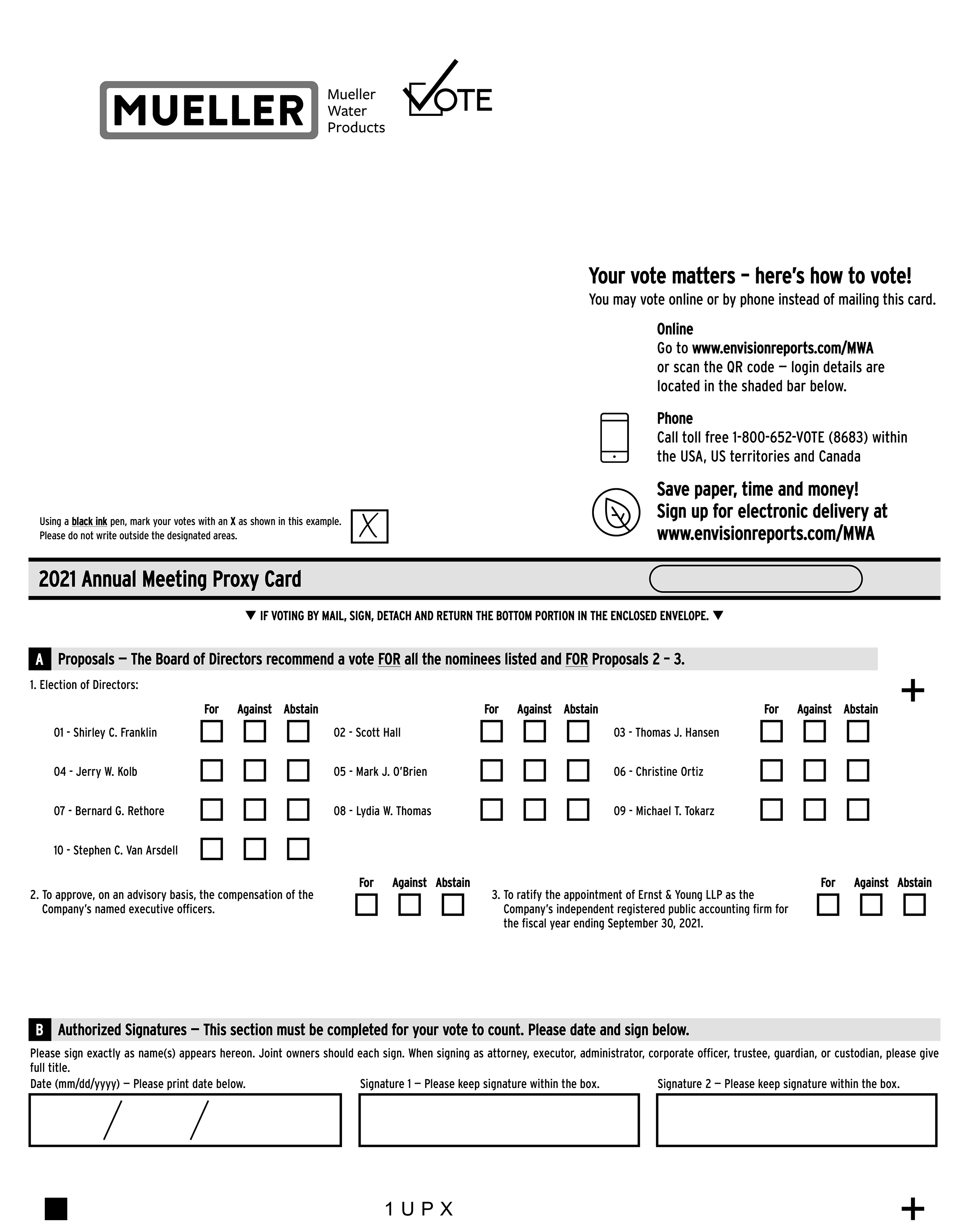
Stockholder proposals submitted under these Bylaw provisions must be received no earlier than August 16, 2018 and no later than September 15, 2018.
Proposals should be addressed to Corporate Secretary, Mueller Water Products, Inc., 1200 Abernathy Road, N.E., Atlanta, Georgia 30328.
Proposals must include the information required by our Bylaws, which are available on our website. If the notice delivered to our Corporate Secretary does not contain all of the information specified in our Bylaws, the proposed business will not be transacted at the annual meeting.
By Order of the Board of Directors.
Keith L. Belknap
Corporate Secretary
Atlanta, Georgia
December 14, 2017
Exhibit A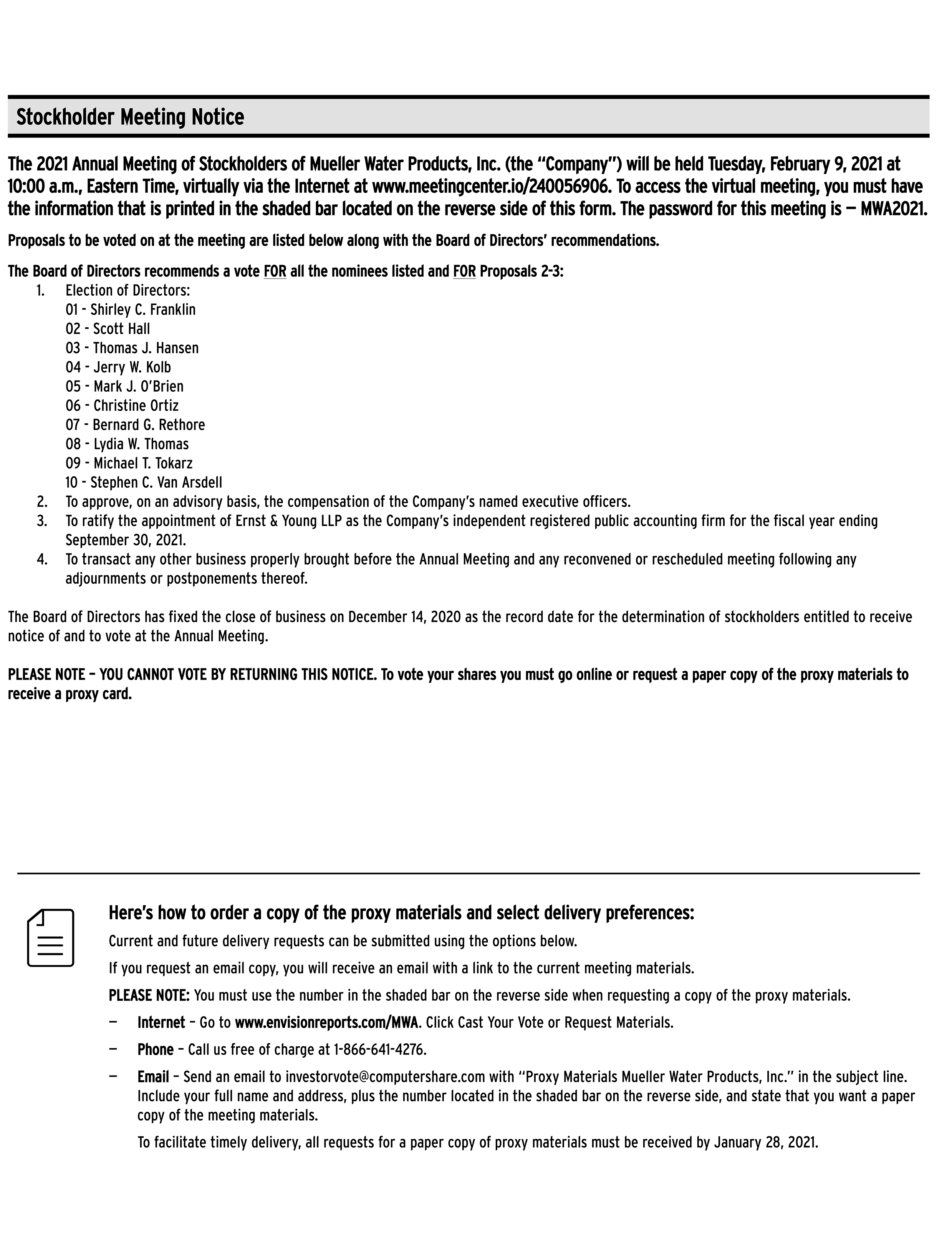
| Reconciliation of Non-GAAP Performance Measures to GAAP Performance Measures |
| | | | | | | | | | | | | | | | | | | |
| 2017 |
| | GAAP | | Reporting Adjustments | | Adjusted Non-GAAP As Reported | | Singer Valve and Other | | Performance Evaluation Basis - Adjusted |
| (in millions) |
| Net sales | $ | 826.0 |
| | $ | — |
| | $ | 826.0 |
| | $ | (10.3 | ) | | $ | 815.7 |
|
| Cost of goods sold | 558.5 |
| | (10.8 | ) | | 547.7 |
| | (5.7 | ) | | 542.0 |
|
| Gross profit | 267.5 |
| | 10.8 |
| | 278.3 |
| | (4.6 | ) | | 273.7 |
|
| Selling, general and administrative expenses | 156.4 |
| | — |
| | 156.4 |
| | (4.0 | ) | | 152.4 |
|
| Other charges | 10.4 |
| | (10.4 | ) | | — |
| | — |
| | — |
|
| Operating income from continuing operations | 100.7 |
| | 21.2 |
| | 121.9 |
| | (0.6 | ) | | 121.3 |
|
| Interest expense, net | 22.2 |
| | — |
| | 22.2 |
| | — |
| | 22.2 |
|
| Income tax expense | 24.2 |
| | 4.3 |
| | 28.5 |
| | 2.1 |
| | 30.6 |
|
| Income from continuing operations | $ | 54.3 |
| | $ | 16.9 |
| | $ | 71.2 |
| | $ | (2.7 | ) | | $ | 68.5 |
|
| | | | | | | | | | |
| | | | | | | | | | |
| 2016 |
| | GAAP | | Reporting Adjustments | | Adjusted Non-GAAP As Reported | | Adjust to Performance Plan Tax Rate | | Performance Evaluation Basis - Adjusted |
| (in millions) |
| Net sales | $ | 800.6 |
| | $ | — |
| | $ | 800.6 |
| | $ | — |
| | $ | 800.6 |
|
| Cost of goods sold | 532.7 |
| | — |
| | 532.7 |
| | — |
| | 532.7 |
|
| Gross profit | 267.9 |
| | — |
| | 267.9 |
| | — |
| | 267.9 |
|
| Selling, general and administrative expenses | 151.2 |
| | — |
| | 151.2 |
| | — |
| | 151.2 |
|
| Pension settlement | 16.6 |
| | (16.6 | ) | | — |
| | — |
| | — |
|
| Other charges | 7.2 |
| | (7.2 | ) | | — |
| | — |
| | — |
|
| Operating income from continuing operations | 92.9 |
| | 23.8 |
| | 116.7 |
| | — |
| | 116.7 |
|
| Interest expense, net | 23.6 |
| | — |
| | 23.6 |
| | — |
| | 23.6 |
|
| Income tax expense | 24.2 |
| | 8.1 |
| | 32.3 |
| | 3.5 |
| | 35.8 |
|
| Income from continuing operations | $ | 45.1 |
| | $ | 15.7 |
| | $ | 60.8 |
| | $ | (3.5 | ) | | $ | 57.3 |
|
